
Catholics for Renewal
Subtitle
News 2019 (to July)
Views expressed are those of the Authors and may or may not always represent those of Catholics For Renewal.
Extract from by Joshua J. McElwee, 29 Jun 29, 2019
Vatican City — Pope Francis reminded the world's Catholic archbishops June 29 that they are called to lives of service and of taking up the burdens of their people, telling them that shepherds "do not live for themselves but for the sheep." In a homily in St. Peter's "Whenever we consider ourselves smarter or better than others, that is the beginning of the end," said the pontiff. "The Lord does not work miracles with those who consider themselves righteous, but with those who know themselves needy," the pope continued. "He is looking for people who are not self-sufficient, but ready to open their hearts to him." "Holiness does not consist in exalting but rather in humbling oneself," Francis said later. "Holiness is not a contest, but a question of entrusting our own poverty each day to the Lord, who does great things for those who are lowly." The pope spoke June 29 during a solemn Mass celebrating the feast of Sts. Peter and Paul, the Catholic liturgical event that recognizes the martyrdom of the two apostles and the foundation of the Roman church....(More)

Extract from Paul Collins, Pearls & Irritations, John Menadue website. 28 June 2019
Please, please, give me a break from Israel Folau! We’ve all heard more than enough about who’s going to hell. He can believe whatever he wants and he can blow his bags ad nauseam to his Pentecostal mates. But we don’t have to take it seriously. He’s a rugby footballer, for goodness sake, not a biblical scholar! His literalist and fundamentalist views are simply wrong; they’re not what the bible says and they don’t represent the views of the vast majority of Christians. I’m happy to confess I’m one of Folau’s targets. I’m an “idolater” happily on the way to hell. Idolaters include Catholics, Anglicans, Orthodox, other Christians and all the unwashed who haven’t been “born-again.” But the main focus of his talk/sermon last week at a Pentecostal gathering in Sydney’s Kenthurst was on the way “homosexuality is in disguise to try and take-over…this world.” He says that “kids…16-years-old-or-younger…are able…to change their gender.” And it’s not only “non-Christians” who are the problem, because “a lot of the churches today allow these things to happen.” Those born-again are the last “true believers in Christ.” The only problem with all this is that the biblical basis for Folau’s claims is extraordinarily tenuous. In fact, the biblical texts touted as condemning homosexuality don’t support later interpretations foisted onto them by people with agendas. In fact, the word “homosexual” doesn’t occur anywhere in the extant Hebrew, Greek, Syriac or Aramaic versions of the bible....(more) Photo: abc.net.au
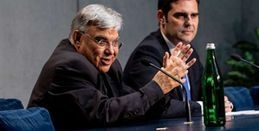
Extract from Cathnews, CNA, 28 June 2019
Pope Francis could receive a final draft of a new constitution for the Roman Curia as soon as September, according to the secretary of the Pope’s Council of Cardinal Advisors. Bishop Marcello Semeraro said yesterday the group was in the final stages of drafting the new constitution, titled Praedicate Evangelium, or “Proclaim the Gospel,” marking the near completion of a key reform project which began with the establishment of the Council of Cardinals in 2013, one month after Francis was elected. Since that time, the group has worked to advise the Pope on Church governance and reform, with the drafting of a new constitution a key priority. The draft text is expected to place renewed emphasis on evangelisation as the structural priority of the Church’s mission, with some predicting the merger of the Vatican’s Congregation for the Evangelisation of Peoples and the Pontifical Council for the Promotion of the New Evangelisation into a single larger department. “We must realise that we are no longer in a world that has a structure of Christianity in which it is enough to pay attention to doctrine. Particular attention must be paid to proclamation. An announcement that brings joy,” Council of Cardinals Secretary Bishop Marcello Semeraro said at a Vatican press conference yesterday. Bishop Semeraro said the text of the constitution must take into consideration “a changing world,” and that the reforming efforts drew inspiration from Evangelii Gaudium, Pope Francis’ apostolic exhortation on the proclamation of the Gospel in today’s world....(more) Photo: CathNews, CNA Daniel Ibanez
Extract from Media Release, Concerned Catholics Canberra, 27 June 2019
Catholic leader Frank Brennan SJ has called for more open dialogue in the Church on issues such as women priests, warning that even with currently suggested governance changes, the Church “remains at a crossroads between life and death”. Speaking to a standing room only audience of 200 in Canberra, on Wednesday night (26 June) Father Brennan discussed eight issues confronting the Church in an address entitled Our Church or Our Museum? --- Contributing to a confident, humble listening and questioning Church. Fr Brennan cited Pope Francis: “A Church always on the defensive, which loses her humility and stops listening to others, which leaves no room for questions, loses her youth and turns into a museum.” He was delivering a farewell to the Capital at a forum of the reform group, Concerned Catholics Canberra Goulburn. His departure after 11 years will mean the closure of the Jesuits’ Xavier House in Canberra. He is concluding his role as CEO of Catholic Social Services Australia to become Rector of Newman College at the University of Melbourne. Father Brennan also quoted the words of Pope Francis in pressing for a more open and questioning Church and the Pope’s statement that “Demands that the legitimate rights of women be respected…that men and women are equal in dignity, present the Church with profound and challenging questions which cannot be lightly evaded”. Father Brennan said the Church would continue to suffer for as long as it did not engage in open discussion and education about women priests. The Vatican’s position in trying to shut down the women priests’ issue was incoherent. “The official position is no longer comprehensible to most people of good will, and not even those at the very top of the hierarchy have a willingness or capacity to explain it.” It was heartening to see that more than 220,000 Australian Catholics had already participated in preparation for the 2020 Plenary Council and that there had been more than 17,000 submissions. He held “broad strong sympathy” for the call for renewed governance in the Church in the wake of the Royal Commission into Institutional Responses to Child Sexual Abuse and also for the need for women to enjoy equality at all levels of leadership in the Church. Throughout his address, Father Brennan turned to the words of Pope Francis for guidance. On the issue of individual conscience, Pope Francis had said this needed to be “better incorporated into the Church’s praxis (practice)....full Media release HERE. Copy of Presentation HERE)
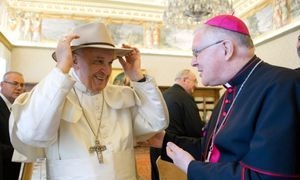
It was 'an extraordinary 2.5-hour conversation..spiritually intense, deeply honest, pastorally astute, free and frank'
Extracts from The Tablet, Catholic News Service 25 June 2019

Extracts from The Age, New York Times, 25 June 25
Sister Joan Chittister, a well-known American nun, feminist and scholar, was looking forward to speaking at a Catholic education conference in Australia next year, figuring there would be plenty to discuss in a country where Catholic schools educate roughly one in five children. But then Chittister, 83, received an email a few weeks ago effectively telling her not to come, saying that the Archbishop of Melbourne, Peter Comensoli, had not endorsed the invitation. No reason was given, she said. But to Chittister and her supporters, the message was clear: The leaders of the church don't like her ideas — especially her call to empower women and laypeople — so they plan to suppress them. "It is pathetic," Chittister said Monday in an interview from Erie, Pennsylvania, where she has lived and worked with the needy for most of her life......The rejection of Chittister is fuel for the fire. "The archbishop has made a serious mistake," said Gail Grossman Freyne, a family therapist, author and friend of Chittister's in Melbourne. "This ban will in no way hinder Sister Joan in pursuing her apostolate. In fact, it will only increase the number of people in Melbourne, in all of Australia, who will come to hear her speak and buy her books. "What kind of threat is this 83-year-old Benedictine who has spent her life preaching the gospel?" The Archdiocese of Melbourne did not respond to requests for comment. Jim Miles, acting executive director of Catholic Education Melbourne — one of the groups organising the National Catholic Education Commission's annual conference, where Chittister had expected to speak in September 2020 — characterised the dispute as a communications failure. He said no one, including Chittister, had yet been formally invited to address the gathering.....(more) Photo: abc.net.au
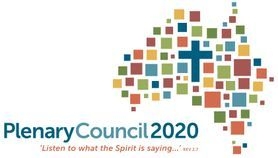
Snapshot report of the Plenary Council “Inclusive, Participatory and Synodal” theme
Plenary Council Team, Sunday 23 June 2019
A link to this second Snapshot report of the Plenary Council theme "Inclusive, Participatory and Synodal" is provided HERE. Included at the end of the Report is a schedule of the release of the other snapshot reports.
Previously published general details HERE on the overall 2020 Plenary 'themes' and on the "Mission and Evangelizing' theme.

American alt-right leader enlists Catholic allies to turn people against the pope
Limited extract from Robert Mickens, Letter from Rome, subscription journal La Croix International, 21 June 2019
Vatican City. Among all the world's political and social leaders, Pope Francis stands increasingly alone as the most powerful force for global peace and stability. Thank God – and the cardinals who elected him in March 2013 – that the Argentine Jesuit is the current Bishop of Rome. In an age when alt-right populists are masquerading as Christians and using religious symbols to scare believers into embracing racism, xenophobia, Islamophobia and ultra-nationalism – all so starkly at odds with the Gospel, by the way – Francis has played an indispensable role in preventing a dangerous spiral into a full-blown clash of civilizations. This is because there are people as crazy as the populists in other currents, as well. Another pope may not have had the courage, fortitude or deep and genuine faith to stand against all this and not allow himself to be co-opted to the Christian sovereigntists' cause.....(source). Photo: La Croix International.

Extracts from Neve Mahoney, Eureka Street, 20 June 2019
In the recently released Vatican publication, 'Male and Female He Created Them: Towards a Path of Dialogue on the Question of Gender Theory in Education', the Catholic Congregation for Education claims to be 'listening'. But I wonder who they are listening to. There isn't one LGBTQI+ voice in the document's 31 pages, which is made clear in how it talks about LGBTQI+ people rather than to us. Nor do any LGBTQI+ Catholic aligned advocates seem to have had a say in this, as many of them have spoken out against the document. Instead, the contents work mostly within the Catholic theological framework in trying to refute gender theory. It doesn't say much that is new, mainly referencing the speeches and interviews of Popes and other Catechism documents. While it is nominally for Catholic educators, it's hard to see how this serves the Catholic teachers who work with a diverse range of students and staff and who would likely already know the Church's position on these issues. I won't go through every point the document makes, but needless to say, I am unconvinced by any argument that disregards the identities of gender diverse people as 'momentary desires' rather than as lived realities deserving of respect. In regards to recommending surgery for intersex people — a stance the Global Rainbow Network of Catholics has spoken out against — the Congregation could take note of how gender theorist Judith Butler discusses the complications of defining the materiality of sex in her speech 'Why Bodies Matter'. She states that when there is a significant number of people who don't fall neatly into what is considered to be one sexed category, continuing to insist on two sexes as a universal experience is essentially 'a form of cruelty'. As I read the Vatican document over and over again to write this article, it's hard not to feel exhausted at how much the institutional Catholic Church will not let queer people exist in their worldview....... The Vatican may not advocate for 'unjust discrimination' against people in the LGBTQ+ community, but neither will it accept us as we are. ....(more). Photo: Eureka Street, Marilyn Nieves Getty.
Extract from CathNews, 21 June 2019
Marist Brothers Australia provincial Br Peter Carroll is the new president of Catholic Religious Australia following his election to the position at CRA's national assembly this week. The 43rd National Assembly of Catholic Religious Australia, which began on Tuesday, had the theme “Communio: Stewarding a life that belongs to the Church and the World”. CRA is one of the few conferences of religious leaders in the world that represents both female and male religious. “I thank my peers for giving me the opportunity to serve them and the Church at this time,” Br Peter said. “There is no doubt in my mind that the voice of the Gospel is an absolute imperative in our society today. CRA’s role is to help amplify that voice within our Church and broader community.” New members were also elected to the council and will address issues of importance to religious, the Church and society through the lens of the Gospel message. Council members come from across Australia, from small and large congregations. The vice president will be elected at the first council meeting and will be a female religious leader as statutes require that the roles of president and vice president represent each gender. Outgoing president Sr Monica Cavanagh RSJ said: “Serving as president for the past year has been both gift and challenge. I know the council will continue the important work of being a prophetic voice at this moment in history. I wish Br Peter and the new Council every blessing.”....(more)
Extract from CathNews, The Australian, 21 June 2019
Australian Catholic University has endorsed a proposed freedom of speech code, saying it “fundamentally supported freedom of expression and academic inquiry”. The ACU is the third university to explicitly back former chief justice Robert French’s model code for freedom of speech since federal Education Minister Dan Tehan called on universities last weekend to adopt it. ACU vice-chancellor Greg Craven said yesterday his university’s general counsel would produce a draft code for consideration by its senate, ACU’s governing body, which would be modelled closely on the French code. “The code will serve as a touchstone document that provides members of the university community with certainty and clarity around freedom of speech,” Professor Craven said. “Of course, freedom of speech is never limitless. This is precisely the role of a well-drafted principles based code – to guarantee free expression, regardless of whether it is popular, while also setting out the necessary framework for it to thrive.”....(more)

Extract from Liz Dodd, The Tablet, 20 June 2019
The Church chose to protect its own reputation instead of saving children from sex abuse by priests, and is still falling short in its child safeguarding, a long-running investigation into child sex abuse in the Archdiocese of Birmingham has concluded. The report by the Independent Inquiry into Child Sexual Abuse [IICSA], which was released today, detailed the “shocking scale” of abuse in the Archdiocese and concluded that “children could have been saved from abuse if the Church has not been so determined to protect its own reputation above all else”. Cardinal Vincent Nichols, who was Archbishop of Birmingham between 2000 and 2009, was singled out for criticism. IICSA found that “he focused too much on the reputation of the church during his tenure, rather than the welfare of children and the impacts of child sexual abuse on victims and survivors.”....(more)

A badly governed Church needs a new model
Catholicism continues to wrestle with the unrealized vision of the Second Vatican Council
Limited extract from Paul Collins, subscription Journal La Croix International, 19 June 2019
It is an understatement to say that Catholicism is in deep trouble. The
sexual abuse tragedy and the secrecy and denial surrounding are obvious
symptoms. A key element in the broader Church crisis is
governance. Contemporary
Catholicism operates out of a monarchical model that may have worked in
the seventeenth century, but today is totally inappropriate and toxic.
More importantly, contemporary Church government has little to do with
Jesus or the New Testament. First,
some history. Governance is an issue that should have been tackled
much more decisively immediately after the Second Vatican Council, in
the period between 1965 and 1980. While
the Council sketched out a remarkable New Testament vision of the
Church in the first two chapters of the document Lumen gentium (LG), we
failed to follow-up and fully incorporate that vision in the Church's
pastoral practice, governance, ecclesiastical structures and revised
1983 Code of Canon Law. Closely
linked to this is the abandonment of Paul VI's proposal to develop a
Lex Ecclesiae Fundamentalis, a Fundamental Law of the Church. The....(Source). Photo: La Croix International, EPA ANGELO CARCONI MaxPPP
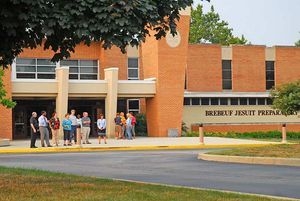
Extract from Michael J. O’Loughlin, America, The Jesuit Magazine, 20 June 2019
An Indianapolis Jesuit high school is standing by a teacher who the Archdiocese of Indianapolis said should not be rehired after the employee’s same-sex marriage became public. As a result, the archdiocese will prohibit Brebeuf Jesuit Preparatory School from calling itself “Catholic,” a decision the school plans to appeal. According to a statement from Brian Paulson, S.J., provincial of the USA Midwest Province Jesuits, school leaders learned in the summer of 2017 that a teacher at Brebeuf Jesuit Preparatory School had entered a civil marriage with someone of the same gender. The marriage became known via social media, according to Father Paulson, who said the archdiocese then orally requested that the school not renew the teacher’s contract. The school decided not to honor that request, as the “teacher in question does not teach religion and is a longtime valued employee of the school.” Father Paulson said that the school disagreed with the archdiocese and that it decided not to honor the archdiocese’s request to protect school staff and because the school considered it interference in employment matters by the archdiocese. “I recognize this request by Archbishop Charles Thompson to be his prudential judgment of the application of canon law recognizing his responsibility for oversight of faith and morals as well as Catholic education in his archdiocese,” he said. But, he continued, “I disagree with the necessity and prudence of this decision. This is a disagreement between two church leaders of goodwill with related, but distinct responsibilities.”.....(More). Photo: America, The Jesuit Review, KimManleyOrt Creative Commons
U.K. Church 'sealed the fate' of abuse victims by seeking to protect its reputation first, report finds
Extract from Liz Dodd, The Tablet, 20 June 2019
The
Church chose to protect its own reputation instead of saving children
from sex abuse by priests, and is still falling short in its child
safeguarding, a long-running investigation into child sex abuse in the
Archdiocese of Birmingham has concluded. The
report by the Independent Inquiry into Child Sexual Abuse [IICSA],
which was released today, detailed the “shocking scale” of abuse in the
Archdiocese and concluded that “children could have been saved from
abuse if the Church has not been so determined to protect its own
reputation above all else”. Cardinal
Vincent Nichols, who was Archbishop of Birmingham between 2000 and
2009, was singled out for criticism. IICSA found that “he focused too
much on the reputation of the church during his tenure, rather than the
welfare of children and the impacts of child sexual abuse on victims and
survivors.”....(more)

Extract fom John L. Allen Jr.Editor, Crux, 18 June 2019
Every so often, we get official confirmation of the obvious, and, surprisingly enough, it still makes waves. Such is the case again this week with the release of a preparatory document for an October summit of bishops on the Amazon, which confirms that the ordination of married “elderly people,” meaning men, will be on the agenda. From the moment the Synod of Bishops on the Amazon was announced, it’s been clear that the issue of the viri probati, meaning tested married men who are pillars of their communities, would come up. Requests for consideration of the possibility have been voiced with increasing urgency by bishops and other Catholic personnel from the region for decades, and it was basically unthinkable a whole synod would go by without it being floated again. Crux spoke to a Brazilian theologian in February who said then that the viri probati would be discussed when the bishops meet. Nonetheless, given all the lengths to which Rome has gone over the years to squash consideration of married priests, seeing the topic on an official Vatican agenda is still a bit arresting. To understand the nature of the discussion we’re likely to see in October, here are three essential things to understand. First, the debate is not over whether the Catholic Church can have married priests. It already does, and plenty of them. The 23 Eastern churches in communion with Rome have married priests, and in the United States, there are hundreds of former Episcopalians, Methodists, Lutherans and others who were married in their original denominations and permitted to remain married as Catholic priests. The question, therefore, is not whether to have married priests, but whether to have more of them. As a corollary, no one is talking about eliminating celibacy for the vast majority of priests in the Latin Rite. Second, this discussion will be very different from debate over married priests in the U.S. or Western Europe, because it’s basically not ideological.....(More). Photo: Crux, Paul Haring CNS
Extract from Brian Hoban, Catholic Association of priests, Ireland. First published 10 June. Extracted here 17 June 2019
The heading on the cover of the latest edition of The Tablet, one of the most respected Catholic magazines in the English-speaking world, makes a clear point. It surfaces a question that has been bubbling under the surface of Catholic life since Pope Benedict resigned six years ago and was succeeded by Pope Francis. The question is: ‘Have we one Pope too many?’ That question, unasked in that blunt form up to now, surfaces a difficult issue – Benedict is being used to undermine Francis. Those unhappy with the reforms underway under Francis are effectively campaigning to diminish Francis’ influence and to block his way. And they’re using their friendship with Benedict and their influence on him to create obstacles that will undermine what Francis is doing and obstructing the momentum for reform that his papacy has generated. When bishops retire there’s an unspoken protocol that clicks in. They keep quiet. They don’t interfere. They don’t keep looking over the shoulders of their successors. They never give any indication that they are in any way tut-tutting in the background. The same is true of former parish priests. Ideally they move out of the parish, cut any contacts they have with it, never comment on their successors, never ever proffer unsolicited advice and just let their successors get on with it. It doesn’t always work, of course. As someone said one time: ‘Some are gone and not forgotten; others are forgotten but not quite gone’.....(More)

Snapshot report of the Plenary Council "Missionary and Evangelizing" theme
Plenary Council Team, Thursday 19 June 2019
A link to the Snapshot report
of the Plenary Council theme of Missionary and Evangelizing is provided HERE.
Further details HERE on the 2020 Plenary 'themes'
_______________________________________________________________________________________________________________
Extract from Briaan Hoban, Catholic Association of priests, Ireland. First published 10 June. Extracted here 17 June 2019
The heading on the cover of the latest edition of The Tablet, one of the most respected Catholic magazines in the English-speaking world, makes a clear point. It surfaces a question that has been bubbling under the surface of Catholic life since Pope Benedict resigned six years ago and was succeeded by Pope Francis. The question is: ‘Have we one Pope too many?’ That question, unasked in that blunt form up to now, surfaces a difficult issue – Benedict is being used to undermine Francis. Those unhappy with the reforms underway under Francis are effectively campaigning to diminish Francis’ influence and to block his way. And they’re using their friendship with Benedict and their influence on him to create obstacles that will undermine what Francis is doing and obstructing the momentum for reform that his papacy has generated. When bishops retire there’s an unspoken protocol that clicks in. They keep quiet. They don’t interfere. They don’t keep looking over the shoulders of their successors. They never give any indication that they are in any way tut-tutting in the background. The same is true of former parish priests. Ideally they move out of the parish, cut any contacts they have with it, never comment on their successors, never ever proffer unsolicited advice and just let their successors get on with it. It doesn’t always work, of course. As someone said one time: ‘Some are gone and not forgotten; others are forgotten but not quite gone’.....(More)

The call for dialogue cannot disguise the text's uncompromising ideological views
Limited Extract from Robert Mickens, Letter from Rome, Subscription Journal La Croix International, 14 June 2019
Vatican City. Catholic bishops, including those in Vatican offices, are not exactly the most credible authorities on issues pertaining to sexuality these days. Few people would disagree with this, except – maybe – bishops themselves. And, of course, those who are trying hard to be named bishops. The lack of credibility on sexual morality is not just because of the hierarchs' disastrous mishandling of the still-unfolding clergy sex abuse pandemic. Neither is it the fact that the bishops are unmarried men, who have promised to renounce sexual intimacy and any genital expression of it. But genitalia are exactly the focus (or mis-focus) of the latest document from the almost exclusively cleric-led Congregation for Catholic Education. It's called, "Male and Female He Created Them: Towards a path of dialogue on the question of gender theory in education." It was released out of the blue on June 10 with no advanced notice or warning. The congregation's stated intention by issuing this 31-page text is to help "guide Catholic contributions to the ongoing debate about human sexuality, and to address the challenges that emerge from gender ideology." Who's the guy that wrote this document? It's not clear who actually wrote this. But it probably was not Cardinal Giuseppe Versaldi, the congregation's 75-year-old Italian prefect, or the other....(source). Photo: La Croix International
Extract from CathNews, Crux, 14 June 2019
Pope Francis told around 100 apostolic nuncios that it is “irreconcilable” to have the job and criticise the Pope “behind his back”. The comment came days after Italian Archbishop Carlo Maria Viganò, the former papal representative to the US, renewed his criticism of the Pope. Archbishop Viganò made headlines last August when he released an open letter calling on Francis to resign for allegedly disregarding restrictions placed on ex-cardinal and now ex-priest Theodore McCarrick....(more)
Extract from Carol Zimmermann, Cruxnow, Catholic News Service, 13 June 2019
BALTIMORE - Although the U.S. bishops’ spring assembly in Baltimore was mostly devoted to responding to the sexual abuse crisis in the church, the bishops also considered something described as the second-most important issue currently facing U.S. church leaders: How to get religiously unaffiliated, or “nones,” particularly young people, back to the Catholic Church. This is a top priority for our church, said Auxiliary Bishop Robert E. Barron of Los Angeles, chairman of the bishops’ Committee on Evangelization and Catechesis, who is known for his website, “Word on Fire,” and for hosting the documentary series “Catholicism.” In a June 11 presentation, the bishop said a group of experts who’ve examined why young people are leaving the faith in increasing numbers recently spoke with his committee about this and will share their findings during a lunch presentation at the bishops’ fall assembly in Baltimore. “How many are leaving? The short answer is: a lot,” the bishop said, noting the sobering statistic he said many in the room probably were aware of - that 50 percent of Catholics 30 years old and younger have left the church. “Half the kids that we baptized and confirmed in the last 30 years are now ex-Catholics or unaffiliated,” he said, and “one out of six millennials in the U.S. is now a former Catholic....(more)
Extract from CathNews, The eRecord, 13 June 2019
The National Association of Deacons’ biennial national conference is heading to Perth this October. The 2019 Conference, with the theme “I and the Father are One,” (John 17:21), will take place from October 3–6 at the University of Notre Dame Australia’s Fremantle campus. All permanent deacons, candidates and aspirants from Australia and New Zealand, of any Catholic rite, and their wives, are invited to attend. Others who attend include those responsible for deacon formation and other interested clergy from across Australia. Perth Archdiocese Deacon Mark Powell, chair of the national organising committee, said the conference aimed to help deacons, and those involved with diaconate formation, come together in faith. “We are hoping that the conference will create a stronger pastoral awareness nationally about how we can better realise a stronger role for deacons among the wider Catholic community,” Deacon Powell said. “We are living in a changing world, globally and internally, and we are seeing many opportunities where the role of a deacon can provide support, perhaps where there has not been before, but there is clearly a need within that parish, agency or school,” he said....(more)

Two new churches are planned for Christchurch, but some parishioners are heartbroken at the prospect of losing what they already have
Limited extract from Staff, subscription journal La Croix International 12 June
New Zealand. Catholic Bishop Paul Martin is leading a major property shake up in New Zealand's Christchurch Diocese that could raise NZ$26 million (US$17.1 million) is sale proceeds. Bishop Martin has proposed the merging of 12 parishes to form five new "super parishes" by 2023 ....(source). Photo: Cathedral of the Blessed Sacrament Christchurch La Croix International GFDL Creative Commons

Extract from The Tablet, Catholic News Service, 11 June 2019
In a statement the institute said it continued to provide financial services to the Catholic Church present in the whole world and Vatican City State. The Institute for the Works of Religion, often referred to as the Vatican bank, made a profit of 17.5 million euros in 2018, just over half the profit reported in the previous year, according to its annual report. The bank, which had made a profit of 31.9 million euros in 2017, said the decrease was due "to the strong turbulence of the markets throughout the year and the persistence of interest rates which are still very low." The institute held assets worth 5 billion euros at year's end, which included deposits and investments from close to 15,000 clients -- mostly Catholic religious orders around the world, Vatican offices and employees, and Catholic clergy. In a statement released by the Vatican June 11, the institute said it continued to provide financial services to the Catholic Church present in the whole world and Vatican City State. According to the report, the bank's assets are worth 637 million euros, placing its tier 1 capital ratio -- which measures the bank's financial strength -- at 86.4 percent compared to 68.3 percent in 2017. The increased ratio, the bank said, "is a testament of its elevated solvency and its low-risk profile."...(more) Photo: Swiss Guards, The Tablet Tony Gentile Reuters 2014 Swiss Guards march near Institute for Works of Religion

Extract from Claire Giangravè, Faith and Culture Correspondent, Cruxnow, 7 Jun 2019
Often portrayed as the headquarters for the anti-Pope Francis resistance in the United States, the Napa institute is preparing for its July 24-28 conference of conservative businessmen, bishops and public officials on the theme “This Catholic Moment.” Crux reached out to John Meyer, the Executive Director of the institute to learn more about the themes, topics, and political leanings at the conference. He said that the event will be an opportunity to discuss “Catholic renewal in a time of great crisis in the Church.” Among the speakers is Cardinal Raymond Burke, often pitted against Pope Francis in the popular imagination since the prelate and four others sent questions, or “dubia,” to the pontiff regarding the cautious opening to communion for divorced and remarried couples in the apostolic exhortation Amoris Laetitia. Conservative Catholic figures, such as George Weigel, Jim Daly and Father Robert Spitzer make up the rest of the lineup. Meyer spoke of a “crisis of accountability in the Church,” especially after the sexual abuse scandals involving former Cardinal Theodore McCarrick. To respond to this crisis, the Institute plans on putting a special emphasis on the role of laity in the Church. To those who would set the conference and its organizers against Francis and his pontificate, Meyers said “it’s absolutely false” and that he welcomes the opportunity to dialogue with progressive and liberal Catholics instead of being stuck “in echo-chambers.” “It’s wrong and it’s really the work of the Devil that we are divided over these issues, instead of working together for the common good,” he said. “We choose to bicker about small things, rather than fight together for the big ones.”....(MORE). Photo: Crux Now Napa Institute via Facebook 20190607 Crux
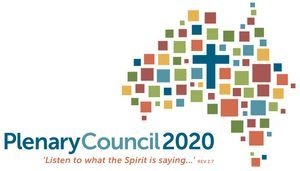
Announcement of national themes for discernment opens next phase for Plenary Council
Extract from Melbourne Catholic, Sunday 9 June 2019
The
Plenary Council 2020 moves into its next phase of preparation today
with the announcement of the National Themes for Discernment that
emerged from a historic process of listening to the voices of more than
222,000 people. Between May 2018
and March 2019, almost 17,500 submissions, from individuals and groups
of all sizes, addressed the Plenary Council’s central question: “What do
you think God is asking of us in Australia at this time?” Over
several days of listening to what the people of God said, with intense
moments of prayer and discernment, the Bishops Commission for the
Plenary Council and its Executive Committee, joined by the Facilitation
Team, considered what people were longing for. Six National Themes for
Discernment emerged. “The National
Centre for Pastoral Research was able to pinpoint more than 100
recurring subject areas from those 17,500 submissions,” said Archbishop
Timothy Costelloe SDB, president of the Plenary Council. “In
some ways, those subject areas described what one might call ‘the messy
reality’ of Catholic life in Australia today. The voices of the
faithful help all of us to understand something of the historical
experience and the current reality of the Catholic Church in
Australia. "We worked to
discern what people were yearning for as we move into this next stage of
preparing for the Plenary Council.” Archbishop Costelloe said
there was a clear desire expressed for the Church to renew herself and
focus on the person of Jesus Christ. “Accordingly, the six
National Themes for Discernment flow from that primary goal of being a
Christ-centred community of people,” he explained. The
six National Themes for Discernment invite people to reflect, to pray
and to consider how God is calling the People of God to be a
Christ-centred Church in Australia that is:
Missionary and Evangelising
Inclusive, Participatory and Synodal
Prayerful and Eucharistic
Humble, Healing and Merciful
A Joyful, Hope-Filled and Servant Community
Open to conversion, Renewal and Reform
Plenary
Council facilitator Lana Turvey-Collins said many topics relate to one
or more of the National Themes for Discernment and this next stage of
preparation – “Listening and Discernment” – is a time of prayerful
consideration of the “big” questions that have been raised by the
faithful. The emergence of the National Themes for Discernment is
an important moment in our journey towards the Plenary Council.....(MORE)
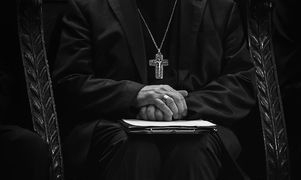
Bishops need to help priests right Church's wrongs and end culture of secrecy, says chair of the Association of U.S. Catholic Priests
Limited extract from Staff, subscription journal; La Croix International, 6 June 2019
The Catholic Church in the United States needs to focus on three priorities: drawing the curtain on its culture of secrecy, ending clericalism, and giving women more roles in Church affairs, the chair of the Association of U.S. Catholic Priests (AUSCP) wrote in a letter to bishops dated June 4......(Source) Photo: Global Pulse print Clericalism La Croix International 20190606
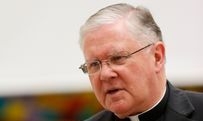
Archbishop Mark Coleridge understands the complex moment for the Church in Australia as he prepares to lead more than 40 bishops on an Ad Limina visit to meet Pope Francis.
Extract from Mark Bowling, Catholic Leader, 6 June 2019
Brisbane. “I think we are a Church that is suffering, is anxious about the future, dismayed by the past – and all of this will be said to the Pope,” Archbishop Coleridge, president of the Australian Catholic Bishops Conference said ahead of his departure for Rome. “Pope Francis has two gifts I find, that are related. One is to speak the truth in ways that can be very challenging … but in the end he has a gift of encouragement as well.” The “Ad Limina Apostolorum” visit – from June 23-29 – translated as “to the threshold of the Apostles”, is a canonical requirement of bishops conferences from around the world – a visit to Rome typically made every five years, and culminating in prayer and Mass at the tombs of Sts Peter and Paul. However, with the change of pope in 2013 and Ad Limina visits cancelled during the Year of Mercy, the ACBC has not made the visit since 2011. During their dialogue with Pope Francis, the bishops will provide information and insights from their own dioceses and listen to the Pope’s reflections on the Church more broadly. “It will be vastly different,” Archbishop Coleridge said, reflecting on his two previous visits – the first to meet an ailing Pope John Paul II in 2004, and then an audience with Pope Benedict XVI in 2011. “We’ve had a royal commission between then and now, and we’ve also had the conviction of Archbishop Wilson and Cardinal Pell, which puts us in new territory,” Archbishop Coleridge said. “We’ve also begun the journey of the plenary council – so we’re caught between the agony of the royal commission and all it represents, and the hopes of the plenary council. “I think from our Ad Limina visit we will have a deeper sense of what is the truth of our situation, we will be more strongly encouraged … we’ll be more energised for mission, more realistic and hopeful. And we will have a stronger sense of the bond of unity between the bishops.” Archbishop Coleridge last visited the Vatican in February, as Pope Francis hosted a summit about combating the scourge of clergy abusing children. At a closing Mass in front of the Pope and Church leaders from every country, Archbishop Coleridge delivered the homily. He dismisses talk this was a signal that he could soon be elevated to cardinal, especially since Oceania is already highly represented with cardinals in New Zealand, Papua New Guinea and Tonga....(more)

Extract from Inés San Martín, Rome Bureau Chief, Crux, 5 June 2019
ROME - German Cardinal Walter Kasper, considered a close theological adviser to Pope Francis, said that if during an upcoming meeting of bishops on the Amazon region the prelates asked for the ordination of married men, the Argentine pontiff would grant the request. He also said that the ordination of women, even to the diaconate, is out of the question, as it would undermine a “millennia old tradition,” noting, however, that the Catholic Church would “collapse” without women. “If the bishops agreed through mutual consent to ordained married men - those called viri probati - it’s my judgement that the pope would accept it,” said Kasper, former president of the Vatican’s Council for the Promotion of Christian unity. “Celibacy isn’t a dogma, it’s not an unalterable practice.” "Personally, I’m very much in favor of maintaining celibacy as an obligatory way of life with a commitment to the cause of Jesus Christ, but this doesn’t exclude that a married man can carry a priestly service in special situations,” Kasper said. The question of ordaining married men could be discussed during the Synod of Bishops on the Amazon, that will take place this October in Rome. Francis addressed the issue of possibly ordaining married men at length in January, during the in-flight press conference on the way back to Rome from Panama. “I would rather give my life than to change the law on celibacy,” Francis said, quoting St. Paul VI, who as the Argentine pontiff noted, was speaking “when times were tougher than now, in 1968-1970.” “I’m not in agreement with allowing optional celibacy. No,” he said. Francis did add, however, that he believes theologians should study the possibility of “older married men” being ordained, in “far, faraway places,” such as the islands in the Pacific, but even then, ordained only to celebrate Mass, hear confessions and anoint the sick.....(MORE) Photo. Kasper Card 5 Crux 20190605 Paul Haring CNS
Extract from Opinion, Richard Gaillardetz, National Catholic Reporter, 5 June 2019
Vatican. Pope Francis' long-awaited apostolic constitution on the reform of the Curia has finally appeared. Those looking for radical structural reform may be disappointed. However, the document contributes much toward a fundamentally different conception of the role and function of the Curia within the life of the church. The Roman Curia in its modern form, dating back to the 16th century, has remained remarkably resistant to substantive reform, in spite of efforts undertaken by both Pope St. Paul VI and Pope St. John Paul II. Some of that resistance to reform may have been a consequence of the failure to consider the Curia within an ecclesiological framework sufficiently informed by the teaching of the Second Vatican Council (1962-65). This document is far more successful in offering an alternative framework than it is in providing a comprehensive program of specific reforms consonant with that new framework. Fundamental reimagination of Curia's role. The strength of this constitution lies less in specific institutional reforms than in the decisive rhetorical shift and consequent ecclesiological reimagination of the Curia's place in the life of the church. Explore Pope Francis' environmental encyclical with our complimentary readers' guide. In the prologue of the constitution, we already encounter what will be the overarching theme of the document, its reconception of the work of the Curia as an exercise not in domination and control but in Christian service inspired by Jesus' ministry of foot-washing....(more)
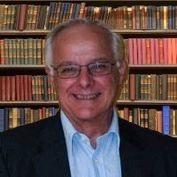
Extract from Peter Johnstone, Pearls & Irrutations, John Menadue Blog, 5 June 2019
Just one worrying aspect of current talk that religious freedom needs to be legislated is that the need is rarely explained. There is vague reporting of the ‘right’ of religious schools to teach faith-based doctrine. This begs the question as to what these schools want to teach that they think is at risk. It seems that this is code for teachings that devalue people of LGBTIQ sexual orientation. Our newly elected federal government has reportedly decided to prioritise religious freedom legislation to protect religious institutions from being accused of discrimination. And it seems that the Labor Party may well support this legislation, at least one front-bencher strangely perceiving some religious rejection in their electoral defeat. The matter has been the subject of some recent public discussion in the context of a top Rugby player being sacked for publicly stating that homosexuals will go to hell. Such statements are clearly intended to vilify a vulnerable group in our community and cannot be tolerated from a moral perspective, quite apart from the contractual issues involved or the genuinely held view of the person concerned, albeit both naïve and dangerous. Would we accept as a community any public figure saying all females should go to hell, or that all of a certain race should be damned, or that redheads should be shunned? Some religions may well teach such ignorant views, but a good society should not tolerate the public and cavalier condemnation of classes of people (based on their God-given characteristics!) and certainly should not give legislative protection to the public expression of those views. There is no moral or other justification for protecting vilification of any gender, or any sexual orientation – and religious beliefs certainly do not justify such protection. Religions have traditionally claimed a role in ensuring that the best values are practised by communities and teaching that all be treated with respect and indeed love. Is discrimination now part of religious beliefs or doctrine and are religions now to be legally protected in practising discrimination against others? Governments’ obligations to protect their citizens cannot be waived to allow harm to be done by religions. I am puzzled by any suggestion that people of faith need religious freedom legislation. As a Christian adult with many years as an Australian Catholic citizen, parent and grandparent, I have never felt a lack of religious freedom and on those few occasions that my faith has been questioned by others, I’ve been quite happy to share the reasons for my faith without feeling any oppression.....(MORE)
'The nostalgia of the 'integralists' is to return to the ashes,' but that is not Catholic tradition, Francis said
Limited extract from staff, subscription journal La Croix International staff, Catholic News Service, 3 June 2019
Pope Francis has criticized Catholic traditionalists for wanting to "return to the ashes" of the past, rather than use the deep roots of the Church's tradition in order to grow, flourish and move forward. "The tradition of the church is always in motion," he told reporters June 2 on his return flight from Romania. The pope spoke to them for 35 minutes, answering five questions. "The nostalgia of the 'integralists' is to return to the ashes," but that is not Catholic tradition; tradition is "the roots that guarantee the tree grows, blossoms and bears fruit," he said. When asked about his relationship with this predecessor, the pope said his conversations with Benedict XVI make him stronger and he compared the knowledge he receives from the former pope as the sap "from the roots that help me to go forward." "When I hear him speak, I become strong," Francis explained. "I feel this tradition of the church. The tradition of the church is not a museum. No, tradition is like the roots that give you the sap in order to grow. You won't become the root; you will grow and bear fruit and the seed will be root for others." Recalling a quote by Austrian composer Gustav Mahler, the pope said that tradition "is the guarantee of the future and not the custodian of ashes....(more).

The high court has often backed trial juries in child abuse cases, and looms over the verdict of the Melbourne judges
Extract from David Marr, The Guardian, 1 June 2019
George Pell stands a good chance of winning his appeal next week. Not that that would be the end of the matter. Lately the Victorian court of appeal has overturned a number of jury verdicts in child abuse cases, only to see those verdicts restored by the high court. Child abuse cases are hard. The rules of evidence are complex. Witnesses are few. These assaults are inherently outlandish. Victims are frequently damaged. Often at stake is the ruin of old men who have never before been accused of crimes. A gap has opened up between the Canberra and Melbourne courts in the past few years in child abuse cases. The language of the high court has been polite but its rebukes have been emphatic. Again and again it has backed trial judges and juries. Offenders set free on appeal in Melbourne find themselves behind bars once again. The Victorian public prosecutor is feeding the appeals to the high court and winning. The court is making no secret of what it’s about here: not just to quietly bring the Melbourne court back into line, but to set rules for the whole country on complex issues that are, as they said in a case last year, “as straightforward as possible consistent with the need to ensure that the accused receives a fair trial”. Critics of the Melbourne judges say that for all their intellectual firepower, they lack experience at the grubby end of the law: the conduct of criminal trials. The complaint has been that the court of appeal sets the bar too high for trial judges and prosecutors......(more) Photo: The Guardian ndy Brownbill/AP

Data analysis, prayer and reflection have helped the Plenary Council 2020 process distil the voices of more than 222,000 people across the country into a number of “National Themes for Discernment”.
Extracts from CathNews, ACBC Media Blog, 31 May 2019
More than 75 people met last week to listen to and understand the qualitative and quantitative analysis of the submissions received during the 10-month Listening and Dialogue phase of the Plenary Council. The National Centre for Pastoral Research, using best-practice analysis skills and software, read the almost 17,500 group and individual submissions and over three days provided their insights for those attending the meeting. “Our job was to review and report on how people responded to the question ‘What do you think God is asking of us in Australia at this time?’,” explained National Centre for Pastoral Research director Trudy Dantis. Among those in attendance during the presentation of the data were members of the Bishops Commission for the Plenary Council, the Plenary Council Executive Committee and the Plenary Council Facilitation Team. Archbishop Timothy Costelloe SDB, president of the Plenary Council, said it was a significant responsibility to listen to the stories from the hearts and minds of ordinary Catholics across a huge variety of contexts – sometimes in harmony with one another, at other times divergent. “This was done by listening to the information Dr Dantis and her colleagues presented, then taking time for reflection on those subject areas in prayer,” Archbishop Costelloe said......Members of the Plenary Council Local Coordinators Network, representing dioceses and archdioceses, met over the subsequent two days to discuss how the National Themes for Discernment could be communicated and considered by people in their local faith communities. The themes and other analysis from the Listening and Dialogue phase of the Council will be released throughout June, beginning at Pentecost....(More). Photo: CathNews, ACBC

Australian Catholics can now look to much greater transparency and accountability from parishes and dioceses if reforms are implemented
Limited extract from John Warhurst, subscription Journal La Croix International, 28 May 2019
The Church governance review now underway in Australia has attracted considerable national and international interest as a forward step in Church reform. This opportunity should not be over-sold as taking control of Church reform, because of the considerable constraints under which the review team is working, but the balance of skills and experience in this group means that Australian Catholics can look forward to a challenging, creative yet practical report drawing on mapping, consultation and research both within Australia and more broadly. What a delight and an education it is for me to work with my six fellow Governance Review Project Team (GRPT) members on such an important topic for the future of the Church as parish and diocesan governance and management. My hope is that this review, while it has been conducted out of the limelight so far, will now engage many more Church members. That is already happening; since it was made public I have already been contacted with stories from the parish level about frustrating failures of Church governance, which put flesh on the general principles of the need for better governance at all levels, including greater accountability, transparency and inclusiveness. My colleagues and I would welcome many more, both from diocesan and parish perspectives. Many senior Church leaders already deeply sense the organizational crisis. One former Vicar-General with vast experience commented to me t.....(source) Photo: La Croix International
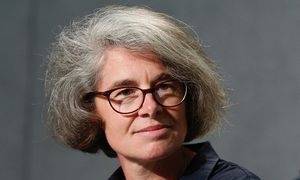
Extract from Christopher Lamb, The Tablet, 24 May 2019
Pope Francis has appointed the first women consultors to the secretariat of the Synod of Bishops, which under his pontificate has become a crucial vehicle for setting the Church's pastoral agenda. Four women – three religious sisters – will be tasked with offering advice and strategic direction to the body which organises the synod of bishops gatherings. The new consulters to the synod's General Secretariat include: Sister Nathalie Becquart, the former director of youth evangelisation and vocations for the French bishops conference, Sr Alessandra Smerilli, an economics lecturer at the Pontifical Faculty of Educational Sciences “Auxilium,” Sr Maria Luisa Berzosa, the director of educational institute of the Spanish branch of “Fe y Alegría” and Professor Cecilia Costa, a sociology lecturer at Roma Tre University. The synod office confirmed that they are the first female appointees to the secretariat's all-male board of priests and a bishop. Two priests, Fr Giacomo Costa and Fr Rossano Sala, were also named to the synod body as consulters on 24 May. The priests had served as special secretaries to last October’s youth synod while the four women had also attended that gathering. One of the new consulters, Sr Nathalie, told The Tablet that the appointments reflected the Pope’s desire for greater female representation at senior levels in the Church. “He is asking for more women in leadership positions,” she said. “I think Pope Francis, and many people [in Rome] are aware that things have to change.” She said that the importance of a voice for women in the Church came through powerfully during the last synod assembly and that changes were already underway with Synod for the Pan-Amazon region, 6 to 27 October. Women, religious and lay people, Sr Natalie, were already involved in the preparatory committees for the gathering, and the role of women is in the preparatory document. The synod of bishops has come under pressure to allow to vote during its proceedings, although was not sure if this would change for the next gathering. As the rules stand, women can only attend the assemblies as advisers or observers. The Xaverian sister explained that implementing “synodality” – a collective approach to mission and decision making – was essential for the Church’s future. “My main expectation [for the new role] is to help promote a synodal church,” she said. “Synodality is key today for the reform of the Church, and we know it is key to Pope Francis.” Sr Natalie added: “The great challenge is to implement synodality at every level of the Church’s life.” .........(more) Photo: The Tablet, CNS Paul Haring

Extract from Marilyn Hatton, Pearls & Irritations, John Menadue website, 24 May 2019
Australia could lead the way on reform of Church governance. The scrutiny of the Royal Commission and work arising from the 2020 Plenary Council has equipped the Australian Catholic Church like no other in the world at this time. At a time when Australia has witnessed dishonest and shamefully toxic election tactics, the Catholic Church is undergoing a review of governance at the behest of the National Royal Commission into Institutional Sexual Abuse of Children. Archbishop Mark Coleridge, President of the Australian Catholic Bishops Conference (ACBC) said that “the review of (Catholic Church Governance) will examine how church structures, some of which were devised centuries ago, can be improved”. Many theologians, bishops and priests echo Archbishop Coleridge’s comment. Reform groups and Catholics across the country welcome the appointment of the panel of respected experts by the ACBC and Catholic Religious Australia (CRA). It is heartening to hear the Archbishop’s acknowledgement and his recognition of out dated structures. The laity, and women in particular, are anxious that the panel are thorough in addressing the current gender discrimination in decision-making and ministry at the grass roots level. It is the elephant in the room, it is a divisive issue within our Church and a key governance issue that impacts on the clerical culture. One of our revered Catholic bishops, suggests the continuing influence of the underlying out dated Catholic biology must also be questioned. It has many in the Church unconvinced that women and men are biologically equal. Church people must realize that if they ignore a basic tenet of justice, like equal recognition of men and women, they will have no credibility because their notion of governance is built on false premises.....(more)

Extract from Claire Giangravè, Crux, 24 May 2019
ROME - Italian bishops are running late on several items on Pope Francis’s to-do list, from reducing the disproportionate number of dioceses on the peninsula to streamlining marriage annulments, but when it comes to the protection of minors they say they’re now getting up to speed. During their general assembly May 20-23, the Italian Episcopal Conference (CEI) approved “Guidelines for the Protection of Minors and Vulnerable Persons,” which will focus on the prevention of abuse and will be added to their previously published 2014 guidelines. The guidelines will be published in the coming days, but bishops already shared their main novelty, which is a “moral obligation” for clergy to report verified cases of sexual abuse to civil authorities. “This was, I believe, the real step forward of these guidelines compared to the ones we had before,” said Archbishop Lorenzo Ghizzoni of Ravenna, who heads the commission for the protection of minors at CEI, during a news conference May 23. The local church has promised “maximum collaboration with civil authorities,” he said. While there is no judicial obligation for clergy to report instances of abuse to the police in Italy, bishops at the assembly chose “to be bound to a moral obligation to prepare a formal complaint and hand it to the competent authorities.”....(MORE). Photo: Crux, AP Andrew Medichini,
Extract from CathNews, The West Australian, 24 May 2019
Perth Archbishop Timothy Costelloe SDB has warned the McGowan Government plans to force priests to break the confessional seal to report child abuse risk “interfering with the free practice of the Catholic faith”. In a lengthy statement issued last night, Archbishop Costelloe warned moves to legislate to force priests to report child abuse would cause “concern and distress” to many people of faith, while questioning how the plan would work in practice. The West Australian revealed yesterday the State Government would introduce laws in the second half of the year to force religious officials to report child abuse, bringing them into line with health workers and teachers. The changes follow recommendations by the child abuse royal commission and would mean priests could be forced to choose between state law and the canon law of Rome which forbids any breach in the secrecy that comes with confession. Archbishop Costelloe said while everyone understood and supported the intent behind the proposal – to protect children – there was a question as to whether it would work. “This is clearly a matter of faith and faith is not shared by everyone,” Archbishop Costelloe said.....(more).
Archbishop Beau says quality of human formation depends on seminaries having sufficient numbers
Limited extract from Gauthier Vaillant, subscription journal La Croix International, 23 May 2019
France. Archbishop Jérôme Beau of Bourges, who is responsible for the reform of priestly formation in France, remains upbeat despite the closures of the Bordeaux and Lille seminaries. Cardinal Jean-Pierre Ricard of Bordeaux announced on May 18 that St. Joseph's Seminary in Bordeaux will close from the start of the 2019-20 academic year because of low numbers. The closure of the Lille seminary was announced in March for similar reasons. Here Archbishop Beau speaks to La Croix about the closures:....(Source)
Statement says ending Frenchman's feeding and hydration was 'grave violation of the dignity of the person'
Limited extract from Nicolas Senèze. subscriptionalnal La Croix International, 23 May 2019
France. Dicastery of Laity, Family and Life prefect Cardinal Kevin Farrell and Pontifical Academy of Life president Archbishop Vincenzo Paglia have issued an unusual joint statement about a French car accident victim who has been in a vegetative state for more than a decade. The May 21 Vatican statement said that halting the feeding and hydration of Vincent Lambert by Reims University Hospital, which had begun on....(source)
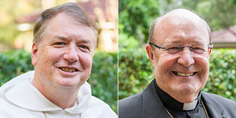
Extract from CathNews, The Australian, 22 May 2019
Sydney Archbishop Anthony Fisher OP said yesterday "the relative autonomy and legal protections afforded religious institutions, including schools and hospitals, had come under increasing scrutiny and even attack”. He called on believers to “resist attempts” to exclude them from public life and urged the parliament to “ensure that respect for religious freedom informs our laws and social policies”. “Anxiety about religious freedom was heightened in recent months, with debates about the funding of faith-based schools, proposed repeal of protections afforded religious schools, the seal of confession, and high-profile cases around freedom of speech and belief,” Archbishop Fisher said. Michael Stead, chair of the religious freedom reference group for the Anglican Diocese of Sydney, said the issue of religious freedom was “very significant in a number of electorates” during the federal election on Saturday. “It demonstrates the need for the government to push ahead with its promise for a religious discrimination act, which would help to alleviate some of the concerns that emerged, particularly during the last part of the election campaign,” Dr Stead said....(more). Photo: Cathnews, ACBC.
Extract from Jonathan Luxmore, Catholic News Service, National Catholic Reporter, 22 May 2019
Wilton Gregory says archdiocese should not be defined by 'our recent sorrow and shame'
Limited extract from staff, subscription journal La Croix International, 22 may 2019
United States. After being installed as the new archbishop of Washington, Wilton Gregory called on Catholic leaders and laity not to lose faith. "We stand at a defining moment for this local faith community," he said in his...(source). Photo: La Croix International, EPA/MAXPPP
This implacable defender of the existence of intrinsically evil acts refuses to call these acts by their most basic moral name: child rape
Limited extract from opinion piece, Cathleen Kaveny, subscription journal La Croix International, 22 May 2019
The debate about Benedict XVI's recent intervention on the sex abuse crisis has focused on his account of its root causes. To the delight of conservatives and the consternation of progressives, he blames the lax sexual morality of the 1960s rather than the enduring phenomenon of clericalism. In my view, the problem with Benedict's letter is far more fundamental. It also transcends the American progressive-conservative divide. He gets the basic moral description of the acts of sex abuse wrong. He frames them as acts of sacrilege rather than grave injustice. So what? Benedict clearly thinks these actions are unacceptable — why quibble about details? Because details matter, both theoretically and practically. If we get the description of a misdeed wrong, we fail to grasp the....(source)

Extract from Elise Harris, Senior Correspondent, Crux, 20 May 2019
ROME - Pope Francis Monday read Italian bishops the riot act Monday for failing to fully implement a revised marriage annulment procedure he rolled out in 2015, saying that after four years, most dioceses have not yet applied the new process. “It is with regret that I note that the reform, after four years, remains far from being applied in the great majority of Italian dioceses,” the pope said during a May 20 speech to the Italian bishops’ conference. Italy has the largest bishops’ conference in the world, and it’s generally seen as a pacesetter around the Catholic world because of its proximity to the Vatican. The pope traditionally holds the title “Primate of Italy”, and it’s the only conference in the world where the pope directly appoints its president. Francis issued the streamlined annulment process in September 2015, and it went into effect December that year to coincide with the launch of the Jubilee of Mercy. It was enacted with two motu proprio, or legal documents issued under the pope’s own authority, titled Mitis Iudex Dominus Iesus (“The Lord Jesus, a meek judge”), which handles modifications in the Latin Rite’s Code of Canon Law, and Mitis et misericors Iesus (“Jesus, meek and merciful”), which deals with changes for Eastern Catholic Churches. Among other things, the new process gave a stronger role to the local bishop, dropped automatic appeals in obvious cases of annulment, and ensured that the process would be free of charge. In his speech to Italian bishops, Francis called for the “full and immediate application” of the documents, saying the process should be fast, free and characterized by “closeness” to families in difficulty.....(more). Photo: Crux, AP Andrew Medichini

Extract from Kieran Tapsell, Pearls and Irritations, John Menadue website, 21 May 2019
For all his good points, Pope Francis has a credibility problem over child sexual abuse. Public statements are made, but once the door is closed, the paper that comes out contradicts what has been said. His latest Apostolic Letter, Vos Estis Lux Mundi, is no exception. In March 2017 Marie Collins, an abuse survivor, resigned as a member of Pope Francis’ Pontifical Commission for the Protection of Minors, because what was happening behind closed doors conflicted with what was said in public. From 1996 onwards, four national Catholic bishops conferences requested the Holy See to allow mandatory reporting of all allegations of child sexual abuse to the civil authorities. They were rebuffed. In 2003, the Attorney General for Massachusetts (remember Spotlight?) found that Church officials in Boston believed that canon law prohibited them from reporting abuse to the civil authorities. In 2009, the Murphy Commission in Ireland came to the same conclusion about the cover up in Dublin. On 16 January 2014, members of the United Nations Committee for the Rights of the Child asked Bishop Scicluna why Church policy did not provide for mandatory reporting of all cases to the civil authorities, and not just where there were civil reporting laws. His answer was the Church required domestic laws to be followed, but otherwise, it was up to the victims (children or those who ‘habitually have the imperfect use of reason‘) to report the abuse. On 6 May 2014, Archbishop Tomasi told the United Nations Committee against Torture that the Holy See’s responsibility towards children under the Convention was limited to the 30 or so who lived inside the 44 hectares of the Vatican City, despite the fact that within those walls, the Holy See was deciding whether some 4,000 priest sex abusers from all over the world should have access to children by remaining as priests......(more) Photo: Kieran Tapsell

Contempt of court review to look at use of social media after George Pell case
Victoria is looking at its laws after a suppression order in the trial of Cardinal Pell was broken Extract from Melissa Davey, The Guardian, 17 May 2019
A review of contempt of court laws in Victoria will consider whether jurors and court officers need to be educated about social media, and whether messages about court proceedings sent to groups through private messages on social media should be considered as a breach of a suppression order. On Thursday the Victorian Law Reform Commission released its consultation paper on contempt law reform, and related legislation on accessing information about court proceedings. The review was ordered by the attorney general in December after a jury delivered a unanimous guilty verdict in the trial of Cardinal George Pell for historic child sexual abuse offences. There has also been debate generally in Victoria over many years about the use of suppression orders. While a suppression order temporarily prohibits publication of a verdict or information about a trial, in Pell’s case the guilty verdict was published by some news outlets despite a comprehensive suppression order being in place. While several international news outlets named Pell, a number of Australian publications wrote about the verdict but did not name Pell or go into detail about the case....(more) Photo: The Guardian, Fairfax Media via Getty Images

Pope Francis' most recent address to Rome's diocesan assembly did not make many headlines. But it should have. And here's why.
Limited extract from Robert Mickens, subscription journal La Croix International, 17 May 2019
Vatican City. Most people who follow the happenings of the Catholic Church will vividly remember this date: March 13, 2013. It was on that evening in Rome that a Jesuit cardinal from Argentina named Jorge Mario Bergoglio appeared on the central balcony of St. Peter's Basilica dressed in white. He was the newly elected pope and had taken the name Francis. "You know that it was the duty of the conclave to give Rome a bishop. It seems that my brother cardinals have gone to the ends of the earth to get one," he said in his very first words to the Church and the world. "First of all, I would like to offer a prayer for our Bishop Emeritus, Benedict XVI," the new pope said. "Let us pray together for him, that the Lord may bless him and that Our Lady may keep him," Francis continued. And then he said: "And now, we take up this journey: Bishop and People – this journey of the Church of Rome, which presides in charity over all the Churches. A journey of fraternity, love and trust among us." The first and most important title. Many commentators made much about the fact that Pope Francis identified himself immediately as "Bishop of Rome." They misinterpreted this as an act of humility, saying the new pope referred to himself by using his most humble title. In fact, Bishop of Rome is not the most humble. It is the first and most important of the eight official titles currently accorded to the man we address as Pope, Your Holiness or Holy Father. The other seven titles, which are officially listed in the Annuario Pontificio, are the following: - Vicar of Jesus Christ - Succ...(source) Photo: La Croix International, EPA GIORGIO ONORATI MaxPPP
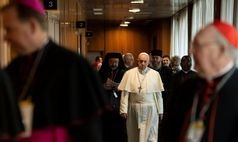
Extract from The Editors, Commonweal, 16 May 2019
When the Vatican summit on clerical sex abuse concluded in February, the editors of this magazine argued that its effectiveness would be demonstrated by what happened after it was over. Would it prove more than a public-relations exercise? Would the searing testimony of abuse survivors send bishops home determined to undertake the work of accountability and reform? Would Pope Francis actually deliver the “concrete measures” he indicated were forthcoming? Not all of these questions can be fully answered yet. But just three months after the summit’s conclusion, Francis has proved that at least his own words were not empty promises, handing down Vos estis lux mundi (“You Are the Light of the World”), a motu proprio that establishes universal laws for reporting and investigating sex abuse. The first section of the document states that bishops, priests, and members of religious orders must report to church officials both abuse and the cover-up of abuse. This applies to the abuse not only of minors, but also of vulnerable adults, including those forced “to perform or submit to sexual acts” through threats or “abuse of authority”—a clear reference to seminarians preyed on by those with power over them. The motu proprio takes effect this month, and within a year, “public, stable, and easily accessible” systems for submitting reports of abuse must be instituted in dioceses where they do not currently exist. The document also provides protections for those who report abuse. Any retaliation or discrimination against whistleblowers is prohibited. The document underscores that reporting abuse does not violate “office confidentiality,” and that those who submit a report have no obligation to “keep silent” about their claims.....(more). Photo: Commonweal 20190516 CNS Vatican Media via Reuters
Extract from Association of Catholic Priests, Ireland, 15 May 2019
Some time ago – not too long in time, though it feels like centuries – the priests of Killala diocese struggled with a huge issue. Altar girls. Women had become astronauts, pilots, bus-drivers, prime ministers and presidents as well as priests in other Christian denominations. This twentieth-century phenomenon was taking over the world and had even infected the minds of small female persons, as we saw this perilous campaign gaining momentum. As good priests, ‘faithful to the traditions of the church’ (as theologians usually say when they want nothing to change), we agreed that our first point of departure should be a query to an expert in canon (Church) law. Bishop Tommy Finnegan contacted an acknowledged authority who sent on what he hoped would be a helpful response to this insidious development, a response that was heavy on strategy but light on common sense. Bishop Tommy read the statement to the assembled clergy. It was greeted by a stunned silence until one priest suggested that if we put that in a parish bulletin, the assembled congregation would laugh even more at us – Fr Ted being the most popular television viewing at the time. The bishop folded the page and put it in his back pocket. It was the last we heard about it. The sky didn’t fall in on the Catholic Church when young girls took to wondering out loud why serving Mass was only for boys or when word spread that in a particular parish girls could serve as well as boys. Or when they made their way inside the altar rails. And so it was.....(more)

Bishops have set up a special group to advise on how to implement the recommendations of the Royal Commission into Institutional Responses to Child Sexual Abuse
Limited extract from Eric Hodgens, subsription journal, La Croix International, 15 May 2019
The Australian Royal Commission into Institutional Responses to Child Sexual Abuse (RC) is one of the most thorough investigations of its kind worldwide. The Australian Catholic Bishops' Conference and Catholic Religious Australia have made a combined response accepting virtually all the commission's recommendations. This puts them further down the track of adaptation than most countries in the world. If it works out, Australia has the chance to be showing the way for other nations, the Roman Curia and even canon law itself. The Australian bishops have set up an Implementation Advisory Group to advise on how to implement the recommendations of the RC. A key recommendation is: The Australian Catholic Bishops' Conference should conduct a national review of the governance and management structures of dioceses and parishes, including in relation to issues of transparency, accountability, consultation and the participation of lay men and women.......(source). Image: La Croix International
Extract from John L. Allen Jr. Editor, Crux, 13 May 2019
ROME - It’s now been almost a year since the latest wave of the clerical sexual abuse scandals in Catholicism erupted with news that the Vatican had removed then-Cardinal Theodore McCarrick from ministry following allegations deemed credible by a review board in the Archdiocese of New York. How bad have things become over that year? Well, one measure is this: Arguably the most prominent Catholic bishop in America, and by consensus the most talented natural communicator and evangelist among the current crop of U.S. prelates, felt compelled to bring out a new book today in which he urges, almost begs, rank-and-file Catholics not to just walk away. “I have written this book for my fellow Catholics who feel, understandably, demoralized, scandalized, angry beyond words, and ready to quit,” writes Auxiliary Bishop Robert Barron of Los Angeles, known to millions of Catholics in America and around the world through his Word on Fire ministry and his “Catholicism” TV series. “What I finally urge my brothers and sisters in the Church to do is to stay and fight-and to do so on behalf of themselves and their families, but especially on behalf of those who have suffered so grievously at the hands of wicked men,” Barron writes. Barron’s short new book is titled Letter to a Suffering Church: A Bishop Speaks on the Sexual Abuse Crisis.....(more)

Edited Extract from Fr Noel Connolly, St Columbans Mission Society, 13 May 2019
Fredrick Nietzsche, the atheistic, “death of God” philosopher, was fond of taunting his Christian friends with, “I’ll believe in your redeemer when you look more redeemed”. Pope Francis in Evangelii Gaudium makes a similar challenge. He asks, what kind of missionaries are Christians who look like “Lent without Easter” [EG 6], or people “who have just come back from a funeral” [EG10], “querulous and disillusioned pessimists, sourpusses” [EG 85], “defeated generals” [EG 96]. He prays, “May the world of our time, which is searching, sometimes with anguish, sometimes with hope, be enabled to receive the good news not from evangelizers who are dejected, discouraged, impatient or anxious, but from ministers of the Gospel whose lives glow with fervour, who have first received the joy of Christ” [EG 10]. He believes that mission is not about winning an argument, because only the beauty of God can attract. #15 Christians should present a beautiful, joyful and tender face to their secular brothers and sisters. The gospel is caught not taught. People believe only because they see beauty in our lives. Francis was elected Pope to turn the church from being self-preoccupied to being one that was missionary and went out on to the streets and got bruised and dirty. I have been thinking of Pope Francis’ challenge as we prepare for the second phase of the Plenary Council. Plenary Councils have a tendency to be church-preoccupied. We do have a number of governance issues to remedy. We need more accountable and transparent leadership. We must involve women more fully in the leadership and ministry of the church. We need to reach out to the youth, to improve the quality of our liturgies and have better formation for ministry and the priesthood. All these and many other challenges are important and hopefully the Plenary Council will address them. However, to be true to our missionary calling and to find happiness for ourselves, we also need to rediscover the joy in being Christian that we want to share.....(more)
ACP expresses disappointment over pope's comments on women deacons.
Extract from Association of CatholicPriests, Ireland, 11 May 2019
Pope Francis’s comments on women deacons at the press conference on the plane back from Bulgaria, his kicking the can down a timeless road, is a major disappointment. We had come to expect reactions like this from previous popes, but we thought Francis was different, and consequently our disappointment is greater. The equality of women is critical for the credibility and the future of the Church. Introducing women deacons is such a minimalist step that if he cannot move on that, there is little or no prospect of any real movement towards equality. His comments send all the wrong messages about women to women and men. It confirms that women are not good enough, and that in the eyes of the ‘official’ Church men are more worthy than women. It confirms that many of women’s gifts will continue to be wasted. It confirms that the official institutional Church is a men’s Church. It confirms that to be a full member of the Church, exercising all the privileges, you have to be a man. It confirms that the Church is a structure built by men for men. It confirms that the Church continues to be a clerical hierarchical patriarchy. It confirms that injustice is built into the heart of the Church. This is an enormous blow to reforming the Church and bringing it into the 21st century. Now is the time for all of us who believe in equality to make our voices heard, clearly and without equivocation. There must be no fudge about where we stand; bishops, priests and people in the pews. Now is not the time for looking over our shoulders, thinking of our chances of promotion, or of offending those in authority. This is much too important....(source)

Extracts from James, Catholica, 11 May 2019
There is something about the curate's egg in Pope Francis' Motu Proprio Vos Estis Lux Mundi ("Vos Estis"). There is good and bad in it. Let's deal with the good parts first. The Positives............The negatives..........
(MORE). Cartoon. Curate's egg Wikipedia, By Mr Wilkinson - “Judy: The London Serio-Comic Journal", May 22, 1895, Public Domain
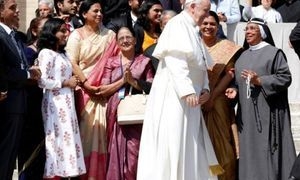
Extract from Charles Collins, Managing Editor Crux Now, 10 May 2019
There are usually two reasons for establishing a study commission, no matter what the organization: For it to come to a predetermined conclusion, or to bury an issue out of sight until hopefully people forget about it. When Pope Francis established such a commission to study the issue of women deacons in 2016, no one was sure what model he was going to follow. In 2013, immediately after his election, veteran Vatican journalist Andrea Gagliarducci quoted one insider who said Francis “would create a commission to decide how to get from Washington to New York. Everybody knows that the best thing is to take a high-speed train heading north, and everybody knows that a commission would reach this conclusion. The pope, however, wants to count on a strong backing for his views.” Francis’s detractors even accused him of using the Synod of Bishops in such a way to push through changes to the Church’s discipline on communion for the divorced and remarried. Which brings us to women deacons. Currently, canon 1024 of the Code of Canon Law says that only a baptized male can receive the sacrament of ordination, so the law does not presently permit female deacons. The question, however, especially in light of the Biblical and historical evidence for women being referred to as “deaconesses” in early Christianity, is whether that law could be changed, or if it is a question of doctrine....(more) Photo: Cruxnow Remo Casilli/Reuters/CNS
Extract from CathNews, NCR Online, 10 May 2019
Pope Francis has issued new laws for the Church on the investigation of clergy sexual abuse, mandating that all priests and members of religious orders worldwide are obligated to report any suspicions of abuse or its cover-up. The Pontiff has also established a new global system for evaluating reports of abuse or cover-up by bishops, which foresees the empowering of archbishops to conduct investigations of prelates in their local regions with the help of Vatican authorities. The new norms, contained in a brief apostolic letter issued yesterday titled Vos estis lux mundi (“You are the light of the world”), are exhaustive in scope, applying in some way to every ordained or vowed member of the 1.3 billion-person Church. They also encourage lay people to make reports of abuse, and provide for involvement of lay experts in investigations. In his introduction to the document, which goes into effect on June 1, Francis says he has created the new laws so the Church will “continue to learn from the bitter lessons of the past, looking with hope towards the future”....(More)
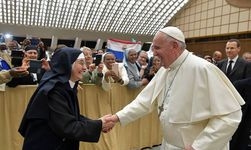
Extract from Gerard O’Connell, America. The Jesuit Review, 10 May 2019
Pope Francis had prepared a written text for the conclusion of the 21st assembly of the International Union of Superiors General in Rome on May 10, but, as was widely expected, he put it aside in favor of an open dialogue with the women superiors from 80 countries, who represent many of the 660,000 women religious across the world. The result was a humorous and challenging exchange. Francis was questioned about the possibility of women deacons by a German sister, who said she hoped the church “would not rely only on the basis of history, of dogmatics, of divine revelation, but also on… how Jesus accompanied women and on what humanity has need of in the 21st century” for a future decision about female deacons. Francis said that was true but added he could not do something that has not developed from revelation, the truths about the faith revealed by God.....(more) Photo: America, The Jesuit Review, CNS Vatican Media via Reuters

Towards addressing the 'Pontifical Secret'
Extracts from and link to 7 May Apostolic Letter (Moto Proprio) from Pope Francis, 10 May 2019

Extract from Michael Sainsbury, Pearls & Irritations, John Menadue website, 7 May 2019
Australia’s Catholic bishops appear to have ceded control of the direction of wholesale reform in the church, with the announcement of a sweeping and unprecedented review into the management of dioceses and parishes by a group whose six-members include just one member of the clergy and three women including a nun. The terms and membership of the review have been set by an Implementation Advisory Group, which was created by the Australian Catholic Bishop’s Conference and Catholic Religious Australia in May 2018. It is likely to pave the way for a new governance model for the Australian church that would see the laity – and especially women play a key role in how diocese and parishes in Australia are managed. Such a review was a key recommendation of the Royal Commission into Institutional Child Sex Abuse (no 16.7) yet it is more than 18 months since that body handed down its recommendations and only now do we have a document (a five-page outline) that details the scope and some of the intent of the review, well over two years since the Royal Commission finished its hearings.....(More). Image: ACBC Logo. [Ed: The ACBC Dioceses and Parishes Governance and Management Review Project Plan may be downloaded HERE]
Extract from by J. A. Dick, Another Voice, 10 May 2019
Catholic fundamentalists are taking aim on Pope Francis. On April 30, a group of 19 Catholics, called more or less “prominent,” released an open letter to the bishops of the world, accusing Pope Francis of heresy. Certainly, a formal public accusation of heresy against a pope by a group of Catholics, associated with Catholic universities and institutions, cannot simply be ignored. When one examines their accusations, however, one sees a list of what I would call more administrative and public relations issues than strict theological problems: Francis’ efforts to expand relations with China, his work in interfaith dialogue, and what I would call his “perceived” openness to L.G.B.T. people. The papal critics also take issue with “Amoris Laetitia,” the 2016 apostolic exhortation on family life issued by Pope Francis. Some bishops have interpreted it as opening the way for divorced and remarried Catholics to receive Communion. This is more about church discipline than theological heresy. In the days of widespread Catholic clerical sexual abuse of children, men, and women religious, enabling divorced people to receive communion is not high on my list of Catholic worries. Finally, the singers of this anti-Francis letter lapse into complete foolishness when they complain that, at the opening mass for the Synod on Youth in 2018, Pope Francis carried a staff in the form of a “stang” an object used in satanic rituals. No. Francis is neither satanic nor diabolic. Some of his theological critics however are devious old demons. Francis is not a heretic. There will be no burning at the stake in front of St. Peter’s. But is Francis blameless? I don’t think so…. Francis can appear friendly, down to earth, and like-able. I do criticize him, however, for his leadership short-comings....(more)
Extract from CathNews, NCR Online, 10 May 2019
Pope Francis has issued new laws for the Church on the investigation of clergy sexual abuse, mandating that all priests and members of religious orders worldwide are obligated to report any suspicions of abuse or its cover-up. The Pontiff has also established a new global system for evaluating reports of abuse or cover-up by bishops, which foresees the empowering of archbishops to conduct investigations of prelates in their local regions with the help of Vatican authorities. The new norms, contained in a brief apostolic letter issued yesterday titled Vos estis lux mundi (“You are the light of the world”), are exhaustive in scope, applying in some way to every ordained or vowed member of the 1.3 billion-person Church. They also encourage lay people to make reports of abuse, and provide for involvement of lay experts in investigations. In his introduction to the document, which goes into effect on June 1, Francis says he has created the new laws so the Church will “continue to learn from the bitter lessons of the past, looking with hope towards the future”....(More)

Extract from Michael Sainsbury, Pearls & Irritations, John Menadue website 7 May 2019
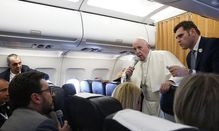
Extracts from Gerard O’Connell, America, The Jesuit Review, 7 May 2019
In a press conference on the flight from Skopje to Rome, Pope Francis revealed that the commission he set up two years ago to examine the role of women in the early church did not reach agreement on the question of women deacons. He said the members of the commission had quite different positions, and after two years it stopped work. He made clear that the issue needed further study but did not say who would do this work......Pope Francis said, “There were deaconesses at the beginning [of the church], but [the question is] was theirs a sacramental ordination or not?” Regarding the question of women deacons, it was noted by the questioner that the Bulgarian Orthodox Church has women deacons to proclaim the Gospel. He was reminded that he will soon meet the International Union of Superiors Generals (who raised the question three years ago), and the pope was asked what he has learned from the report of the commission on the ministry of women in the early church and if he had made a decision on the female diaconate. (The following is a working translation that may be subject to revision when the Vatican releases a definitive transcript.) Pope Francis said that commission members “all had different positions, sometimes sharply different, they worked together and they agreed up to a point. Each one had his/her own vision, which was not in accord with that of the others, and the commission stopped there.” He described the contrasting conclusions drawn by members of the commission as “toads from different wells.” Then, he said, “on the question of the female diaconate: there is a way of conceiving it that is not with the same vision as that of the male diaconate......(more). Photo: America, the Jesuit Review, 20190507, CNS Paul Haring

Extract from CathNews, ABC Media Blog, 3 May 2019
Former New South Wales senator Ursula Stephens will take over as the new chief executive officer of Catholic Social Services Australia on July 1, it was announced this morning. Bishops Commission for Social Justice – Mission and Service chair Bishop Vincent Long Van Nguyen OFM Conv. welcomed Dr Stephens and, on behalf of the Australian Catholic Bishops Conference, wished her well in the new role. CSSA chair Maria Harries said Dr Stephens was chosen from among a field of high-quality candidates, “which is a testament to the work that Catholic social services providers carry out each day across the country”. “The appointment of Dr Stephens promises to enable CSSA to continue to implement its strategic vision of a fairer, more inclusive Australia,” Dr Harries said. Bishop Long’s announcement outlined some of Dr Stephens’ achievements in her time representing the Australian Labor Party, including her work advocating for social inclusion policies while in government. Dr Stephens served in the Australian Senate from 2002 to 2014. Dr Stephens also has experience within the social services sector, in social policy development, government relations and community services more broadly, he explained. Dr Stephens will replace Fr Frank Brennan SJ, who is leaving CSSA to take on the role of rector at Newman College at the University of Melbourne from next year. Bishop Long paid tribute to Fr Brennan as someone who “has been an advocate for marginalised and vulnerable people for decades”. Dr Stephens also praised Fr Brennan, saying she looks forward to taking up the task of “supporting the work and commitment of the CSSA members to improve the lives of so many Australians”....(More). Photo: CathNews

Extract from CathNews, Crux, 3 May 2019
Migrants are not a threat to a nation’s culture, traditions and values, Pope Francis said. Rather, every nation is a product of immigration and the integration of cultures, traditions and values. That is why any nation that “stirs up nationalistic sentiments in its people against other nations or groups of people would betray their mission”, the Pope said yesterday. Francis gave a lengthy speech to members of the Pontifical Academy of Social Sciences, who are holding a three-day plenary meeting that concludes today at the Vatican on the nature and role of the nation-state, the development of international cooperation and today’s resurgence of nationalism. The Church, the Pope said, has always promoted love and respect for one’s nation and cultures while also warning against turning such affection into the hatred and exclusion of others – a “confrontational nationalism that puts up walls, indeed, even racism and anti-Semitism”. “The Church notes with concern the re-emergence, a bit everywhere in the world, of aggressive currents against foreigners, especially immigrants, as well as that growing nationalism that overlooks the common good,” he said. The state is meant to be at the service of people, families, the common good and peace, he said. “However, too often states become subservient to the interests of a dominant group, mostly for economic profit, who oppress – among other things – ethnic, linguistic or religious minorities who are on their territory.” In fact, he said, one can gauge a nation’s understanding of human dignity and humanity by the way it treats migrants, he said....(More) Image collage: MMOC Catholic Parish Ivanhoe
Extract from Media and Communications Office, Thursday 2 May 2019
A gathering of generations from around Melbourne came together for a youth-focused panel discussion at Spirituality at the Pub at St Andrew’s Hotel in Fitzroy this week. The night was emceed by key organizer Del Durrant who had a part in sourcing the panel for the evening called ‘Voices for Youth’, and the topic was around what these speakers felt about the future of the Catholic Church. Spirituality in the Pub nights (SIP) began in 1995 instituted by the Catalyst for Renewal Inc to create useful dialogue in the Church. ‘The speakers for the night came from various walks in life, all with the common denominator of faith and youth,’ Del said. The questions posed to the panel of the evening were ‘what do you think of the church today?’ and ‘what are your hopes and dreams of what the church can be?’ The general consensus among the group was centered around a desire for the church to be more about community and service and more aligned with Jesus of Nazareth’s teachings. ‘I believe there are other ways in my life I can still be a part of Church, be spiritual and be connected with God,’ said Gabby, a Maths and Engineering student from Melbourne University. Despite being an irregular attendee at Mass, Gabby said she exercises her faith through volunteering her time with a charity organisation in Perth called Cana. ‘I believe this is the future. It is our church. Going to Mass is a way of saying thank you to God, but I also find this connection through community, helping others and thinking of the less advantaged than ourselves.’ Luke, a Catholic Religious, spoke about his thoughts on the future of the Church. ‘I may express a bias here in favour of the Eucharist, but in the Eucharist I find the answer to "does being Christian make a difference?" and "does being a Religious make a difference?" It's also necessary when envisioning what Church we will look like in ten years’ time.’ The Eucharist works because it’s about crisis,’ he said. ‘And it’s about what we can do in a crisis. The first thing is a Eucharist is and should be welcoming, inclusive and healing. Jesus didn’t put restrictions on which disciples could participate or on how they could participate.’ Alicia Deeak is a secondary teacher of Religious Education and Religion and Society at St Ignatious College in Geelong, and is currently studying a Master of Theology. She spoke about the different society in which the younger generation is contending with.........(More)
Extract from SBS News, Reuters, 2 May 2019
A group of 19 Catholic priests and academics have urged bishops to denounce Pope Francis as a heretic, in the latest ultra-conservative broadside against the pontiff over a range of topics from communion for the divorced to religious diversity. The most prominent of the group is Father Aidan Nichols, a 70-year-old British priest of the Dominican order who has written many books and is one of most recognized theologians in the English-speaking world. The others are less well known. “We take this measure as a last resort to respond to the accumulating harm caused by Pope Francis’s words and actions over several years, which have given rise to one of the worst crises in the history of the Catholic Church,” they said in a 20-page open letter. The letter attacks Francis for allegedly softening the Church’s stance on a range of subjects. They say he has not been outspoken enough against abortion and has been too welcoming to homosexuals and too accommodating to Protestants and Muslims. It was published on Tuesday by LifeSiteNews, a conservative Catholic website that often is a platform for attacks on the pope. Last year, it ran a document by the Vatican’s former ambassador to Washington, Archbishop Carlo Maria Vigano, calling on the pope to resign.....(more)

Extract from Stephanie Lorenzo, Women's Agenda, 1 May 2019
If you asked me a year ago about the role religion and faith play in my life as a 32 year old, I would have laughed it off and likely told you about my parents’ daily prayers for me to find a husband. My parents, devout Catholics who you’ll find in the front row of their parish weekly, migrated to Australia from the Philippines in the 1980s. They wanted to give their three daughters the best possible opportunities in what they heard was a safe, stable and beautiful country. My dad studied at TAFE, got a building licence and built houses for a living so that he could earn enough money to send his three daughters to a private Catholic school and then to university. I realise how lucky I am to have not paid for my education, and seeing my parents work so hard every day instilled in me a work ethic that led to a solid career throughout my 20s. So forgive me if I find it a little ironic that as soon as 30 kicks in for their youngest girl, the prayers change from ‘we pray she finds a good job, does well in her studies and finds the right house to buy’ to ‘please God let her find a husband and settle down’.
I chuckle, and then ask myself, should I blame them? Isn’t this what most societies, irrespective of their culture and outlook, seem to agree on – that a woman’s role is to bear children, stay at home and raise them? Now before you roll your eyes and turn the page, I’ll admit that my 33 year old self, without a doubt, wants to have children and I’d like to be able to stay home with them in their early years. However I can’t help but wonder and fear what major changes having children will mean for my career as a woman and my ability to continue on my professional trajectory..... (More) Photo: Women's Agenda
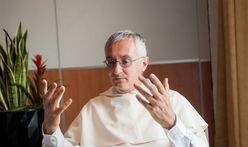
New document entitled 'Religious freedom for the good of all' takes a landmark Vatican II text as its starting point
Limited extract from Nicolas Senèze, subscription journal La Croix International, 1 May 2019
The International Theological Commission (ITC) published a significant new document focusing on the contemporary threats to religious freedom on its website on Friday, April 26. "There is no question of reopening old debates, particularly with the Lefebvrists, but of studying the things that mitigate against religious freedom in the contemporary world," ITC secretary general, Father Serge-Thomas Bonino, told La Croix. Father Bonino along with French priest, Philippe Vallin, and the Belgian Jesuit, Bernard Pottier, participated in the working group that spearheaded the 37-page new document entitled "Religious freedom for the good of all." The document is currently available only in Italian. It's starting point is the Declaration on Religious Freedom from the Second Vatican Council (1962-.....(source) Photo: La Croix International JEAN-MARIE HEIDINGER CIRIC
At a time when institutions have become the object of a serious crisis of confidence, there is risk of an internal form of 'anticlericalism' developing among Catholics
Limited extract from Isabelle de Gaulmyn, Strasbourg, subscription journal La Croix International, France, 29 April 2019
A conference organized by the Strasbourg Faculty of Theology has examined several possibilities for re-balancing the power of priests and lay people. "Clericalism is the enemy!" was the mantra of anticlerical Republicans during the late 19th century. Curiously, the slogan has now become a favorite among Catholics in relation to ecclesial dysfunction. Hence, the title of a conference organized by the Theology Faculty of Strasbourg at the end of April addressing the highly relevant theme, "The temptation of clericalism."
Speakers from several disciplines, including history, theology and canon law, examined clericalism from various points and began to offer the beginnings of a response to the issue.....(source)
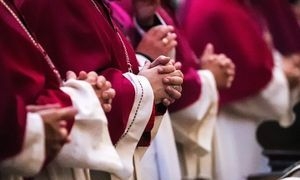
What Pope Francis wants to demonstrate is that the Church gives rise structurally to psychological, spiritual and sexual abuse, says expert lay canon lawyer
Limited extract from Claire Lesegretain, subscription journal La Croix International, 26 April 2019
Thibault Joubert, a lay canon lawyer and lecturer in the Faculty of Catholic Theology at the University of Strasbourg, is co-organizing a colloquium on "The Temptation of Clericalism" at Strasbourg on April 25 and 26. La Croix: Why has this colloquium on The Temptation of Clericalism been organized? Thibault Joubert: The origins of this colloquium are in Pope Francis' denunciation of clericalism as being largely responsible for the sexual abuse committed by members of the clergy. In 2016, in his letter to Cardinal Marc Ouellet (as President of the Pontifical Commission for Latin America, NDLR), Francis pointed out the.........Photo: Clericalism La Croix International

Extract from Philip Almond, Emeritus Professor in the History of Religious Thought, The University of Queensland. The Conversation, 26 April 2019
......."[The fault line in modern religion.....] is a struggle between liberals and conservatives, fundamentalists and moderates, reason and revelation. It is a battle within theologies between a God who is thought to be knowable through nature, man and history and a God who is thought to be only knowable through the revelations contained in the inerrant pages of the Torah, the New Testament or the Quran."......(more) Image: Shutterstock
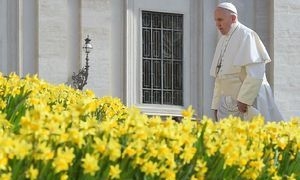
Will the next conclave go in their favour of those opposed to Pope Francis? A new book suggests that's unlikely
Extract from Christopher Lam, The Tablet, 25 April 2019
The opponents of Pope Francis, be they inside or outside of the Church, are pinning their hopes on a future conclave. “There are people who simply don’t like this pontificate,” Cardinal Walter Kasper told the German State broadcaster ARD earlier this year. “They want it to end as soon as possible to then have, so to say, a new conclave. They also want it to go in their favour, so it will have a result that suits their ideas.” But if a new book on the election that chose this Pope is anything to go by, the anti-Francis groups are facing an uphill struggle. In “The Election of Pope Francis”, Gerard O’Connell offers a synoptic account of the 2013 conclave, giving readers a ringside seat on the drama that followed Benedict XVI’s resignation and the emergence of the first Latin American Pope. Drawing on interviews with cardinal electors, America Magazine’s experienced Vatican correspondent sets out how and why the votes were cast for Cardinal Jorge Bergoglio. Although all this took place six years ago, the book offers three insights into the politics of papal elections that remain valid today. The first is the inevitable failure of anyone who runs an overt campaign for the papacy – or allows for a campaign to be undertaken on their behalf. Cardinals see through them, and resist them, and even more so if they are well-funded and co-ordinated with the media. These campaigns are viewed as an interference in the discernment process that takes place in a conclave and where electors are required to be open to the Holy Spirit which “blows where it wishes”.....(more). Photo: The Tablet Eric Vandeville ABACAPRESS dot COM
Extract from Tom Roberts, National Catholic Reporter, Apr 24, 2019
Will he or won't he? That's the question being asked in some circles as the date approaches for the pope's appearance at this year's May 6-10 meeting of the International Union of Superiors General (UISG), the leaders of the world's congregations of Catholic women religious. Every three years the group meets in Rome, and during the last gathering, in answer to a question from the group, Pope Francis agreed that it would be good to appoint a commission to study the history of women deacons. The commission was formed within three months, in August 2016, and last summer, having completed its work, the commission sent a paper to the pope. So the big question this year is: What's Francis going to say about women deacons?....(more)
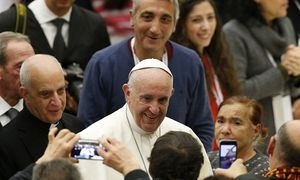
A New Vatican Constitution Will Embody New Priorities
Extracts from Austen Ivereigh, Commonweal, 23 April 2019
According to the report in Vida Nueva seen in advance by Commonweal, the key shift in Praedicate evangelium (“Preach the Gospel”) is to put evangelization at not only at the heart of the church’s mission, but also at the heart of the Vatican itself. All the official church’s other activities will flow from—and be subordinate to—evangelization. A new “super-dicastery” for evangelization will take precedence over all other congregations, relegating the Congregation for the Doctrine of the Faith (CDF). The CDF has traditionally been known as “La Suprema” because almost everything that the Vatican put out had to be ratified by it, and because of the assumption that Rome’s essential role was the clarification of doctrine. This is why the CDF appears first on the list of Vatican congregations in the existing apostolic constitution, Pastor bonus, published by Saint John Paul II in 1988. In Praedicate evangelium, this place is reserved for the evangelization dicastery. Pope Francis always underlines that the church is missionary. So it makes sense for us to have put the Dicastery for Evangelization in first place, and not Doctrine of the Faith,” explains Cardinal Óscar Rodríguez Maradiaga, who presides over the kitchen cabinet of cardinal advisers, or “C9,” which has overseen the new constitution........The new evangelization dicastery embeds an understanding that all territories are now “mission areas,” and that the church is per se missionary. Unable to rely on the support of law and culture, the church’s credibility in a context of pluralism relies primarily on its capacity to offer an encounter with the mercy of God in Jesus Christ......The other gear shift embedded in the new constitution is ecclesiological. As promised by the C9, Praedicate evangelium overturns the idea of the Roman curia as little more than a bureaucracy passing on orders from the head office. It takes seriously the Second Vatican Council’s idea of the universal church being governed by the College of Bishops, with and under the pope. Praedicate evangelium places the departments of the curia at the service of the entire college of bishops, not just the pope, and makes clear that the pastor of a local Church is on the same hierarchical level as the prefect of a Vatican body. “As successors of the apostles, the bishops are not in an ecclesiological position below those who work in the Roman curia,” Cardinal Rodríguez points out....(more) Photo: Commonweal, CNS Paul Harring
Diarmuid Martin says sex abuse crisis leading to loss of faith
Limited extract from International staff, subscription journal La Croix Internationak, Ireland 23 April 2019
Ireland: The Irish Church must adapt and reform if it is to survive the clerical sex abuse scandal and other challenges that lie ahead, said the Catholic Archbishop of Dublin. Diarmuid Martin, 74, the most influential Catholic prelate in Ireland, said in an interview with The Irish Times on April 22 that there's still "a lot of....(source).
President Peter Wilkinson, Executive and Committee, Catholics For Renewal

Extract (and video) from BBC Two, 5 April, republished here 20 April
After the critically acclaimed Pilgrimage: The Road to Santiago, eight well known personalities are back on the road, but this time they’re heading to Rome! All with differing beliefs and faiths, actors Les Dennis and Lesley Joseph, professional dancer Brendan Cole, comedians Stephen K Amos and Katy Brand, Olympic champion Greg Rutherford, Irish Eurovision Song contest winner Dana and television presenter Mehreen Baig will live as modern day pilgrims. Donning backpacks and walking boots, they’ll stay in basic hostels, sleep in shared dorms, and follow a largely untrodden route as they set out on the ancient 2000km Via Francigena. It will take them over the Alps and through the vineyards of Tuscany with the end goal of reaching Rome, the home of the Roman Catholic Church. But how will they react when they receive an extraordinary invitation from the Pope and will this journey of a lifetime change the way they think about themselves and their beliefs? (source) VIDEO HERE

Extract from Meghan Sullivan, Pearls & Irritations, John Menadue website, 17 April 2019
During Lent, Christians are asked to think much more concretely about our short, precarious lives. We swear off chocolate, alcohol, or, in my case, swearing itself. We spend more time in prayer, usually aiming for some divine help in addressing our sins. We try to be a little more mindful of the struggles of others, while reminding ourselves that our puny carbon-based bodies are destined for decay. This is all meant to be a preparation for Easter, when we celebrate the hope that there is a new, permanent life to come. Even when it’s not Lent, we Catholics are meant to be thinking hard about that new life. Every Sunday at Mass we publicly affirm the Nicene Creed, which ends: “I look forward to the resurrection of the dead and the life of the world to come.” I feel disingenuous every time we get to these lines, because, frankly, I’m not looking forward to the life of the world to come. I love this life. And the more you delve into theology of the afterlife, the weirder and less exciting it seems. Thomas Aquinas says we can look forward to contemplating God forever. The biblical book of Revelation insists we’ll get to help build the new Jerusalem with gold and jewels. On many Christian accounts, we will get new, unalterable bodies. We may or may not have free will or families. It is strongly suggested that there will be a lot of hymn singing. I want many things for my future: to take a major bike trip, write more philosophy books, and watch another season of Game of Thrones. Singing, city construction, and contemplation? Not currently in my plans. It is unclear that any of the hopes that guide and enrich my life now will be part of this life I am promised. So is the core commitment of Christianity irrational?....(more)
A theology that works in a deference mode is completely unacceptable according to today's understanding of scholarship, says German scholar
Kinited extract from Christa Pongratz-Lippitt, Vienna, subscription Journal La Croix International, 17 April 2019
One of Germany's leading Catholic liturgists has called for the establishment of independent judicial or administrative courts where theologians can find recourse when they are curtailed or disciplined by the Roman Curia. "A transparent jurisdiction is a must. Without it, all discussion about real freedom in theological scholarship is futile," said Professor Benedikt Kranemann of Erfurt University in a March 26 article on the German Church's official website, katholische.de. Kranemann, a 59-year-old layman who is an advisor to the German bishops' conference, based his proposal on Pope Francis' insistence that theological studies must be a "cultural laboratory" capable of interpreting .....(source).
Extract from Inés San Martín, Rome Bureau Chief, Crux, 15 April 2019
ROME - It took 29 meetings, but the pope’s “C-9” council of cardinal advisers, which is now functionally more akin to a “C-6”, has a new constitution for the Vatican in the form of a draft presentable to all the bishops’ conferences around the world, the heads of the various departments of the Holy See, theologians and canonists. According to a principal drafter of that document, one core aim, reflecting the electoral mandate given Pope Francis six years ago, is to combat centralization of power in Rome. Cardinal Oswald Gracias from Bombay, India, a member of the council, was responsible for drafting parts of Praedicate evangelium, which will now be reviewed by bishops around the world who have to send their thoughts in late May, before the council’s next meeting in June. Gracias spoke with Crux last week at the end of a meeting of the prelates, and he said fighting “centralization” was a principal goal of the drafters. The issue was discussed by the cardinals who elected Jorge Mario Bergoglio to succeed Benedict XVI, “so Francis was elected on a mandate to do this,” Gracias said. Gracias also discussed his plans for a Pan-Asian Synod, and why he thinks Francis is still “enthusiastic” for his job. Speaking about the Church’s fight against clerical sexual abuse, he delivered strong support for “zero tolerance,” saying that parents have the right to know their children are safe in any Church-ran facility.....(more).
“The Catholic Church is turning to outside arbiters to reckon with its history of sexual abuse. But sceptics argue that its legacy of evasion continues.” Extracts from Paul Elie, The New Yorker 15 April 2019
So writes Paul Elie in a recent long article for The New Yorker. Elie offers a number of case histories of clerical child abusers along with his own attempts comprehend the enormity of it all. “....... It has muddled questions about Church doctrine concerning sexual orientation, the nature of the priesthood, and the role of women; it has hastened the decline of Catholic schooling and the shuttering of churches. Attorneys general in more than a dozen states are investigating the Church and its handling of sexual-abuse allegations. In February, New York State loosened its statute of limitations for sex crimes, long the Church’s bulwark against abuse claims. And that is just in the United States. Priestly sexual abuse has had grave effects around the world, including in Rome, where the three most recent Popes have been implicated in the institutional habits of concealment or inaction, and where Pope Francis has yet to find his voice on the problem.” Elie writes about the reconciliation, redress and compensation scheme begun by Cardinal Timothy Dolan of New York that has now been adopted by many other dioceses in the US. The process is managed by a noted US legal/arbitration firm, Feinberg and Biros. In financial and bureaucratic terms, it has proven a huge success but critics point out that it places far too much distance between victims/survivors and the bishops.....(more)
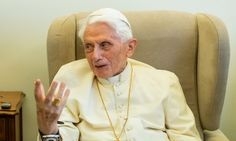
Extracts from Carol Glatz - Catholic News Service America, The Jesuit Review, 11 April, 2019
Retired Pope Benedict XVI, acknowledging his role in helping the Catholic Church come to terms with the clerical sexual abuse crisis beginning in the 1980s, wrote an article outlining his thoughts about what must be done now. Seeing the crisis as rooted in the "egregious event" of the cultural and sexual revolution in the Western world in the 1960s and a collapse of the existence and authority of absolute truth and God, the retired pope said the primary task at hand is to reassert the joyful truth of God's existence and of the church as holding the true deposit of faith. "When thinking about what action is required first and foremost, it is rather obvious that we do not need another church of our own design. Rather, what is required first and foremost is the renewal of the faith in the reality of Jesus Christ given to us in the Blessed Sacrament," he wrote. The pope's remarks, presented as a compilation of "some notes," were to be published in Klerusblatt, a German-language Catholic monthly journal for clergy in Bavaria. Several news outlets released their translations of the text early April 11. Given the February Vatican gathering of presidents of the world's bishops' conferences "to discuss the current crisis of faith and of the church," and given his role as pope during "the public outbreak of the crisis," the retired pope felt it appropriate he also help contribute "to a new beginning," he said......Pope Benedict added that he contacted Pope Francis and Cardinal Pietro Parolin, Vatican secretary of state, before releasing the article.....(more) Photo: The Tablet Daniel Karmann DPA PA Images 20190411
Extract from Mark Metherell, Concerned Catholics, Pearls & Irritationsm John Menadue Website, 11 April 2019
Opponents of reform of the Catholic Church in Australia risk doing enormous further damage to the church and its own community, a former member of the Royal Commission into Institutional Responses to Child Sexual Abuse , Robert Fitzgerald AM, says.Mr Fitzgerald is to address a forum of the Concerned Catholics of Canberra Goulburn group next Tuesday, 16 April, on the theme Governance for our Church – Out of hope, not fear. He says that while many in the church are grieving and struggling, now is the time to listen, reflect and act. “The Royal Commission has exposed not only the truth of abuse and wrongdoing in religious and other institutions, but has revealed deep flaws in the governance, leadership and culture of the Catholic and other churches,” Mr Fitzgerald says. The very integrity and legitimacy of the church leadership had been challenged. “Acknowledging the truth that has been revealed, the Church must be open to better governance, improved leadership and a culture that places the interest of the most vulnerable at its heart. “The current models of governing are losing legitimacy within the church communities and society. “Those in church who continue to deny the extent and impact of abuse and persistently hinder reform do enormous damage to the interests of the church and its community of believers. Their approaches failed us in the past and they will fail us into the future. “Critical to restoring legitimacy are models of governance that are based on the voice and participation of women and men , whether lay, religious or ordained. They must be based out of hope not fear. They must be designed to serve the people not institutional reputations and privilege.....(more)
Limited extract from ucanews.com reporter, New Delhi, subscription journal La Croix International, 11 April 2019
India. Police have charged Bishop Franco Mulakkal of Jalandhar with raping a Catholic nun multiple times, nine months after she complained in southern India's Kerala state. The police team probing the allegations filed charges on April 9 before a magistrate in Kottayam district, where the nun's convent is based.....(source)
Sending the document on Curia reform to episcopal conferences is an act of synodality, which is very important to the pope
Limited extract from Nicolas Senèze, subscription journal La Croix International, Vatican City, 11 April 2019
The draft apostolic constitution governing the workings and structure of the Roman Curia is to be sent for consultation to bishops' conferences around the world, the Vatican has announced. The April 10 announcement came at the end of a three-day meeting of the Council of Cardinals (currently the C6) that Pope Francis created in 2013 to drive his reform project. The document will be sent "in the coming days" to the presidents of....(more)
This is one of the first concrete outcomes of the apostolic exhortation Amoris laetitia
Limited extract from Félicité de Maupeou, subscription jounal La Croix International, 10 April 2019
France. Married for 17 years, Chantal, a divorcee and Benoît Vandenberghe, a widower, share with La Croix the unique story of their return to the sacraments. "This couple, deprived of the sacraments for many years, will receive communion once again today," proclaimed the priest at the beginning of the celebration. On Pentecost 2018, Benoît and Chantal walked down the nave alongside other members of the congregation in their Church in Eu, Normandy to receive the Eucharist. Neither of them made a "great fuss," but all were well aware of the day's significance. This is one of the first concrete outcomes of the apostolic exhortation Amoris laetitia, published three years ago. In Chapter 8 there is a footnote (no. 351) that encourages pastors to accompany divorced and remarried couples if they want to return to the sacraments. Benoît was a widower and Chantal a divorcee when they married in a civil ceremony seventeen years ago. As members of the Church, they knew that this meant renouncing the sacraments. In the ....(source)
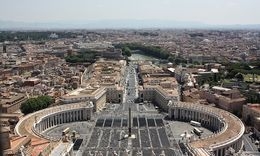
The governance of the Church is still locked into its monarchical past
Limited extract from Eric Hodgens, subscription journal La Croix International, 8 April 2019
A monarchical organization, powered by ideology, with promotion by patronage results in bad governance. The Catholic Church has a governance problem. Wilton Gregory has been appointed Archbishop of Washington, DC replacing Cardinal Donald Wuerl. While there will be some disappointed faces amongst younger bishops in the USA, most Catholic commentators are positive about the appointment. At 71 he is old for the job and has only four years till official retirement age. One factor may be a shortage of younger bishops who are in tune with Pope Francis. Therein lies the problem. A monarchical organization combined with appointment by patronage inevitably weakens an organization. The first rule of any Human Resources (HR) department is to get the best person for the job. This entails advertising the job, publishing an accepted set of criteria for......(source). Photo: La Croix International 20190408
'If the structure is more important than the mission, we will never get anywhere,' says priest who works on parish renewal'
Limited extract from Gauthier Vaillantm Subscription journal La Croix International, 8 April 2019
Comparing the current working of Catholic parishes with the sinking of the Titanic? It takes nerve to make that comparison. But that's what Father James Mallon did on April 5 while speaking at an event hosted by a parish in the southern suburbs of Paris. "The parish system as we know it is going to collapse," the priest warned. "The quicker we accept it, the sooner we will be able to develop something new." With his Roman collar, rolled up sleeves and a biting sense of humor, Father Mallon, a Canadian priest who specializes in "pastoral transformation," did not spare the large audience of 800 people, including....(source)

There were fewer Catholics in Australia in 2016 than in 2011, but they were more likely to have a higher education and more likely to have been born overseas than five years earlier.
The National Centre for Pastoral Research (NCPR) yesterday released the Social Profile of the Catholic Community in Australia, based on information contained in the 2016 Census. Census data already released outlined the drop in the number of people identifying as Catholic from 5,439,267 in 2016 to 5,291,834 in 2011. As a proportion of the total Australian population, the Catholic percentage dropped from 25.3 per cent to 22.6. The Social Profile, however, offers a much deeper understanding of the Catholic population on a range of measures, including education, employment, income, birthplace, language and disability. The drop in the number of Catholics is concerning, and the bishops are keen to understand what’s behind it and respond as positively as possible,” said Australian Catholic Bishops Conference president Archbishop Mark Coleridge. As with recent data on falling Mass attendance, we assume that the royal commission and related revelations about child sexual abuse, as well as a general drift away from religious practice and a broader trend of disaffiliation have all contributed to the changing demographics.” Archbishop Coleridge said the Social Profile is one of the key tools bishops use to understand the Catholic community and will be a help in planning for the Plenary Council. We can see from the report that Catholics today are more than twice as likely to have a university degree than 20 years ago, which may show how Catholic schools have better equipped people for tertiary study in recent decades,” he said. “Catholics are also more likely to have been born in a non-English-speaking country than the average Australian and their median age of 40 is a couple of years older than the general population. They’re less likely to be unemployed and have slightly higher mortgage repayments than their peers. All of this is important data as we plan for a very different future, given that any effective planning needs to be based on fact, not fantasy.”....(more) Photo: Graduate Catholics CathNews, Bigstock

A pattern of shameful actions that call into question the basis of the Church cuts very deep indeed and, if left unmet at that depth, can work its poison for centuries
Limited extract from Andrew Hamilton, subscription Journal La Croix International, 3 April 2019
The sentencing of Cardinal George Pell highlighted the dismay and soul-searching among Catholics at sex abuse and its devastation of the lives of victims and their families. It also brought home the depth of the crisis caused by clerical sex abuse in the Catholic Church. Although it still challenges understanding, a historical parallel may help illuminate it. Emperors Decius in 250 AD and Diocletian in 303 AD persecuted Christians in response to military reverses and perceived decline in Roman values. They called for a return to traditional values and religious practices and saw Christians as a subversive and alien force, much as Muslim people are seen by some in Australia today. They first targeted bishops and clergy, then all Christians, ordering them to hand over their sacred texts and vessels and publicly to offer sacrifice to the Roman gods. Those who refused were fined, tortured or killed. Many Christians, including bishops and clergy, had fled or apostasised (denied their faith by publicly offering sacrifice, handing over the sacred books or buying certificates of compliance).....(source) Image: Christian Martyrs Last Prayer Jean-Léon Gérôme La Croix International
Extract from Gerard O’Connell. America, The Jesuit Review, 2 April 2019
The Vatican today published a long but inspiring letter from Pope Francis called “Christ Is Alive.” In it, he speaks first of all “to young people” but also “to the entire people of God, pastors and faithful alike, since all of us are challenged and urged to reflect both on the young and for the young.” Commenting on the painful wounds of the abuse crisis that has been so disheartening to young Catholics, Pope Francis urges them not to abandon “our Mother when she is wounded, but stand beside her, so that she can summon up all her strength and all her ability to begin ever anew.” He reminded them that “in the midst of this tragedy, which rightly pains us, the Lord Jesus, who never abandons his Church, offers her the strength and the means to set out on a new path.” This dark moment, he writes, with the help of young people “can truly be an opportunity for a reform of epoch-making significance, opening us to a new Pentecost and inaugurating a new stage of purification and change capable of renewing the Church’s youth.” Pope Francis wrote that the exhortation was “inspired by the wealth of reflections and conversations” of last October’s Synod on Young People and sought to incorporate in it synod proposals that he considered “more significant” as well as other input from young people, including those who are not believers. He signed the document at the Marian shrine of Loreto in Italy on March 25, as a reminder that Mary was a young teenager when she responded to God’s call and so helped to change human history. Pope Francis opens the 210-page letter—officially known as a “post-synodal Apostolic Exhortation”—by reminding Christian young people that “Christ is alive! He is our hope, and in a wonderful way he brings youth to our world.”...(more)
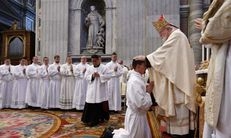
Extract from C. Colt Anderson & Christopher M. Bellitto, Commonweal, 1 April, 2019
As former seminary professors, we have looked upon the last several months of revelations about clergy sex abuse, cover-ups, and institutional infighting with the same disgust and sadness as our sisters and brothers—but we are not surprised. Though we honor and support the many good people who work and study in seminaries, we know that seminaries have played a significant role in the church’s current crisis. It is essential to understand how priests and thus, ultimately, bishops are formed, especially the way they are enculturated into clericalism from their first days in seminary. It is the air they breathe there. Clericalism in seminary formation is explicitly singled out as a problem in the Synod on Youth’s final document, approved in late October 2018, and it affects everyone in the church—it is a systemic and widespread problem. While not new in church history, of course, it is a particularly pressing concern during this time of scandal. Pope Francis has repeatedly targeted clericalism as the great enemy of ordained ministry today. You can easily see the career-climbers he warns about in seminaries. If you want to learn how to work your way into the clerical caste, watch these men. They are learning Italian, wearing cufflinks and cassocks, and don’t at all mind being called “Father,” even though they are still in studies. Along with our colleagues in other formation programs, we have easily singled out seminarians with scarlet fever: while there may be few vocations to the priesthood, there are plenty of ambitious young men aiming for a bishop’s miter.....(more) Photo: Priest formation Commomweal CNS Paul Haring
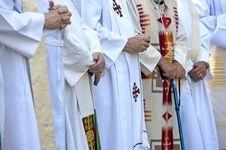
Extract from Stephen Bevans, Robin Ryan, America The Jesuit Review, 1 April 2019
.....Not all Christians are called to ministry, but all are called, as disciples, to participate in various ways—through the gift of the Spirit—in the mission of the church. “For the sake of the church’s mission, ministers guide and support members of the body of Christ, encouraging them to respond to the Spirit of their baptism,” the authors write. “The heart of ministry, therefore, lies in forms of service that aid the realization of the church’s mission.” Priests should be: competent preachers; inspiring leaders of worship and prayer; community leaders who collaborate with laity, especially women; worthy and competent representatives of the church; and practitioners of “pastoral charity.” Ordained Priesthood in a Missionary Church. In this ecclesiological context, Part 2 of the document outlines “A Profile of the Well-Formed Priest.” All Christians participate in the baptismal priesthood as disciples. Ministers help cultivate that discipleship. Ordained ministers do this by a special commission (ordination) that confers a particular character and conforms them to Christ the head of the Body. Baptism and confirmation confer characters that “establish the identity of believers as disciples, orienting them to share in the church’s mission.” In the same way, ordination confers a character that is also for mission, a character that empowers the one ordained for church leadership with the authority and spirit of Christ. Ordination “repositions” the priest within the community of faith for the sake of the community’s mission. The document quotes “Pastores Dabo Vobis,” 15: Priests “promote the baptismal priesthood of the entire people of God, leading it to its full ecclesial realization.” For the priest to do this effectively, the document outlines five characteristics of priestly ministry that should serve as goals of priestly formation. .....(more) Photo: Ministry types America The Jesuit Review 20190401 iStock

Extract from CathNews, ACBC Media Blog, 29 March 2019
Plenary Council 2020 president Archbishop Timothy Costelloe SDB says he and his fellow bishops have been “amazed” by the engagement of Australians in the Council’s opening stage. The Plenary Council’s Listening and Dialogue phase ended earlier this month, concluding a period of almost 10 months for people to share their stories and consider the question “What do you think God is asking of us in Australia at this time?” The National Centre for Pastoral Research has compiled statistical data and reported that more than 222,000 people participated in the Listening and Dialogue phase and made either individual submissions or had their voices captured through a group response. “The bishops knew the time was ripe for a defining moment in the life of the Church like a Plenary Council. What we didn’t know is how the people of Australia would embrace a process that hasn’t taken place for more than 80 years,” Archbishop Costelloe said. “We have been thrilled and amazed by the generosity of people and their willingness to speak about their experiences within the Church – both positive and negative – and to invest such energy in this first stage of the process.” Plenary Council facilitator Lana Turvey-Collins said while she observed enthusiasm for the Council when she visited communities across Australia, she couldn’t have predicted that would translate into 220,000 people participating in the Listening and Dialogue phase. “From the beginning, it has been clear that the success of the Council would depend largely on people’s level of engagement, but equally on the movement of the Holy Spirit,” she said. “This unprecedented – and quite overwhelming – level of response shows the people of God in Australia are deeply interested in shaping the future of the Catholic Church in this country.” National Centre for Pastoral Research director Trudy Dantis said the process of analysing the more than 17,000 individual and group submissions is under way. It will be completed over the next two months, with the national themes for discernment that have emerged to be announced in early June. “Each submission will be read and analysed by our team of research experts and we will use some of the best research tools available to assist that analysis,” Dr Dantis said. “Prayer and discernment is at the core of this process, particularly in this next stage of the journey, ensuring the Plenary Council is guided by the Holy Spirit.”....(More). Photo: CathNews, ACBC Media Blog
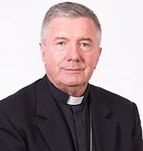
Extract from CathNews, RiotACT, 28 March 2019
Canberra-Goulburn Archbishop Christopher Prowse has endorsed new ACT legislation requiring all adults to report child sexual abuse, but will not direct priests to break the seal of confession. The Crimes Act (ACT) will now require any person over 18 who identifies or believes that a child is being abused to report the matter to police. Attorney-General Gordon Ramsay has made it clear that the new legislation applies to all adults without exception. Instead, Archbishop Prowse will direct priests who hear a confession from an abuser to “do all they can to bring the matter outside the confessional” to report it. He believed this could be negotiated without breaking the seal of confession. Archbishop Prowse said it would be difficult for priests to know who had made the confession of abuse since it frequently takes place behind a grille without names or identifying details. The proposed legislation requires any citizen to report matters of child abuse to the police. The Catholic Church believes this is a truly significant development since it will help capture child abuse not only in institutions but in the wider community. Church officials argued at the briefing that confessions of child sexual abuse would be rare and more likely to take place in jail after an offence has been proved. They believed that anyone making a genuine confession would have a sincere resolve to confess their crime without requiring a priest to make the report. Children disclosing abuse in the confessional would be told clearly that they had not committed any sin, and all possible attempts would be made to help and support them. Archbishop Prowse said that children needed “compassionate reassurance”, and spoke about the Church’s “heightened awareness” of how to handle such disclosures. This includes a diocesan-wide education program focused on reporting abuse to the proper authorities rather than in confession.....(more). Photo: CathNews, ACBC

Last month, Scaraffia called for ‘a complete revision of the Catholic culture and of the training of future priests'
Extract from Tina Beattie*, Th Guardian, 27 March 2019
The editor of the Vatican women’s magazine, Lucetta Scaraffia, has announced that she and her all-female editorial team are to suspend its publication. In a letter to Pope Francis, which she has also made public, Scaraffia explains: “We are throwing in the towel because we feel surrounded by an atmosphere of distrust and progressive delegitimisation.” The magazine, Donne Chiesa Mondo (Women Church World), is published by the official Vatican newspaper L’Osservatore Romano. Scaraffia blames increasing interference and control by the Osservatore’s new editor, Andrea Monda, and says a change in editorial direction has taken away her team’s autonomy. Describing the wide-ranging scope of the magazine, which includes contributors from different faiths as well as historical, biblical and theological perspectives, she wrote: “We often felt like miners who discovered precious metal strands and brought them to light and to the knowledge of all: a true human and universal richness, and in this sense ‘Catholic’.” Scaraffia has maintained her position as one of the few women with a significant voice in the Vatican by way of a precarious balancing act between speaking out on issues of concern while refraining from challenging church teaching. But in recent years she has become increasingly bold. Last month she wrote a strongly worded article on the sexual abuse of women, including religious sisters, by clergy, referring to “imposed abortions” and “children not recognised by priests”. She called for “a complete revision of the Catholic culture and of the training of future priests”. Soon after that, Pope Francis admitted that clerics had sexually abused and even enslaved nuns.....(more) Photo: The Guardian, Domenico Stinellis AP
• Tina Beattie is professor of Catholic studies at Roehampton University, London
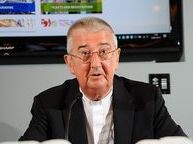
Extract from Sarah Mac Donald, The Tablet, 27 March 2019
Archbishop Diarmuid Martin of Dublin has called for a reduction in the number of dioceses in the Irish Church and for a radical overhaul in the training of priests. In an address on ‘The Church of the Future’ at St Michael’s Church of Ireland parish in Limerick last week, the Archbishop outlined his vision for renewal which would include a “reduction and rationalisation of dioceses” and a “revision of the arcane workings of the Irish Episcopal Conference”. Recalling the Apostolic Visitation to Irish dioceses announced by Pope Benedict XVI in his 2010 ‘Pastoral Letter to the Catholics of Ireland’ in response to the publication of the Murphy and Ryan Reports on Church abuse, Archbishop Martin said: “It is well known that I was unhappy with many aspects of the Visitation and its results.” He said that despite its good intentions, “the visitation froze the renewal of the Irish Church for some years” and the results were “disappointing.” A number of dioceses were left vacant for years and some of the ideas of the Visitation were put on hold, including the rationalisation of the number of dioceses. Archbishop Martin said: “We need to take a radical new look at the formation of future priests. A culture of clericalism is hard to eliminate. It did not come out of nowhere and so we have to address its roots in seminary training. There is no way we can put off decisions regarding the future.” His comments were made as the Irish bishops prepared to draw up a new programme for the formation of priests which would see seminarians spend more time working alongside priests in parishes.....(more) Photo: CNS Liam McArdle, courtesy WMOF
Extract from William Grimm* MM, Pearls & Irritations, John Menadue website, 27 March 2019
Half a century ago, the bishops’ conference of the United States commissioned an interdisciplinary study of the priesthood in that country. Key parts of it were led by two priests who at the time were celebrities in the Catholic community, Andrew Greeley the sociologist and Eugene Kennedy the psychologist. (Disclosure: as a seminarian I was office assistant to Kennedy in the early stages of the study.) The results of their work, especially the psychological part, showed a large majority of American priests to be dissatisfied as well as emotionally underdeveloped and therefore unable to develop healthy relationships. Their training and insertion into the clerical culture, which in many cases started as young as age 13, froze them into a perpetual adolescence. Instead of taking the studies to heart and working to improve the situation, as one would hope, the bishops, as one would expect, ignored the results of their own study. Greeley, noted for his pugnacity, responded, “Honesty compels me to say that I believe the present leadership in the Church to be morally, intellectually and religiously bankrupt.” Now everyone realizes how right Greeley was, as abuse and cover-ups by bishops around the world become headlines. Behind those headlines is the situation of which the social scientists led by Greeley and Kennedy warned. And the entire Catholic Church is suffering because of bishops’ failure to act then. It is well attested that sexual and other forms of abuse are really about the misuse or abuse of power rather than sex. For a believer, that should be no surprise. When the devil tempted Jesus with power, the tempter declared that power was his and his to distribute. And Jesus did not dispute that....(more)
*William Grimm MM is a New York-born priest active in Tokyo. He has also served in Cambodia and Hong Kong and publishes UCA News.

Extract from (Bishop) Pat Power*, Republished here Friday 22 March 2019
If ever repentance and conversion are needed in the Australian Catholic Church it is at this very moment. Significantly, this urgent call for a change of heart is not coming from our Church leaders but from the wider Australian community, the media and, most importantly, from deeply committed Catholics and those who share their hopes and aspirations. The harrowing revelations from the Royal Commission and, most recently, the conviction of Cardinal George Pell have rocked the Catholic Church in this country to its foundations. American Rabbi Shmuley Boteach is “spot on” when he says that Australians are deeply traumatised in the wake of all this. But before we start feeling sorry for ourselves and the loss of reputation, we must clearly focus on the untold damage done to victims of abuse. Innocent lives have been irreparably damaged by such abuse which has been perpetrated by God’s representatives. This has led to confusion, guilt and shame on the part of the young ones abused, preventing them from sharing this with parents and others who might have been able to help them. Often when they did open up, they weren’t believed. At least now that it is all out in the open, there may be some hope of bringing belated healing and reparation to those so harshly treated along with their families and loved ones. It goes without saying that it is not just individual “rotten apples” which have caused such destruction but a total system failure in the mentality and structures of the Catholic Church. Branch and root reform needs to be fearlessly undertaken if the Church is to return to the mission entrusted to it by Jesus. In 1996, I gave a talk in which I expressed my hopes for the Catholic Church. They were that it would be....(more). *In June 2012, Pat Power retired as Auxiliary Bishop of Canberra and Goulburn but continues to exercise a pastoral ministry. Photo: from cover of Joy and Hope, Pilgrim Priest and Bishop, Pat Power
Extract from CathNews, ABC News, 21 March 2019
Victorian Premier Daniel Andrews has flagged the idea of opening Parliament with a multi-faith ceremony instead of the Lord’s Prayer. At the start of every day, the Speaker and President lead the Lord’s Prayer in the Upper House and Lower House. Greens MPs wait outside for the prayer to finish before taking their seats and have long advocated for change. Crossbench MP Fiona Patten has also been calling for change, saying the Acknowledgement of Country should open parliament. Yesterday, the government referred the Lord’s Prayer to the procedures committee for review. “This is a secular society and most religious people I speak to are surprised to find out that this is how we start every day here,” .....(more)
The Editors. America, The Jesuit Review, 21 March 2019
Since the summer of 2018, the church has seen three cardinals face specific consequences in connection with sexual abuse. Understanding these already complex cases has been made more difficult by unclear canonical procedures, by decisions reserved to Pope Francis himself and—most vexing—by limited communication from the Vatican about what process is being followed on what timeline. Taken together, these cases illustrate why accountability for bishops has become a focus of the sexual abuse crisis in the church. Both process and communication need to be improved in order to rebuild trust among the people of God that the church is committed to healing and reform. A quick review of the cases of the three cardinals suggests the challenges the church faces.....(more)
The Church has lost trust, particularly difficult for priests over 75 who have invested in this institution and are now seeing their world crumbling
Limited extract from Claire Lesegretain, subscription journal La Croix International, 21 March 2019
How can we try to understand the pope's decision to refuse Cardinal Barbarin's resignation? Danièle Hervieu-Léger a sociologist of religion and research director at the École des hautes études en sciences sociales (Higher School of Social Sciences - EHESS) answers that question. The situation is difficult to comprehend, as much from an external point of view as from within the institution. Confusion did not begin with Pope Francis' decision, but with Cardinal Philippe Barbarin's appeal. Barbarin, in an effort to clear his name (and under pressure from his lawyers) decided to appeal the court's decision. In doing so, he has compromised his dignity as a bishop whose primary responsibility is to ensure the unity of the community entrusted to him....(more)
Extract from Catholic Weekly, 20 March 2019
Plenary Council 2020 will not have the power to enact anything contradicting the Church’s teachings on faith and morals, or to change the essentials of the Mass or ordain women to the priesthood, a Canon lawyer has said. Fr Ian Waters, a professor and lecturer in Moral Theology and Canon Law at the Catholic Theological College, told The Catholic Weekly that the Council’s legislative reach will be restricted to rules and regulations relating to discipline and “ordinary day-to-day governance” of the Church in Australia. While it does have the potential to change the future of the Church in Australia, it will not have the capacity to make changes that contradict the universal Church’s beliefs on faith and morals, he emphasised. “It can make rules and regulations for its own people, for Australians. What rules and regulations do we have in Australia for disciplinary, ordinary day to day governance, that are not contrary to what the Church teaches as acting on faith and morals?” he said. “We can’t pass legislation that would say Mary is not the mother of God or that there are four persons in the Trinity. “We can’t say that in Australia abortion is OK because the Church solemnly teaches that life begins at conception. “The Council can’t do anything that is against what the Catholic Church universally believes.” Plenary Council Facilitator Lana Turvey Collins told The Catholic Weekly she is confident that decisions made during the Plenary Council will be the product of deep prayer and discernment and that delegates will respond to the call of the Holy Spirit in their decisions. “The power of the Plenary Council is that it is a work of the Holy Spirit,” she said. “The agenda is still very much a work in progress, we have only just completed the Listening and Dialogue stage and are commencing analysis of this now.” Plenary Council Facilitator, Lana Turvey Collins. Because the Church in Australia is one with the universal Catholic Church “this Plenary Council is an opportunity for all of us to consider how to respond with creative fidelity to Christ and make decisions informed by the expressed sense of faith of the faithful in Australia, to cast a vision for how every person is called to live out their baptism in the life of the Church and ultimately for how … we work to bring about the kingdom of God Jesus spoke about in the Gospels.” Fr Waters said issues such as the ordination of women is not up for grabs. “The Council will not have authority to decide that women could be ordained priests; the Holy See judges that to be a matter of Church doctrine, and that only the Holy See can decide such matters,” he said. On celebration of the liturgy, he said while the Council won’t have the power to change the essentials of the Mass, it could change the language used. “One of the tensions in Australia always has been, do we speak English or American English?” he said. “When crafting language for the Mass, is it important that we use language with an Australian idiom? “I don’t know what the agenda is going to be at the Council because it hasn’t been published but it wouldn’t surprise me if that was the sort of thing …” he said...............Ms Turvey Collins said themes for national discernment will be announced at Pentecost.....(more)
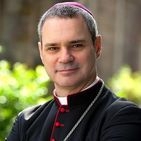
Extract from CathNews, Weekend Australian, 18 March 2019
The Church in Melbourne is experiencing its “darkest days” and is standing on “broken ground” in the wake of the sex abuse scandal, Melbourne Archbishop Peter A Comensoli has said. Archbishop Comensoli called for a new way for the Church, suggesting the legacy of St Patrick could be a model upon which the Archdiocese of Melbourne could rebuild. In a speech on Friday, he called on the Catholic faithful to embrace a future that moved away from the church’s institutional centre and relocated it among “our local neighbourhoods of grace”. Archbishop Comensoli said the Catholic presence in Melbourne had been great, presenting as a force for political good, underpinned by the foundations of St Patrick, who was the second bishop of Ireland, arriving in that country in 432AD. He did not specifically mention the jailing of Cardinal George Pell but made clear that the Church was reeling after the events of last week, urging a new way ahead for the faith. “I cannot deny that I also stand here tonight amid the darkest days of our proud history in this city,” he said. “An earthquake has occurred and the landscape has shifted permanently. What has been a source of pride and comfort, built by our forebears, no longer captures people’s minds and hearts, and leaves our children indifferent. At this time of deep crisis and humiliation, might it not be time to let go of the past and begin anew?” Archbishop Comensoli drew on the experiences of parishes outside of the Melbourne CBD that are flourishing, with sometimes thousands of people attending each week. “This is the proposal I want to put to you tonight, wounded but proud, shaken but determined,” he said. “That the future of the Christian faith in our city lies in letting go of the old landscape of a Catholic Melbourne and instead re-beginning the work of Patrick, replanting our city with the seeds of the Gospel, rediscovering a knowledge, language and pedagogy that can transform lives....(more)
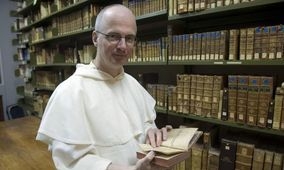
'Let us not be afraid and let the suffering linked to these well-founded critiques become an occasion of liberation,' says Swiss bishop
Limited extract from Céline Hoyeau, Switzerland, subscription journal La Croix International, 18 March 2019
How should we view the crisis that is currently challenging the Catholic Church? Since many Christians have suffered from sex abuse caused by priests and bishops, "shining a light on these scandals deserves a positive judgment from the outset," said Bishop Charles Morerod OP of Lausanne-Geneva-Fribourg. This is "welcome and necessary," said the 57-year-old Dominican in his Lenten message, because it is "the condition necessary for deep change."...(more) Photo: La Croix International Alessia Giuliani CPP Ciric

'Why shouldn't we pray for gender equality in the Church? It is most important that all discussions on reform be offered up to God,' says Sister Ruth Schönenberger
Limited extract from Christa Pongratz-Lippitt. Germany, subscription journal La Croix International
The leader of one of Germany's most important female religious communities has called into question the Catholic Church's exclusion of women from the ordained priesthood. "It is surely only natural for women to be priests and I cannot understand the reasons given as to why not," said Sister Ruth Schönenberger, head of the Benedictine Priory of Tutzing, the Bavarian motherhouse of a worldwide missionary order. "I am surprised that the presence of Christ has been reduced to the male sex,"...(more) Photo: La Croix Int Sr Ruth Schönenberger, YouTube
What is sacred is sacred to every human being, not just priests, says Archbishop Pascal Wintzer
Limited extract from Clémence Houdaille, subscription joirnal La Croix International, 15 March 2019
A French archbishop has announced publicly that he is in favor of ordaining married men and is calling on more reflection on the issue. Archbishop Pascal Wintzer of Poitiers announced during a March 8 broadcast on RCF radio that he is in favor of ordaining married men, calling for further reflection on "ways of calling married men to become priests." "I cho.....(more).
Extract from Terry Fewtrell, Pearls & Irritations, John Menadue blog, 15 March 2019
Inclusive, transparent, accountable, non-clericalist and humble – characteristics not usually associated with the Catholic church, but ones the church must adopt. That is the view of a large group of Canberra Catholics in a submission to the church’s Plenary Council being organised in the wake of the sexual abuse crisis. In the aftermath of the Royal Commission report, Catholics are confronting the reality that much of the behaviour and functioning of their church is not fit for purpose, and worse still, is contrary to gospel values. Catholics, rightfully, have been ashamed and disgusted by the efforts of church leaders who support a system that entrenches clericalism, denies truth and protects offenders. Accordingly, the submission by Concerned Catholics Canberra Goulburn makes clear to the bishops that the people of the church in Australia will no longer tolerate such failures of leadership. Change can and must happen and the document outlines how....(more)
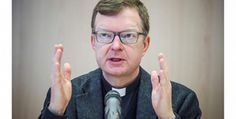
Extract from CathNews, Vatican News, 15 March 2019
The bishops who participated in the Vatican summit on the protection of minors in the Church last month have “taken some initiatives”, says safeguarding expert Fr Hans Zollner SJ. The president of the Centre for Child Protection told Vatican News that some bishops have revised their guidelines to find and implement ways of “cooperating with civil authorities”. Fr Zollner explained that the presidents of Catholic bishops’ conferences have sought the help of the Centre for Child Protection in the formation of Church personnel on the ground, after many of them were reduced to tears in hearing testimonies of survivors of child sexual abuse. In the three weeks since the end of the Meeting, Fr Zollner said some bishops have not simply “communicated what happened during those three and a half days” of the meeting, but are beginning to act. This, he said, was “the most important outcome that I could have hoped for”, because it proved that the bishops “received a message”. The message, he said, was: “Do everything you can to do justice to the victims. Listen to victims”, and do whatever you can to ensure that safeguarding is implemented “in your countries, in your dioceses and in your congregations”. Fr Zollner emphasised the importance of both the voices of the victims and the media. Thanks to them, “the topic of child sexual abuse within the Catholic Church has come to the surface and is now present all over the world”. “Nobody can avoid this anymore”, he said. “This topic is not something that will go away easily and fast.” Instead, he said, “it will stay with us and it will need much attention, over years and probably decades.”...(more) Photo: Cath News, Vatican Media ANSA Fr Hans Zollner SJ

Nearly half of (US) Catholics who seldom or never attend church have questioned whether they will remain
Limited extract from subscription journal The Tablet, Ruth Gledhill, 14 March 2019
Growing numbers of Catholics in the United States are questioning their commitment to the Church in the wake of the sexual abuse crisis. According to a poll by Gallup*, non-practising Catholics are those more likely to question their religion. However, the majority of Catholics are still confident in their parish priest, and in Pope Francis. Nearly one in four US Catholics, 37 per cent, say that the crisis has made them question whether they will remain members of the Catholic Church, up by more than a fifth from 2002. However, Gallup also reports: "It is unclear whether Catholics who are questioning their church membership will actually decide to leave the church. Many Catholics may consider leaving the church but ultimately decide not to do so, or they may have no intention of leaving but simply be responding to this question as a way to express their frustration with the way the church has handled the problem." The responses varied according to the existing level of commitment. Nearly half, 46 per cent, of Catholics who seldom or never attend church have questioned whether they will remain. By comparison, fewer than one in four, 37 per cent, of those who attend church monthly basis and one-fifth of those who attend weekly are questioning their allegiance.....(more) Photo: The Tablet, Ruth Gledhill Holy Name Cathedral Chicago *Gallup interviewed 581 Catholics in January 2019.
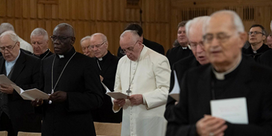
Extract from CathNews, Vatican News, 14 March 2019

Extracts from CathNews NZ, 14 March 2019
The lack of vocations to the priesthood is the reason Ohariu Catholic parish no longer has a resident parish priest. “I simply do not have anyone suitable to appoint as Parish Priest”, the Archbishop of Wellington told a 400 strong crowd, meeting at the Uniting Church, Dr Taylor Tce in Johnsonville. The Archbishop apologised for the quality of communication about the decision, telling the at-times vocal crowd the communication was not as good as he had wanted. Archbishop Dew dismissed criticism that he dumped the decision on the parish just two weeks before Christmas, when no one would notice. He said he had learned only very late in the year of Fr Fitzgibbon’s intention to retire.......Cardinal Dew informed the meeting of a report he received earlier in 2018 indicating a possible far-reaching way forward for the St Francis of Assisi Parish, but he understood the parish had not accepted the plan. The optimistic Archbishop said new circumstances meant resurrecting that plan, at least as a starting point. Describing the new parish team as “adventurous, creative people with initiative to lead the parish in response to community needs”, he thought that, along with the support of the Parish Administrator Fr Peter Roe SM, the St Francis of Assisi Parish “had an even better deal”. Cardinal Dew noted that lay-led parishes are not new.....(more)
Extract from Gerard O'Connell, America, The Jesuit Review, 12 March 2019
An Australian judge has sentenced Cardinal George Pell to six years in prison for the sexual abuse of two choirboys in Melbourne Cathedral in the late 1990s and has decreed that the cardinal has to serve three years and eight months in prison before he can be eligible for parole. The sentencing took place at the county court in Melbourne on March 13. It was broadcast live on national television. Chief Judge Peter Kidd, who delivered the sentence today, was the only one seen on camera, but Cardinal Pell was in the courtroom and the judge asked him to stand for the sentencing. A person present in the courtroom, which was packed with reporters and survivors of abuse, described the cardinal as looking “tired and almost disheveled,” without a tie or collar, and wearing an open black shirt. The total sentencing came to almost 12 years, but Judge Kidd reduced the penalty on four of the counts. The judge said he had given the cardinal “a shorter sentence” because of his age, “so that you can live the last part of your life in the community.” At the same time Judge Kidd said he had to impose a sentence that was a deterrent and a punishment for what he said was “intentional offending.” He told the cardinal that “you may not live to be released from prison.” He acknowledged that his case was unique given Cardinal Pell’s career in the church and his prominent position in Australian society.....(more)

Extract from Marilyn Rodrigues, The Catholic weekly, 12 March 2019
Around 600 Australian Catholic university students have called upon the country’s bishops to publically (sic) reject submissions to the Plenary Council 2020 which contradict Church teaching. The request is one of nine recommendations made by the Australian Catholic Students’ Association (ACSA) in its submission to the council’s Listening and Dialogue phase, which ended on Ash Wednesday. The Plenary Council must affirm the ageless teachings of Christ, the Church Fathers and the clear dogma of the Church and reject items for consideration by the Plenary Council which clearly breach those teachings,” they wrote. “The Church should not discourage young people following its rules in love, nor its priests from teaching them. “Therefore, the bishops of Australia should make it clear to the faithful about what may and may not occur at this Council and emphatically reject heterodoxical proposals.” Other recommendations of the student body led by president Christopher Wilks and gained through listening sessions held online and at various locations around the country focussed on spiritual formation of young people in schools and universities, with the student body calling for an increase in Eucharistic Adoration and promotion of the Liturgy of the Hours. The students representing Catholics at around 26 tertiary institutions asked for more resources at university Catholic societies and the addressing of the “deterioration of the Catholic identity at Church-run residential colleges in secular universities”......(more) Image: The Catholic weekly
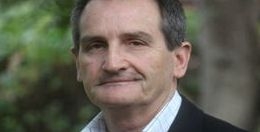
Why stay?
Extract from Francis Sullivan, Pearls & Irritations, John Menadue website,
11 March 2019
Since
the conviction of Cardinal Pell I have been asked why I remain a
Catholic. It is an obvious question. The extent of criminal behaviour and
the active cover up by bishops and religious leaders of perpetrators
has been breath taking. Ordinary Catholics have been played as mugs by
the Church leadership. Why stay? My
answer is why not! The abuse scandal has rocked my confidence in the
clericalist management of the Church but not my sense of the collective
journey I walk with other Catholics. I believe the “assembled walkers”
are the Church! I feel no compulsion to leave them. I feel participating
in a faith community a vital aspect of my self expression. Being
Catholic for me is less a religious tag or a member of a religion and
more a chosen pathway of personal and spiritual discovery best
undertaken in community. It is my way of living the Gospel. I
have found deep comfort in and direction from my faith tradition. I
feel nurtured in the sense that I am part of a pilgrim people, ever
moving into a better understanding of the divine in my life and an
appreciation of what that means for me as person in society. The
clerical sex abuse scandal is a crisis primarily about the culture of
the Church. It may well cause some to rethink their beliefs and
practices, but for me it has been a call to deepen my spiritual
practice. To commit to daily meditation and reflection. To draw on the
sacramental life of the Church and the richness of scriptural practices
like lectio divina. It has been a time to become mature in my faith
development, less dependent and literally more adult in my engagement
with the institutional Church. I have
benefited by being raised as a Catholic and being involved in social and
spiritual apostolates of the Church. I have found the wisdom of the
teaching and spiritual tradition a rich source of inspiration,
information and discernment. At the same time I understand that participation in the Church is a continuum of engagement......(more)
Extract from Melbourne Catholic, Plenary Council, Friday 8 March 2019
While people were still sharing their stories of faith and of God with the Plenary Council last night and the final numbers won’t be known for a couple of weeks, the Council’s Listening and Dialogue stage is considered a ‘landmark moment’ for the Catholic Church in Australia. Plenary Council 2020 president Archbishop Timothy Costelloe SDB expressed his gratitude for the faith, energy and generosity of people everywhere who have shared so honestly. The bishops and the Plenary Council team are deeply grateful to all people who have participated,’ he said. It is important to stop and acknowledge the significant moment that this is for the entire Catholic community. I have been very moved by the stories of faith, hope and resilience I have heard.’....(more)
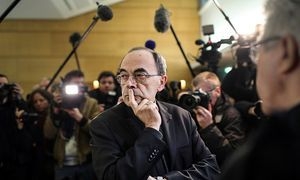
French Cardinal Philippe Barbarin resigns after conviction for abuse cover-up
Extract from SBS News, 8 March 2019
The
archbishop of Lyon Thursday announced he was resigning just hours after
being handed a six-month suspended jail sentence for failing to report
sex abuse in a case that has rocked the French Catholic Church and added
to the Vatican's woes. Philippe Barbarin, 68, is the most senior
French cleric caught up in the global paedophilia scandal which Pope
Francis, just two weeks ago, vowed to fight in an "all-out battle".
A court in Lyon, in southeastern France, ruled that Barbarin, a
cardinal since 2003, was guilty of failing to report allegations of
abuse of boy-scouts committed by a priest, Bernard Preynat, in the 1980s
and 1990s. The priest, who was charged in 2016, is expected for
his part to be tried this year. Barbarin, who was not present for
the verdict, said he "duly acknowledged the court's decision", but his
lawyer said it would be appealed. He is the third senior French
cleric to be found guilty of failing to report sex abuse. "I have
decided to go to see the Holy Father to hand him my resignation. He will
receive me in a few days' time," Barbarin told a news conference after
the verdict.....(more) Photo: Cardinal Philippe Barbarin SBS News AP

Father Helmut Schüller of Austria says the sex abuse crisis shows urgent need to 'desacralize' the Catholic priesthood and empower the laity
Limited extract from Christa Pongratz-Lippitt, Vienna, subscription journal La Croix International, 7 March 2019
Extract from CathNews, Sydney Morning Herald, 7 March 2019
Laws compelling priests to break the seal of Confession and report child sexual abuse to police or face criminal charges are due in the Victorian Parliament before the end of the year. The Andrews Government wants to remove legal privileges that shield priests from giving evidence about alleged crimes heard during the confession, arguing that the sacrament provides cover to pedophiles. Attorney-General Jill Hennessy said removing that legal privilege would take away one more reason to not report child abuse. Under the proposed laws, any priest who received a confession of child sexual abuse and failed to make a report would risk being charged. The proposed change to the state evidence act, which also covers doctor-patient relationships, was a key recommendation of the Royal Commission into Institutional Responses to Child Sexual Abuse, which concluded in December 2017. “What we saw in the national royal commission was a sense that many people who committed child sexual abuse thought that they could cleanse themselves by simply confessing it,” Ms Hennessy said. “And those offenders were then moved around into different places and were protected and the royal commission was really unequivocal that that protection resulted in years and years of abuse in many different communities.”....(more)

Extract from Gerard O'Connell, America, The Jesuit Review, 1 March 2019
The recent Vatican summit on the protection of minors ended on Feb. 24. Since then many have asked, “What’s next?” The question often comes from representatives of survivors’ organizations who were very active during the summit. At its conclusion, many expressed disappointment at the apparent lack of the “concrete measures” that Pope Francis called for in his opening talk but did not deliver in his closing address. They felt “let down,” according to Anne Barrett Doyle of BishopsAccountability.org. But the majority of bishops and religious superiors came away with a very different read on the summit and the pope’s closing talk. Several told me “a significant shift” in thinking had taken place within the meeting that augured well for their collective response to the grave abuse crisis that is eroding the church’s credibility and undermining its mission throughout the world. Archbishop Charles Scicluna, in an exclusive interview with America at the summit’s end, put it this way: “We could see people maturing in their reactions as the days went by.... They were an intense three days, but the experiences of prayer, the listening to victims, the inputs we had were emotionally charged, so there was not only information but also an appeal to our emotional intelligence.” The summit “spoke to the heart of people,” Archbishop Scicluna said. “I think that is where true transformation happens and where the motivation to do the right thing is born and develops.” Pope Francis called the meeting precisely for this purpose—to bring about a change of hearts, a conversion, a cultural change among bishops and religious superiors worldwide because he knows that without such a change all the papal decrees and changes in Vatican law are unlikely to achieve the desired goal of defeating sexual abuse inside the church. The summit focused on three aspects that are central to the role of bishops and religious superiors in addressing this crisis: responsibility, accountability and transparency. It also looked at the need for a collegial and synodal response at both the local and universal church levels to the abuse of minors.....(more) Photo: America, The Jesuit Review, iStock.jpg
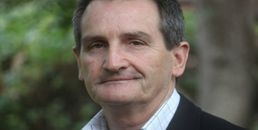
Extract from Francis Sullivan, The Sydney Morning Herald, 27 February 2019
Yesterday’s announcement of the conviction of Cardinal George Pell has been shattering for many and a relief for others. The fact that the most senior cleric in Australia has been found guilty is devastating on many levels. Not the least because he was such a high-profile proponent for the safeguarding children in the church and its provision of compensation to victims. The Cardinal is no stranger to controversy. He revelled in the culture wars of the church and few ever wondered what he thought on matters of politics, religion and social change. A lightening rod for discontent, the Cardinal soldiered through conflict after conflict with the resolve of an ideologue. His steadfast conservatism brought him institutional regard although it has been very divisive within the Catholic and wider community. He is every bit a personification of the institutional church and is seen by the public as its head in Australia. Now he is convicted of crimes he has always denied. No wonder the reception in the Catholic community is so mixed. The judicial process is yet to run its course. What can’t wait is real reform of the institutional church. And most tellingly, that reform cannot be left in the hands of bishops and religious leaders. For too long their chant has been that they are part of the solution, not the problem. This has been blown apart by the revelations of the royal commission and, if it sticks, the conviction of Cardinal Pell. The secrecy and obfuscation that has characterised the church’s approach to the clerical sexual abuse of children cannot remain the default position when shocking news like the Cardinal’s conviction arrives....(more)
Archbishop Mark Coleridge, Melbourne Catholic, Tuesday 26 February 2019
The news of Cardinal George Pell’s conviction on historical child sexual abuse charges has shocked many across Australia and around the world, including the Catholic Bishops of Australia. The Bishops agree that everyone should be equal under the law, and we respect the Australian legal system. The same legal system that delivered the verdict will consider the appeal that the Cardinal’s legal team has lodged. Our hope, at all times, is that through this process, justice will be served. In the meantime, we pray for all those who have been abused and their loved ones, and we commit ourselves anew to doing everything possible to ensure that the Church is a safe place for all, especially the young and the vulnerable....(source)
Archbishop Peter A Comensoli, Melbourne Catholic, Tuesday 26 February 2019
As is now publicly known, Cardinal George Pell has been found guilty of historical sexual crimes relating to two young people at St Patrick's Cathedral, Melbourne. This follows two trials, the first of which could not reach a verdict. While acknowledging the judgement of the jury, I join many people who have been surprised and shaken by the outcome of the second trial. I fully respect the ongoing judicial process, noting that Cardinal Pell continues to protest his innocence. An appeal against the verdict has been lodged. It is important that we now await the outcome of this appeal, respectful of the ongoing legal proceedings. All other charges relating to Cardinal Pell, except those subject of the appeal, have been discontinued. My thoughts and prayers are with all victims who have been abused by clergy, religious and lay people in the Archdiocese of Melbourne at this challenging time, and I renew my personal commitment to do all I can to ensure victims of such abuse in Melbourne receive justice and healing. At this time, I also acknowledge all in the Catholic Church who are walking with survivors and communities harmed by the scourge of abuse, and who are committed to building a culture of safety for our children and vulnerable people. At this time, may I assure you that I keep all involved in my prayer....(source)
Extract from Gerard O’Connell, America The Jesuit Review, February 26, 2019
The Vatican responded Cardinal George Pell’s conviction of sexual abuse of minors by announcing that “to guarantee the course of justice,” Pope Francis “has confirmed the precautionary measures that were imposed by the local bishop on Cardinal George Pell on his return to Australia, namely: while awaiting the definitive verification of the facts, Cardinal Pell is prohibited in a precautionary way from the public exercise of ministry and, as according to the norm, any contact whatsoever and in any form with minors.” The Vatican said the conviction is “a painful news that, we are well aware, has shocked very many persons, not only in Australia.” At the same time, “it reaffirmed maximum respect for the Australian judicial authorities.”
It said the Holy See “joined” the Australian Bishops’ Conference “in recognizing the sentence of condemnation of Cardinal George Pell in the first grade, and said it awaited the final outcome of the appeal.” It recalled that the cardinal has “reaffirmed his innocence” and “has the right to defend himself to the final grade.”.....(more)

Extracts from Barney Zwartz, The Age, 26 February 2019
So Cardinal George Pell – by far Australia's best-known church leader of the past 25 years, the highest-ranked Australian ever at the Vatican, a confidant of prime ministers – faces a jail sentence for child sexual abuse. The dispenser of God's grace (through the sacrament) has surely reached the nadir of human disgrace. At his peak, as archbishop of Melbourne, then Sydney, in the late 1990s and early 2000s, Pell seemed an irresistible force. Trenchant, combative, supremely confident and with an imposing presence, he was a robust and forceful spokesman for authoritarian Catholicism and conservative social issues. Such was his conviction and certainty, he relished being a polarising figure who was disliked by progressive Catholics and the many clergy whom he ruthlessly brought to heel when he thought them too liberal in their views or too flexible with the liturgy. His reward was the near-adoration of sections of the church, a huge public profile, and a senior Vatican post. His supporters admired his pugnacity at a time when most Christian leaders were reticent, and his willingness to defend what he believed in. He was a hard worker, committed to the church, extremely astute at church politics and, reportedly, genial company. His critics found him arrogant, ruthless – in both senses of relentless and lacking compassion – and a man who made protecting the institutional church his highest principle, over people, including abuse survivors......Pell was exactly the sort of resolute bishop beloved of popes John-Paul II and Benedict XVI because he shared their rejection of post-modernism and moral relativism. Pope Francis does, too, but he sees clericalism – the idea that priests are specially entrusted with guarding the church's tradition and teaching and deserve deference – as the church's biggest weakness, while to his predecessors it was the natural order. Francis calls it "a toxic sickness" and dislikes the inflexible dogmatism that was one of Pell's chief virtues to Francis's predecessors. But Pell's legacy is still prominent in the Australian Catholic Church, especially among the bishops appointed to key dioceses who take the same view of Catholicism. For example, it was a shock last year when his chief protege (in terms of churchmanship), Sydney Archbishop Anthony Fisher, got as many votes as head of the Australian Catholic Bishops' Conference as Brisbane's Mark Coleridge (who won on seniority). What now within the church? It presents an overwhelming challenge to the usually timid Australian bishops, who cannot publicly ignore the Cardinal's finding. How will they explain this to the faithful? Traditionally, they say the bare minimum – and this time it is hard to blame them. But they must say more.......(more) Photo: Stefan Postles Reuters

The Church's current response to sex abuse is still in its early stages, and that is not just the fault of the Vatican or the ecclesiastical hierarchy
Limited extract from Massimo Faggioli, United States, subscription journal La Croix International, 26 February 2019
"The age of deference is over," Lord Altrincham tells a still-to-be-enthroned and furious Elizabeth II in the tv series "The Crown." He then convinces the young queen to modernize her court, if not the monarchy itself. The scene could easily be applied to the Catholic Church and its hierarchy today. Just as political revolutions and cultural upheavals from the 18th century onwards impacted the divine rights of monarchs, so the clerical sex abuse crisis is taking down the divine rights of the Catholic hierarchy. The crisis is much bigger than a massive problem of corruption and cover-up. The scandal of sex abuse in the Catholic Church is not an isolated moment in history. Rather, it must be seen within a number of challenges that modernity has posed to institutional religion. On the horizon are huge, long-term consequences for the role and life of the Church. They include the following: the effects of transparency and accountability on organized religion; the ability of the Church to handle the psychology of indignation in the age of social media; and the huge re-negotiation of the relations between Church and State, as Australian Archbishop Mark Coleridge pointed out a during press conference at the Vatican's summit on clergy sex abuse. The Feb. 21-24 summit — officially called a "meeting on the protection of minors in the Church" — will stand as an important moment the history of institutional Catholicism. And while the most decisive part depends on follow-up to the four-day gathering, the summit itself has already offered an image of the Church that helps us understand the complexity of the crisis......(source). Photo: Vatican, La Croix International
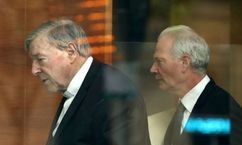
Extracts from Frank Brennan, Eureka Street, 26 February 2019
The suppression order in relation to Cardinal George Pell has been lifted. In December, a jury of 12 of his fellow citizens found him guilty of five offences of child sexual abuse. No other charges are to proceed. Cardinal Pell has appealed the convictions. The verdict was unanimous. The jury took three days to deliberate after a four-week trial. The trial was in fact a re-run. At the first trial, the jury could not agree. The trial related to two alleged victims, one of whom had died. Members of the public could attend those proceedings if they knew where to go in the Melbourne County Court. Members of the public could hear all the evidence except a recording of the complainant's evidence from the first trial. The complainant, who cannot be identified, did not give evidence at the retrial; the recording from the first trial was admitted as the complainant's evidence. The recording was available to the public only insofar as it was quoted by the barristers in their examination of other witnesses or in their final addresses to the jury, and by the judge in his charge to the jury. So, no member of the public has a complete picture of the evidence and no member of the public is able to make an assessment of the complainant's demeanour. The complainant's evidence at the first trial lasted two and a half days. He had been cross-examined for more than a day by Pell's defence barrister, Robert Richter QC, who has a reputation for being one of the best and one of the toughest cross-examiners in the legal profession. Pell did not give evidence, but a record of his police interview, denying the allegations, was in evidence. The complainant's evidence related to events that occurred back in 1996 or 1997 when he was a 13-year-old choir boy at St Patrick's Cathedral Melbourne. Most other witnesses had been choir boys, altar servers or Cathedral officials in 1996 when Pell first became archbishop of Melbourne. The complainant claimed that the first event, involving four charges, occurred after a solemn Sunday Mass celebrated by Pell in the second half of 1996. It was common ground between the prosecution and the defence that the dates to which these four charges must be attributed were 15 December 1996 or 22 December 1996. These were the dates on which the first and second solemn Sunday Masses were celebrated by Pell in the Cathedral after he had become archbishop in August 1996. The Cathedral had been undergoing renovations and thus was not used for Sunday Masses during earlier months of 1996.......Was the verdict unreasonable? Can it be supported having regard to the evidence? Those are questions for the appeal court. I can only hope and pray that the complainant can find some peace, able to get on with his life, whichever way the appeal goes. Should the appeal fail, I hope and pray that Cardinal Pell, heading for prison, is not the unwitting victim of a wounded nation in search of a scapegoat. Should the appeal succeed, the Victoria Police should review the adequacy of the police investigation of these serious criminal charges........When the committal proceedings against Pell first commenced in July 2017, Fran Kelly asked me on ABC Radio National Breakfast: 'Do you have concerns about this case, regardless of the outcome, and how it's going to affect the Church?' I answered: 'Fran, I think this case will be a test of all individuals and all institutions involved. And all we can do is hope that the outcome will be marked by truth, justice, healing, reconciliation and transparency. A huge challenge for my church, and yes a lot will ride on this case. But what is absolutely essential is that the law be allowed to do its work. And let's wait and see the evidence, and let's wait and see how it plays out. And let's hope there can be truth and justice for all individuals involved in these proceedings.' And that is still my hope....(more). Photo:Pell Cardinal Eureka Street 20190226, Robert Cianflone/Getty Images

Extract from Paul Collins, Pearls & Irritations, John Menadue website, 26 February 2019 Without a doubt the last twelve months have been Catholicism’s annus horribilis and, let me assure you, there’s still not much light at the end of the tunnel. 2018 was the year in which the abuse crisis came to a head and it has absolutely stymied the pastoral governance of the church. At first it was seen as an “Anglo” problem, but then reports of abuse appeared in Europe, Chile and other parts of Latin America. After several years of underestimating it, Pope Francis woke-up to the problem after he was deceived by church authorities in Chile and was forced into an abject apology in mid-2018. Now convinced it is a worldwide problem, he called presidents of bishops’ conferences to the Vatican last week for a three-day summit on transparency and abuse. What happened? Even before things got underway, two anti-Francis cardinals, Raymond Burke and Walter Brandmüller, claimed that the whole problem was that priest-abusers were all gay. “The plague of the homosexual agenda,” they wrote, “has been spread within the church, promoted by organised networks and protected by a climate of complicity and a conspiracy of silence.” There is not a scintilla of evidence to support this and Brisbane Archbishop Mark Coleridge, President of the Australian Bishops’ Conference, said these cardinals “are renowned for this kind of critique, which I…simply reject out of hand.” Spot-on! Then there was Theodore McCarrick. A week before the summit, the pope expelled the former Cardinal Archbishop of Washington from priestly ministry (he had already resigned from the college of cardinals), after he was found guilty of abusing seminarians and under-age boys. Next came Frédéric Martel’s book In the Closet of the Vatican, published the day the abuse summit began. Martel claims that the Vatican itself is riddled with closeted gay priests. While clear that there’s no connection between homosexuality and pedophilia, Martel says gay priests cover for each other and fear exposure....(more) Photo: Catherine Wiggins
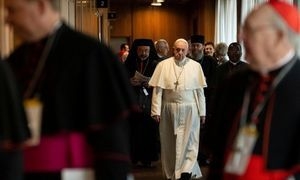
Pope Francis has succeeded in developing a much greater level of awareness among the world's bishops, many of whom who were a long way from sharing his vision
Limited extract from Nicolas Senèze, Rome, subscription Journa; La Croix International, 25 February 2019
Vatican City. Did Pope Francis' closing speech at the meeting of bishops conference presidents on child protection on Feb. 24 come as a disappointment? The long text he read out in the Sala Regia inside the Apostolic Palace did not in fact contain any significant new announcements. On the other hand, he had already warned well in advance against "inflated" expectations from the meeting.
A Church that admits its faults and sins. But the real point of his address had less to do with the concrete measures the Vatican has already started working on than the kind of Church that Pope Francis envisions. In how it responds to sex abuse by priests, this will be a very different Church from the one that existed only a few years ago. No longer will it be a besieged citadel but rather a Church genuinely in the world. Instead of identifying the cause of abuse as society's "moral decadence," the Church will now perceive it as more deeply rooted in evil, or "Satan" at....(source) Photo: La Croix Int Vatican Media Reuters.
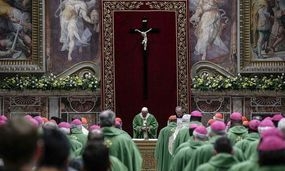
Extracts from From Gerard O’Connell, America, The Jesuit Review, 24 February 2019
In his closing talk to the Vatican summit for the protection of minors, Pope Francis offered a wide-ranging analysis of the plague of the sexual abuse of minors in the world and the Catholic Church. He committed the church to do everything possible to eradicate it from within the church itself and from society as a whole. “We are facing a universal problem, tragically present almost everywhere and affecting everyone,” Pope Francis said in a 30-minute talk at the end of Mass, which he celebrated in the Sala Regia, next to the Sistine Chapel, with the patriarchs, cardinals, bishops and priests who had participated in the four-day summit on the protection of minors.........The pope sought to locate the abuse of minors by clergy in the wider reality by showing that the sexual abuse of minors is widespread in the world. “It is difficult to grasp the phenomenon of the sexual abuse of minors without considering power,” he said, “since it is always the result of an abuse of power, an exploitation of the inferiority and vulnerability of the abused, which makes possible the manipulation of their conscience and of their psychological and physical weakness.” He urged all Catholics to help the church be liberated “from the plague of clericalism, which is the fertile ground for all these disgraces.” “I make a heartfelt appeal for an all-out battle against the abuse of minors both sexually and in other areas, on the part of all authorities and individuals, for we are dealing with abominable crimes that must be erased from the face of the earth,” the pope said.....(more). Photo America, Jesuit Giuseppe Lami/Pool Photo via AP
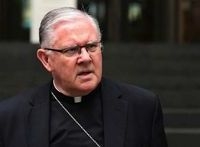
An Australian archbishop has warned a gathering of senior clergy in the Vatican, including the Pope, that the church has been “our own worst enemy” in failing to confront the abuse of children.
Extract from Nick Miller, The Age, 24 February 2019
Archbishop Mark Coleridge of Brisbane delivered the sermon at a Sunday morning Mass at the end of a four-day summit at the Vatican on the protection of minors in the church. In the Sala Regia, a grand antechamber to the Sistine Chapel, Coleridge said the church faced a revolution like the one it confronted when Copernicus revealed the Sun did not revolve around the Earth. He said the church had at times “preferred indifference” to sexual abuse “and the desire to protect the church’s reputation, and even our own”. “We have shown too little mercy and therefore we will receive the same,” he warned. He said pastors of the church had been given a power to serve. “Yet we can use this power not to create but to destroy and even in the end to kill,” he said. “In sexual abuse the powerful lay hands on the lord’s anointed, even the weakest and the most vulnerable of them… in abuse and concealment the powerful show themselves not men of heaven but of earth.” Those who challenged the church to see abuse and its concealment for what they really were, were not the church’s enemy, he said. Victims and survivors “have led us to the painful truth by telling their stories with such courage,” he said. “At times, however, we have seen victims and survivors as the enemy, but we have not loved them, we have not blessed them. In that sense, we have been our own worst enemy.” Coleridge urged the church to act to bring justice for abuse survivors. “A mission stretches before us – a mission demanding not just words but real concrete action," he said. “We will do all we can to bring justice and healing to survivors of abuse; we will listen to them, believe them and walk with them; we will ensure that those who have abused are never again able to offend. “We will call to account those who have concealed abuse; we will strengthen the processes of recruitment and formation of Church leaders; we will educate all our people in what safeguarding requires; we will do all in our power to make sure that the horrors of the past are not repeated and that the Church is a safe place for all.” This would take time but “we do not have forever and we dare not fail,” Coleridge said. The summit involves about 200 senior church leaders from around the world, almost all men. On Saturday the summit heard tough criticism of the church. Nigerian nun Sister Verinica Openibo said the clergy were hypocrites. “Why did we keep silent for so long?” she asked. "We must acknowledge that our mediocrity, hypocrisy and complacency have brought us to this disgraceful and scandalous place we find ourselves as a church. And one of the most experienced of the Vatican press corps, 64 year-old Mexican TV reporter Valentina Alazraki, told the bishops they must no longer “play ostrich”.....(more)

Illustrative of the Church's fear of revealing the truth is the case of Msgr. Joseph Punderson
Limited extract from Robert Mickens, Rome, subscription journal La Croix International, Vatican City, February 22, 2019
On the eve of the Vatican's summit aimed at getting the entire Church to face up to the ever-widening clerical sex abuse crisis, some in the media wondered if the meeting risked being overshadowed by other controversies. One was supposed to be the issue of gay priests -- whom traditionalist Catholics have scapegoated as pederasts, and a French author has sensationalized in a just-released book in which he claims the Catholic hierarchy and the Roman Curia are full of gay men who are either leading double lives or are actually homophobic and militantly anti-homosexual. Another looming controversy that was destined to detract from the abuse summit was the recent revelation that the Vatican has issued secret rules for priests who have fathered children. And yet another was the issue of religious women (nuns) who have been sexually abused and raped by priests and bishops, something the Vatican has tried to keep quiet for a number of decades. None of these controversies is directly related to the sexual abuse of minors; with apologies to our traditionalist brothers and sisters who are convinced that gay priests are prone to be child molesters. However, there is an issue that is related to the abuse summit. And it is one that very few people are talking about. It's the Vatican's lack of transparency in dealing with credibly accused predator priests working directly for the Holy See. Ensuring that all bishops and Church leaders commit themselves unwaveringly to a policy of transparency is one of the main objectives of the summit. But how can that happen when transparency -- and not just concerning sex abuse cases -- has rarely been one of the Vatican's prime virtues? External pressure leads to removal of Vatican officials accused of abuse........(source)
Vatican Summit on Clerical Child Sexual Abuse starts today, Thursday 21 January 2019
Ros Childs ABC TV News Interview today of Peter Johnstone, Convener Australian Catholic Coalition for Church Reform, on the CCSA Vatican Summit. (ABC TV)

Extract from Marilyn Hatton, Pearls & Irritations, John Menadue website, 21 February 2019
For years a small but expanding number of Catholics in Australia have been appealing for church reform and have struggled to gain attention from our bishops. Our prayers and entreaties for change in the clerical, male-dominated cloisters have fallen on unattentive ears. The wind is changing since the announcement by Archbishop Mark Coleridge of the Plenary Council in 2020/21. Recently when receiving best wishes and prayers from the renewal movement for Pope Francis’s summit with the bishops, Archbishop Coleridge responded promptly, with thanks and appreciation and an invitation to ”light a candle for us as we gather in Rome”. Now as the bishops from around the world gather at the Vatican to ponder how to respond to the hell of child sex abuse, recognising evidence of change, reform advocates are calling on the power of prayer as we launch a campaign of silent prayer, particularly in response to the invitation from our Australian representative, Archbishop Coleridge. During the February 21-24 Rome meeting we are calling for national silent prayer to support Pope Francis and the bishops. We expect the Rome meeting to focus on Australia, given the prosecution of two Australian bishops in connection with sex abuse (one of them since exonerated) and the ground breaking Royal Commission report into institutional child sex abuse which provided church leaders with a set of forensic and solidly-based recommendations for church reform.....(more)
Extract from J. A. Dick, Another Voice - Being a theologian, 20 February 2019
This is an early post because Catholic bishops and leaders from around the world will be in Rome, February 21 to 25, for a summit on preventing sexual abuse in the church. Someone asked me if I am afraid to comment about sexual abuse in the Catholic Church. No. Not at all. Off and on I have already written about it; but I will quickly summarize my concerns, because they are part of the current third millennial reformation. I don’t want to bore my readers however with a long post……
Acknowledge the Reality: The reality is serious and world-wide. Catholic priests, bishops, and religious have sexually abused children, adolescents, women and men. Some women religious, “sisters,” have become pregnant and some have been forced by churchmen to have abortions. The primary concern of too many in church leadership has been to cover up, deny, or ignore what is happening to “protect the good name of the church.” Accountability of bishops: Pope Francis has disciplined the 88 years old former Cardinal Theodore McCarrick. He is now “Mr. McCarrick.” I can think of some other bishops who should be disciplined. The organization Bishop Accountability makes a strong case for the laicization of Archbishop John Nienstedt of St. Paul-Minneapolis, Minnesota; Archbishop Anthony Sablan Apuron of Agaña, Guam; Bishop Aldo di Cillo Pagotto of Paraiba, Brazil; Bishop Roger Joseph Vangheluwe of Bruges, Belgium; and Bishop Joseph Hart of Cheyenne, Wyoming. Yes they should be disciplined. Frankly I have difficulties with the term “laicization.” Many still call it “a reduction to the lay state.” As a “lay” Catholic I find this derogatory, as if being lay is a lesser state in the church. Clericalism is an old boys club problem: ....(more)
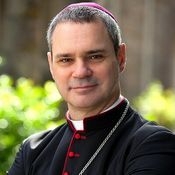
Extracts from Farrah Tomazin, The Age, 17 February 2019
Melbourne Archbishop Peter Comensoli has enlisted the LGBTI community to help the church set a new direction after years of scandal and internal unrest. In an unprecedented move that has divided some within the church, the Archdiocese this month invited gay Catholics to a 2½-hour meeting at which they discussed how the institution should change with the times. The session formed part of consultations for what will next year be the most significant conference Australian Catholic bishops have held in 80 years: the Plenary Council 2020. But insiders admit the decision to seek the advice of the LGBTI community "stirred unease" among some hardliners who feared the conference could result in radical change, at a time when issues such as the the ordination of female priests and the relaxing of mandatory celibacy rules are already hotly contested. Others viewed it as a positive step, hopeful that it would mark the start of a more inclusive relationship between the Archdiocese and LGBTI Catholics, following longstanding acrimony over same-sex marriage and religious discrimination in schools. "It's not about opening the door to LGBTI people of faith, because we're already here," said the Andrews government's Commissioner for Gender and Sexuality, Ro Allen, who attended the session. "It's about including us and embracing us as equal.".......The Sunday Age understands that participants made it clear they wanted to feel more welcomed by the church, although some were more sceptical than others about the institution's ability to change........Asked about the meeting this week, Shane Healy, the Archdiocese's director of communications, said: "This was an opportunity for LGBTI people to speak of their hopes and fears, their griefs and joys in the life of the Church in Australia. I think it was a really positive experience for all who attended." LGBTI Catholics have told the church they want to feel more welcome........Catholics for Renewal president Peter Wilkinson, who has warned for years that the church was facing an "existential crisis", said he was hopeful the Council would result in genuine reform. "I think people believe that there is a real chance that something might come out of this Council, although there is also a healthy dose of scepticism," he said...........(more)

On the eve of the clergy abuse summit in Rome, U.S. diocese says No. 3 official at the Vatican's 'supreme court' has been 'removed from ministry'
Limited extract from Robert Mickens, Rome, Subscription journal La Croix International, 15 February 2019
Pope Francis has got a real mess on his hands. In just a few days he will gather the presidents of the all the world's episcopal conferences in Rome to make them understand there must be "zero tolerance" for priests who sexually abuse minors. But on the eve of this important meeting, yet another long-serving Vatican official has been revealed as a perpetrator. Msgr. Joseph Punderson, who has worked at the Supreme Tribunal of the Apostolic Signatura since 1993 and its Defender of the Bond (DOB) since 1995, is expected to end three decades of service in Rome after his New Jersey diocese listed him among those "credibly accused of the sexual abuse of a minor." Punderson, 70, was one of 30 people on a preliminary list of offenders published on Feb. 13 by the Diocese of Trenton. The news comes only two weeks after Father Hermann Geissler, an Austrian priest accused of making sexual advances on a nun, resigned his post as section manager at the Congregation for the Doctrine of the Faith (CDF). CDF officials had known about the accusations against Geissler since 2014. But it is not clear who in the Vatican knew what about the accusations against Punderson or when they knew it. Allegations could go back decades. The Diocese of Trenton listed his status as "Removed From Ministry" but it did not indicate when that action was taken or when the accusations were made......(source). Photo: La Croix International,
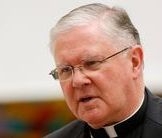
Extract from CathNews, The Catholic Leader, 15 February 2019
Brisbane Archbishop Mark Coleridge has urged lawmakers to support a broad, holistic re-examination of religious freedom, rather than a narrow focus on the treatment of students in schools. Archbishop Coleridge raised the hot-button issue last week as he led a five-member Church delegation presenting evidence to a parliamentary committee examining Labor Senator Penny Wong’s private member’s bill dealing with religious schools and their capacity to “discriminate” against students on the basis of gender identity or sexual orientation. “Our preference would be very strongly to set this particular issue about the treatment of students in schools within the much larger context … the broadest of which is the renegotiation of the relationship between religion and the state,” the Australian Catholic Bishops Conference president told the committee in Brisbane on February 6. “That’s a massive phenomenon that’s unfolding in this culture at this time and we don’t want to turn our back on it or put our head in the sand – we’re part of it. “Our preference would be very strongly to set this particular issue about the treatment of students in schools within the much larger context which helps us to understand the implications of any decisions which we or the parliament may make.”....(more) Photo: Coleridge ACBC

Extract from Michael J. O’Loughlin. America, The Jesuit Review, 14 February 2019
A new book claiming to expose what the author alleges is hypocrisy from leaders of the Catholic Church over issues of homosexuality will be published next week, coinciding with the start of a much-anticipated Vatican summit to discuss the church’s ongoing problems in addressing clerical sexual abuse—leading some to worry that gay priests will be blamed for the crisis. According to a press release from its publisher, Bloomsbury, In The Closet of the Vatican, by the French journalist Frédéric Martel, “exposes the rot at the heart of the Vatican and the Roman Catholic Church today.” Mr. Martel, also a sociologist, is reported to have spent four years conducting more than 1,500 interviews, including conversations with 41 cardinals and dozens of priests and other Vatican officials. That is according to the British journal The Tablet, which also says that the book claims 80 percent of priests working at the Vatican are gay, though not necessarily sexually active. Photo: America, The Jesuit Review
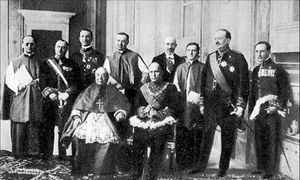
The wealthy can buy influence in politics, they must not be allowed to do so in the Church
Limited extract from Massimo Faggioli, subscription journal La Croix International, 11 February 2019
It was exactly 90 years ago that Fascist Italy and the Holy See signed the Lateran Treaty, thus settling the "Roman question" that had been created by the loss of the Papal States and the conquest of the Eternal City by Italian troops in September 1870. The treaty of Feb. 11, 1929 was a diplomatic triumph for both Benito Mussolini and Pope Pius XI. The fascist regime was assured the political support of Italian Catholics and the Holy See received minimal, but essential territorial sovereignty. This would give the papacy necessary freedom to govern the universal Catholic Church, following the Holy See's humiliating exclusion from the 1919 peace talks. Big money - an insidious threat to the Church's freedom. Ninety years ago, the Church's freedom was essentially secured and threatened by the power of a nation-state that then tried to control and subjugate the spiritual power. Today, the freedom of the Church is still at risk. This is true in some countries along the so-called "tenth parallel" in Africa and Asia where Christians face a growing threat to their freedom of religion. This threat is manifest and sign of our times. But the Church faces another sign of our times, which is more subtle and insidious. It is the threat that big money poses to the Church's freedom, presenting itself in the language of offering......(MORE). Photo: La Croix International
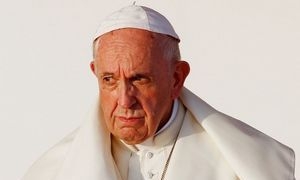
During the Vatican summit from Feb. 21-24, Francis is looking for 'a meeting of pastors, not a study congress'
Limited extract from Anne-Bénédicte Hoffner, Vatican, subscription journal La Croix, 7 February 2019
The presidents of the world's episcopal conferences as well as the primates of the Eastern Catholic churches in communion with Rome will take part in the Vatican summit from Feb. 21-24.
On Sept. 12, the Holy See announced that the pope had decided to call the summit, which will have an unprecedented format, "to discuss the prevention of abuse of minors and vulnerable adults." Pope Francis will take part as will representatives of victims and religious communities, several members of relevant congregations of the Rome Curia and finally "men and women lay experts in the field of abuse." However, the pope's prime aim is to sensitize and mobilize episcopal conference presidents on the issue. Why this priority? A former director of Holy See Press Office offered this reason in November, 2018: The meeting "primarily concerns the bishops" because "they are largely responsible for this serious problem." Concern to avoid scandal. "For a long time, we believed that the problem was simply that of 'bad priests' who abuse," said Father Stéphane Joulain, a White Father specializing in working with persons who have committed sexual assault. "It is now clear that the pope regards the problem as systemic," he said. "The crisis is also a result of the failure of the bishops to deal with these affairs and their concern to avoid scandal." The program for the three day conference confirms this analysis....(source) Photo: La Croix Int. Henry Romero Reuters Francis Pope serious La Croix Int Henry Romero Reuters
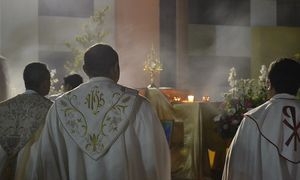
A seminar sponsored by Boston College addresses priestly formation
He came up with the idea of a Plenary Council, an opportunity for the Australian Church to reform itself
Limited extract from Gauthier Vaillant, Australia, subscription journal LaCroix International, 6 February 2019
In May 2018, the Archbishop Mark Coleridge of Brisbane, 70, was elected as head of the Australian Bishops Conference. The conference is to organize a Plenary Council in 2020 in order to reform the Australian Catholic Church that has been undermined and discredited by cases of sexual abuse. This is the fifth of a seven-part series profiling heads of bishops' conferences. At the beginning of 2017, the report of the Royal Commission into Institutional Responses to Child Sex Abuse in the Australian Catholic Church was released. Its figures were staggering: almost 4,400 cases of child sex abuse recorded between 1950 and 2010 and more than 1,800 perpetrators identified: that is, 7 percent of the Australian Catholic clergy....(source)
Extracts from Barney Zwartz, CathNews, source The Age, 6 February 2019
A recent study into Australian teens’ attitudes to religion made headlines for its negative findings – that 52 per cent of teens do not identify with any religion and only 37 per cent believe in God, writes Barney Zwartz. Source: The Age.
The Australian Generation Z study by academics from the ANU, Deakin and Monash universities, released late last year, found that 38 per cent identify as Christian, with Muslims (3 per cent), Buddhist (2 per cent), Hindu (1 per cent) and other religions (2 per cent ) totalling 46 per cent. Two per cent weren’t sure. The authors specified that not identifying with any religion did not necessarily mean no faith or spirituality, but that they did not see themselves identifying with any particular group. They found that 58 per cent of teens aged 13 to 18 never attend any worship service and only 12 per cent attend weekly. I may be wearing rose-tinted glasses, but I think these findings are exactly what one would expect, and not desperately negative for religion. Despite the 52 per cent of “nones”, fewer than a quarter (24 per cent) reject the idea of God, while 37 per cent do believe in God and another 30 per cent believe in a higher being or life force (the rest are unsure). Does it matter if Christian faith has lost its critical mass in Australia? One of my highest principles is freedom of conscience in religion, including freedom to reject religion, and I readily agree that one does not need religion to be a kind or good person. After all, many people reject religion for perceived moral reasons. And yet … Christianity, with its focus on love of God and neighbour, expands the moral imagination, the social conscience and awareness of others. I have often argued that people motivated by Christianity have immeasurably enriched Australia. So I regret that the DNA of Christian virtues is receding in the general culture that shapes today’s teens....(more)

Extract from CathNews, source The Australian, 4 February 2019
The Church in Melbourne has invited “all LGBTIQA+ Catholics, Christians and the broader LGBTIQA+ community, family, friends and supporters” to a “safe and inclusive” Plenary Council conversation this week. The gathering will be held on Wednesday night, in partnership with the Andrews Government and Acceptance Melbourne, which describes itself as “open and affirming community” supporting “Catholics who identify as lesbian, gay, bisexual, transgender, intersex and queer”. The meeting will be part of an ongoing national consultation process being undertaken by the Church across Australia, known as “Plenary Council 2020”. Melbourne Auxiliary Bishop Mark Edwards, who will attend, said the gathering was “a bit sensitive” following recent disagreements over issues such as same-sex marriage. But he said contrary to concerns raised in some Church circles, Catholic teachings on morality were not up for grabs. Similar meetings have been held throughout the country, including in jails and in schools,” Bishop Edwards said. He said the main role of Acceptance and the Victorian Government in the exercise was to encourage participants to attend. He said attendees would be divided into small groups, to discuss one main question: “What do you think God is asking of us at this time?” Bishop Edwards said he would be interested to hear whether attendees felt well accepted in Church communities or “a bit marginalised”, at a time when Pope Francis was urging the Church “to reach out to all”. Discussions could also focus issues such as a greater role for women in the Church and religious education, he said.....(more) Photo: Cathnews, Bigstock

Extract from CathNews, 31 January 2019
Plenary Council president Archbishop Timothy Costelloe SDB says he’s expecting another flood of responses from across the country during the final five weeks of the “Listening and Dialogue” phase of the Council. Source: ACBC Media Blog. In the eight months since the Listening and Dialogue period commenced at Pentecost, more than 40,000 people have either made a submission or participated in a group discussion that culminated in a submission. Given it’s more than 80 years since the last Plenary Council in Australia and given, too, the changes in the Church and society since then, it was impossible to know how many people would take part in this historic process,” Archbishop Costelloe said. “To stand here, five weeks from the end of this pivotal opening phase, it is both exciting and humbling to have heard from such large numbers of people and for them to have shared their stories of faith and hope, but also their stories of despair and heartbreak........... “We knew that many people who have a longstanding connection with Catholic life and culture, if not the weekly ritual of the Church, would attend Christmas Masses and welcome the opportunity to consider the question, ‘What do you think God is asking of us in Australia at this time?’,” she said. Ms Turvey-Collins said while the Listening and Dialogue phase will conclude on Ash Wednesday (March 6), collaboration – under the guidance of the Holy Spirit – will be a constant throughout the three-year journey. She said the National Centre for Pastoral Research will identify key themes that have emerged during the Listening and Dialogue period. They will be the focal points for the next step in the process, the Listening and Discernment phase......(more) Photo: CathNews, ACBC Media Blog, Listening and Dialogue session WA CathNews
Extract from CathNews, CNS, 31 January 2019
The joyous harmony of people coming together from so many different nations for World Youth Day stands in sharp contrast to today’s “sad” situation of confrontational nationalist feelings, Pope Francis said. “It is a sign that young Christians are the leaven for peace in the world,” he said at his general audience yesterday in the Vatican’s Paul VI hall. The Pope dedicated his weekly reflection to his January 23-27 trip to Panama to celebrate World Youth Day. The hundreds of thousands of young people from five continents who attended the events “formed a great symphony of faces and languages,” he said. “To see all the flags flying together, fluttering in the hands of young people, happy to encounter each other is a prophetic sign, a sign (that goes) against the tide of today’s sad tendency toward confrontational nationalist sentiments that erect walls, that close themselves off from universality, from the encounter among peoples,” he said. He praised the enthusiasm and prayerful reverence young people showed at the many events and recalled the dedication he saw on the faces of many who declared themselves open to God’s will and ready serve the Lord. “As long as there are new generations able to say, ‘Here I am’ to God, the world will have a future,” he said.....(more)
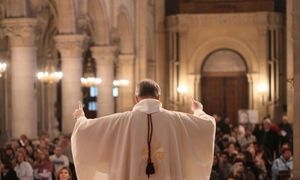
Many laypeople remain convinced that an 'interior renovation' of the baptized will not suffice to remedy the clerical abuses of power condemned by the pope
Limited extract from Anne-Bénédicte Hoffner, subscription journal La Croix International, 31 January 2019
Laypeople and priests, during a workshop in France, have reflected on their experience of the exercise of authority in parishes and dioceses, highlighting the lack of regulations regarding governance in the Church. The Catholic Institute of Paris hosted the training workshop on "Governance in the Church: Who decides and why?" on Jan. 28. Fifty priests and laypeople gathered to tackle the question. Father Bruno Becker, who is responsible for formation programs in his diocese, is looking for proposals on how to build a "less clerical Church." Having twice been a member of a parish animation team, a participant wants to understand why her initial experience was so rich, being based on "collegiality and co-responsibility"....(source) Photo: La Croix International,
Extract from Eric Hodgens. Peals & Irritations, John Menadue website, 30 January 2019
Culture Wars are a feature of today’s political life. The Catholic Church has likewise been through the wars. Here are some features of the last fifty years. A clash of cultures was graphically dramatized in 1968 when Paul VI published Humanae Vitae. It was a major moment in a tumultuous year. Europe was split over the Vietnam War. Student riots paralysed Paris and alarmed a young theology professor in Tubingen, Joseph Ratzinger, into retreat to a fearful conservatism. The baby boomer generation was rejecting old certainties and exercising new freedoms, especially sexual, that alarmed their elders. Paul’s condemnation of contraception was accepted or rejected along the lines of this cultural divide. The repercussions are still being felt 50 years later. And the focus of the debate is sex. Negativity on sex, which has dogged the Church in various ways from its earliest days, took centre stage again. The papal voice has never had the same authority since Humanae Vitae. It was Paul VI’s seventh encyclical in four years– and his last. Ten more years without encyclicals. Seeds of division were sewn in the Church during Vatican II. The open-up group won hands down at the council, but the stay-closed group bided its time. Paul could not cope with confrontation and shuttled between promoting the new and pacifying the stay-puts. This slowed, but did not stop, the reform. The 1978 arrival of John Paul II reversed the flow. Restoration replaced the reform. This widened and consolidated the division. And, unlike Paul VI, he was a warrior who would act on his opinions. Culture warfare had arrived within the Church. Sexuality was one of JP II’s dominant preoccupations. He re-asserted opposition to contraception and began a six-year exposition of his Theology of the Body at his Wednesday audiences. This was an exercise in apologetics – an attempt at rational explanation for his position on human sexuality....(more)
A local parishioner is seeking support to hold a national assembly of the laity in Adelaide next year in order to give lay men and women a more united voice on the future of the Church.
Extracts from Lindy McNamara, Southern Cross, 30 January 2019
The “grassroots meeting” is being proposed by John Sabine, a parishioner from the Dulwich/Burnside community, who described it as a chance for the laity to “get their act together” and determine who would be responsible for actioning change in the Church. “The Catholic Church today is in crisis; throughout the Universal Church there are calls for change. We, the laity, are everywhere being called upon to admit our part in the problem and to do something about it. “The Australian Catholic Bishops Conference has declared a Plenary Council to be called for in 2020/2021… this is entirely a clerical response. We, the Australian Catholic laity, have decided to act, to stand up and be counted,” Dr Sabine said. He added that the “desired outcome” of the assembly would be “for an understanding of, and the creation of, an effective voice for the laity in today’s Catholic Church in Australia”.........“In the lead up to our 2020 Plenary Council much has been made about the laity needing to step up and be counted. For this to happen the laity needs to know more about what the problem is and how they, collectively and individually, might respond to it. What needs to be done and who needs to do it.” In particular, Dr Sabine believes those laity who are formally invited to participate in the Plenary Council will need a much broader perspective than that of their own personal experiences if they are to be considered truly representative of “the laity” in Australia. “The proposed assembly is not intended to be a talkfest, but rather an attempt to determine what we all need to be doing and who needs to be doing it,” he explained. His personal opinion is that such work needs to start at the parish level. “The laity can’t expect to be fully active in the running of the whole Church if they don’t participate actively in running their own parish. Properly constituted and effective pastoral councils at parish, diocesan and national levels, as advocated by Vatican II documents, would be a useful start.”....(more)
Extract from Media release, Concerned Catholics Canberra, 29 January 2019
Professor John Warhurst AO, Chair of Concerned Catholics Canberra Goulburn, has been appointed to a governance review panel on a key Church body tasked with overseeing the Catholic Church’s response to the Royal Commission into Institutional Responses to Child Sexual Abuse. The Implementation Advisory Group was established by the Australian Catholic Bishops Conference and Catholic Religious Australia shortly after the Royal released its final report in December 2017. Professor Warhurst sa ys he is looking forward to working alongside other members of the review team convened by t he Hon Neville Owen, former Chair of the Truth Justice and Healing Council. “In their response to the Royal Commission released in August last year, the Australian Catholic Bishops Conference and Catholic Religious Australia accepted the Royal Commission’s recommendation that the Church reviews its governance practices ,” Professor Warhurst said . “It’s encouraging to see the IAG has made this review a priority by appointing this panel. “Many of the Royal Commission’s findings identified the power of the bishops, the absence of transparency and accountability, and the ad hoc approach to diocesan structures (to name a few) as serious impediments to what the community might expect of a significant institution in Australia in the twenty first century. “ This review is a n historic opportunity to establish nationally consistent mechanisms in local parishes and dioceses to enable g reater accountability and to ensure lay people, especially women are involved in decision making at all levels of the Church. “Many crucial governance processes, including the appointment of bishops, have been conducted behind closed door s for too long. “ I am confident that this review will expose the need for grass roots reform and lead to significant change in the way the Church conducts not only its business practices, but many of the cultural issues which have been identified as central to the abuse scandal ,” Professor Warhurst said.....(more)
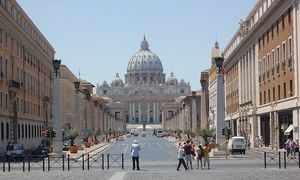
The move is being seen as an exercise in 'damage control' in the run-up to the Vatican's abuse summit
Limited Extract from Robert Mickens, Rome, Vatican City, Subscription Journal La Croix International
A Vatican-employed priest who was accused in 2014 of making sexual advances on a former nun during confession, has officially resigned his post at the Congregation for the Doctrine of the Faith (CDF) where he had worked for nearly 26 years. Father Hermann Geissler FSO, a member of a mixed male and female religious community called the Spiritual Family "The Work" (Familia spiritualis opus), resigned on Monday. IIt was apparently an effort at damage control in the run-up to the abuse summit Pope Francis will hold from Feb. 21-24 in Rome with presidents of the world's episcopal conferences....(source) Photo: La Croix International.
Layperson to take charge of Munich archdiocesan services
Measure seen as not simply a response to the drop in the number of priests but as highly 'symbolic'
Limited extract from Anne-Bénédicte Hoffner, Germany, Sibscription journal La Croix International
In
a major recent interview with the German Catholic news agency KNW,
German Bishops' Conference president, Cardinal Reinhard Marx of Munich,
who heads one of Germany's largest dioceses, let slip the surprise news
that the new director of the diocesan curia may well be a layperson —
man or woman. "We began reflecting on
this several years ago when my vicar general declared that 80 percent of
his work could be done – possibly even better – by a layperson," he
said. Asked about the "qualities" he is seeking from the future
candidate, Cardinal Marx noted that he is "still working on a post
description." "It is clear that
managing such a large institution requires management experience, legal
expertise as well as the capacity to organize and delegate," he said.
"There surely must be a woman or man who has that experience.".....(source)
Extracts from Gerard O’Connell, America The Jesuit Review, 28 January 2019
.....The Possibility of Ordaining Married Men (Viri Probati) As Priests
There has been much discussion as to whether Pope Francis might allow the ordination of mature married men to be serve as priests in places such as Amazonia. When asked on the plane whether, following the tradition of the Eastern Catholic churches, he might allow married men to be priests, Pope Francis said: “In the Eastern Catholic churches, they can do it. They make the choice between celibacy or marrying, before they’re ordained into the diaconate. When it comes to the Latin Rite, however, a phrase said by St. Paul VI comes to mind; he said, ‘I would rather give my life than to change the law on celibacy.’ He said this at an even tougher time [than today] in 1969-1970.” Pope Francis declared, “Personally, I believe that celibacy is a gift to the Church. Secondly, I’m not in agreement with allowing optional celibacy. No!” But he added, “there could only be a possibility in these far, faraway places, I think about the islands in the Pacific; it’s something to think about when there’s a pastoral need, there the shepherd has to think about the faithful.”.........The Vatican’s Sex Abuse Summit on Child Protection. A reporter recalled how at the lunch with young people last Saturday, he spoke to one of them, a young American woman, who spoke about the sex abuse scandal and how many Americans have lost faith with the church over this crisis. In the light of this situation, he asked Francis what hopes he has for the February summit. Pope Francis responded by disclosing that “the idea (for the February meeting with the presidents of the bishops’ conferences) was born out of the C9,” or the Council of Cardinal Advisors, the group of nine cardinal advisors that he appointed soon after becoming pope. He said the idea emerged, “because we saw that some bishops didn't understand [the problem] well, or didn't know what to do or they did something good or something wrong” and so “we felt the responsibility of giving them a ‘catechesis’ on this problem to the bishops' conferences.” He stated: “that is why we convoked the presidents (of the bishops’ conferences).” ......He then went on to explain what would happen at the February summit. There will be “a catechesis” to help them first of all “become conscious, become aware of the tragedy caused when perhaps a boy or a girl has been abused.”.......He explained that the main thing at the February meeting is that “before thinking about what should be done, they first must be aware.” Then, “there will be prayer, there will be some testimonies so that they may be made aware and some penitential liturgy, to ask forgiveness for the whole church.”.......Significantly, however, he sought to lower the expectations for the February meeting. He told reporters: “allow me to say, that I perceived inflated expectations. We have to deflate expectations to these points that I have made because the problem of abuse will continue, it is a human problem, a human problem [that is] everywhere.” ....(more)
Extract from Carol Glatz, Catholic News Service, 24 January 2019
VATICAN CITY (CNS) — Since the work of child protection must continue after the February meeting at the Vatican on safeguarding, one organizer said they plan on creating a “task force” with teams on every continent. The task force would be just one of a number of “concrete measures that we want to offer the bishops of the world,” Jesuit Father Hans Zollner told the Vatican newspaper, L’Osservatore Romano Jan. 24. “One of our main ideas,” he said, “is that this encounter is another step along a long journey that the church has begun and that will not end with this meeting,” which will bring presidents of the world’s bishops’ conferences, the heads of the Eastern Catholic churches and representatives of the leadership groups of men’s and women’s religious orders to the Vatican Feb. 21-24. A task force made up of child protection experts “will probably be instituted in the various continents where the church is present,” and they will travel from place to place, said Father Zollner, who is a member of the meeting’s four-person organizing committee, president of the Centre for the Protection of Minors at the Pontifical Gregorian University and a member of the Pontifical Commission for the Protection of Minors. “They will be able to find out about the guidelines that the bishops’ conferences are about to implement, what point they are at in this process and what they may need,” he said....(more)
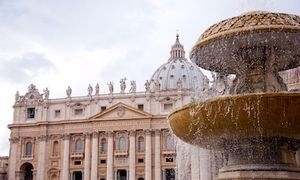
The last several weeks have seen a steady rehabilitation of key Vatican Radio personnel
Limited extract from Robert Mickens, Rome, subscription journal La Crois International, 18 January 2019
Vatican City. Only months after Msgr. Dario Viganò was put in charge of reforming and consolidating the various branches of the Vatican's communications department, the Milanese priest set about demolishing the organization's most valuable media asset, Vatican Radio. Viganò was made prefect of a newly created Secretariat for Communication in June 2015 and tasked with implementing a reorganization plan drawn up by a special media committee led by Lord (Christopher) Patten of Great Britain. The idea was to better coordinate the vast resources of some 650 people who had long worked in nine separate and independent offices involved in the various sectors of internal and mass communications. Vatican Radio, which was founded by Pius XI in 1931 and had grown to employ over 400 journalists and sound technicians, was the largest of these agencies. With subsections representing nearly 40 linguistic groups, it had an internationalized and well-formed workforce that was unparalleled at the Vatican. It should have been the launch-pad and most important resource for the media reform. Instead, Msgr. Viganò all but gutted it. And he did so in a way that left deep wounds that have not been healed. The first major blow to "the pope's radio" came in February 2016 when Father Federico Lombardi retired after more than 25 years of service, first as the director of programming and, then, as the radio's overall head. The day after the Jesuit stepped down, Msgr. Viganò held a meeting with all the radio's personnel at which many had hoped the new prefect would offer details of the media reform......Instead, he spent the first five minutes in his hour-long talk criticizing Lombardi and the Society of Jesus, the religious order that had run the radio since its establishment....(source) Photo: Vatican
Extract from Christopher White, National Correspondent, Crux, 16 January 2019
NEW YORK - Members of Pope Francis’s study commission on women deacons spoke publicly for the first time Tuesday, saying the pope has their report and expressing confidence that when the moment comes, he’ll make the right call. “He will know the time to say something,” said Phyllis Zagano, a senior research associate-in-residence and adjunct professor of religion at Hofstra University, who served on the commission. In the meantime, Zagano suggested that rank and file Catholics also have a role to play in the discussions around the subject. “It’s up to the Church to make noise,” she said, while also warning that “to delay a positive answer” on whether women can serve as deacons “is a negative answer.” Zagano’s remarks came during a panel discussion on “The Future of Women Deacons: Views from the Papal Commission and the American Pews,” at Fordham University’s Center for Religion and Culture and live streamed by Salt and Light Media........Both Zagano and Pottier discussed the historical evidence regarding women deacons, noting that for millennia, women were ordained in such a capacity. While acknowledging that there have been differing opinions as to the nature of the ordinations and whether one was considered “blessed” or “ordained,” they insisted that the terms have historically been used interchangeably. Further, they recalled that there were specific liturgies for women deacons being ordained, with women and men serving different roles in their capacity as deacons.....(more)
Extract from CathNews, CNS 15 January 2019
A member of the committee organising Pope Francis’ summit next month on the sexual abuse crisis said the meeting should include discussing ways to hold bishops accountable for handling cases correctly. Addressing members of the Roman Curia before Christmas, Pope Francis said the February 21-24 meeting of the presidents of the world’s bishops’ conferences, the heads of the Eastern Catholic churches and leaders of religious orders will reaffirm the Church’s “firm resolve to pursue unstintingly a path of purification”.
In addition, he said, with the help of experts, the meeting will examine “how best to protect children, to avoid these tragedies, to bring healing and restoration to the victims, and to improve the training imparted in seminaries.” Jesuit Father Hans Zollner, a member of the committee organising the meeting, told Vatican News that in addition to the goals outlined by the Pope, “we want to see how we also can put on the table the question of bishops’ responsibility, so there would be greater clarity about who must do something and who checks if the things the Holy Father and the Church – the dicasteries – have ordered be done are, in effect, done.” Fr Zollner, president of the Centre for Child Protection at Rome’s Pontifical Gregorian University, said the Pope’s commitment to not undervaluing or covering up any case of abuse will require “a clarification of procedures, which aren’t so clear, especially when we are talking about the co-responsibility of a bishop or a provincial or head of an Eastern church with respect to what others bishops, provincials and superiors are doing.” And, second, he said, there must be a change of attitude. “The rules, the laws as such, will not change hearts. We see this not only in Europe, but throughout the world. So, we must see how we can reinforce throughout the Church this attitude of openness and attention to the protection of minors because that is the attitude Jesus teaches us.” Fr Zollner said he hoped the meeting would help everyone in the Church, everywhere in the world, realise “the urgency of making the protection of minors and bringing justice to the victims a priority.”....(more) Photo: CathNews ACBC .
Even with his pontificate on the ropes, the pope continues to challenge the Church and the world
Limited extract from Robert Mickens, Rome, Vatican City, subscription journal La Croix Intermational, 11 January 2019
In his annual address to more than 180 ambassadors accredited to the Holy See, Pope Francis on Jan. 7 warned world leaders against the “resurgence of nationalistic tendencies” that were based on getting “quick partisan consensus” rather than “the patient pursuit of the common good by providing long-term answers” to today’s most vexing issues. Instead, he called for a return to multinationalism rather than each country going it alone. If nations failed to pull together, he warned, humanity would again find itself on a course similar to that which led to the Second World War. But just two days after Francis issued his manifesto on multinationalism, which included a call for the strengthening of the United Nations and the European Union, the interior minister and de facto leader of Italy’s ruling coalition was in Warsaw to forge an anti-EU alliance with Poland. It was yet another sign that the pope’s words continue to fall on deaf ears, even on the Italian peninsula that was once a cornerstone of the papacy’s political and moral power. Iacopo Scaramuzzi, an Italian journalist whose sharp analysis of the Church and the Vatican often does not get the attention it deserves, wrote a brief article in Jesus Magazine just before both these events took place. It was titled “La voce di Bergoglio, profezia nel deserto” (The voice of Bergoglio, prophecy in the desert). He noted that, since Francis was elected in 2013, ultranationalist leaders have been elected in a number of countries (including Syria, Egypt, Argentina, the United States, Chile, Austria and Brazil) and have maint....(source)
'Justice never consists of redressing an injustice by another injustice,' defense lawyer argues
Limited Extract from Béatrice Bouniol and Céline Hoyeau, Lyon, France, subscription journal La Croix International, 11 January 2019
The trial of Cardinal Philippe Barbarin and five other senior Catholic officials ended in Lyon on Jan. 10 after four days that shook the French Church. “Thanks to Alexandre [Hezez] for having been the first to lodge a complaint, thanks for having freed the spoken word and for having allowed me to hear Christian [Burdet]. This was overwhelming for me. I am not the same man as I was before. Thanks for having shaken the Church. Changes must be made. This must not stop here.” These were the serious words spoken by Bishop Emmanuel Gobilliard as he looked into the eyes of François Devaux, a plaintiff and founder of La Parole Libérée (Freed Speech) association, during a break in proceedings. This short encounter, sought by the auxiliary bishop of Lyon on the morning of Jan. 10, symbolized the shocking effect on the Church of this unprecedented trial, a private prosecution of Cardinal Barbarin and his associates by nine victims of Bernard Preynat, a former scouts’ chaplain accused of sexually abusing more than 70 children from 1970-80. All who heard the words that have resonated in the courtroom since Jan. 7 have been irrevocably changed by them.....(more).
Extract from Christopher Lamb, Pearls & Irritations, John Menadue website, 10 January 2019
The Pope said the ‘resurgence of nationalistic tendencies’ is at odds with the ‘vocation’ of international bodies
Pope Francis has warned that a return of 1930s era nationalism and populism is undermining the hard-won peace and international alliances of the post-war period. The 82-year-old Argentinian Pontiff made his remarks during his annual “state of the world” address to ambassadors accredited to the Vatican representing the 183 states who have diplomatic relations with the Holy See. During the speech, the Pope referred back to the League of Nations, an international alliance established after the devastation of the First World War but whose failure was down to the growth of ideological nationalism that sparked the Second World War. In pointed remarks to European leaders, he urged the old continent not to “forget” the benefits that the “friendship and rapprochement” between countries in the post Second World War period, which saw the creation of the European Union. In 2019, however, the Pope said the “multilateral system” – of which the United Nations and the EU are main players – is once again experiencing difficulty due to the “resurgence of nationalistic tendencies” at odds with the “vocation” of international bodies....(more)
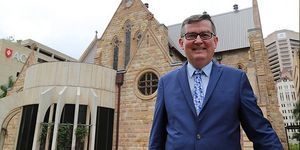
Extract from Mark Bowling, Catholic Leader, 9 January 2019
Newly-appointed Brisbane archdiocese chancellor Pat Mullins says more lay people should step up to take on Church roles. “It’s a good direction that the Church is going in, I think. It’s the way of the future,” he said. Uniquely qualified for the role of chancellor, Mr Mullins is believed to be Australia’s only canon lawyer simultaneously practising as a common lawyer. He becomes the first layman to hold the position in Brisbane, succeeding Fr Adrian Farrelly, chancellor for the past 10 years. As the Catholic Church in Australia moves towards the Plenary Council 2020, Mr Mullins said it was clear that lay people had a growing part to play in the operation of the Church and its mission. “Certainly the canon law provides that a lay person can have the office of chancellor,” he said. “It really plays into the spirit of the Second Vatican Council – the Decree on the Apostolate of the Laity – that lay people do have a part in the life of the Church and they certainly should do things that they are fit to do and qualified to do. “The numbers within the clergy are limited. They have to fulfil their pastoral roles in the parishes and so there are other roles in the administration of the Church that lay people can do and should do because we have to save the priests for their specific role in pastoral work.”....(more). Photo: Catholic Leader.

Behind the new integralism is the old intransigentism
Limited extract from Massimo Faggioli, subscription journal La Croix International, 9 January 2019
At the 1867 universal exposition in Paris, the Papal State chose to be represented by a catacomb. It was a time when the papacy, which had already lost the majority of the Papal State and would also lose Rome in 1870, was apocalyptic about the future of the Church in the modern world. At the same time, the Catholic laity were entering a new age of mobilization and engagement with that same world, with the encouragement of the Catholic hierarchy, which knew it had lost much of its direct influence on modern society. Today, during Pope Francis’s pontificate, we see something like the opposite situation: a pope who preaches “the joy of the Gospel” and has little time for nostalgia, and a rising cohort of Catholic intellectuals (a minority in the Church but especially active in the United States) who are looking forward to the 19th century. The debates in conservative and traditionalist circles in the English-speaking Church — and in the United States particularly — provide a stark contrast to this pontificate’s view of the relationship between the Church and the modern world. Some....(More). Photo: La Croix International.
Extract from Inda Bordoni, Vatican News, Melbourne Catholic, 9 January 2019
Pope Francis says that those who care for the sick and give of themselves with generosity and straightforward love – like St. Mother Teresa of Calcutta - are amongst the Church’s most credible evangelizers.
In his message for the World Day of the Sick, celebrated on 11 February, the Pope focused on Jesus’s words to the Apostles: “You received without payment; give without payment” (Mt 10:8). Just as life is a gift from God, he said, and cannot be reduced to a personal possession or private property, he said that “caring for the sick requires professionalism, tenderness, straightforward and simple gestures freely given, like a caress that makes others feel loved”. “Amid today’s culture of waste and indifference”, he said, “gift” is the category best suited to challenging today’s individualism and social fragmentation, while at the same time promoting new relationships and means of cooperation between peoples and cultures. “Gift” he explained is much more than simply giving presents: it involves the giving of oneself and entails the desire to build a relationship. “Gift is a reflection of God’s love, which culminates in the Incarnation of the Son and the outpouring of the Holy Spirit”, he said. The Pope also mentioned dialogue – the premise of gift – that, he said, creates possibilities for human growth and development capable of breaking through established ways of exercising power in society. Everyone needs care. Pointing out that each of us “is poor, needy and destitute” needing the care of our parents to survive when we are born and remaining in some way dependent on the help of others at every stage of life, Pope Francis said a frank acknowledgement of our limitations “keeps us humble and spurs us to practice solidarity as an essential virtue in life”. Urging believers to act responsibly to promote the good, he noted that “Only if we see ourselves, not as a world apart, but in a fraternal relationship with others, can we develop a social practice of solidarity aimed at the common good.” At the same time, he said, no one should be afraid to regard themselves as needy or reliant on others, because individually and by our own efforts we cannot overcome our limitations.....(More)
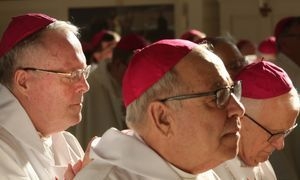
Extract from John Gehring, Commonweal, 7 January 2019
Confronting the most profound crisis the Catholic Church has faced in centuries, U.S. bishops are meeting for a week-long spiritual retreat at Mundelein Seminary outside of Chicago to grapple with how clergy sexual abuse and a culture of cover-up have damaged their moral credibility. Pope Francis came up with the idea, urging bishops to go on retreat when he met with a delegation from the U.S Conference of Catholic Bishops at the Vatican in September. In a sign of how important the pope considers this unusual gathering, he sent Fr. Raniero Cantalamessa, preacher of the papal household, to direct it. I’m not completely unsympathetic to those who argue we could use less prayer and more action from church leaders. Lay Catholics have every right to be angry and impatient with the episcopal malpractice, the sins, and the crimes committed by those who are supposed to be shepherds. I’ve also grown weary of the incompetence, the ugly scapegoating of gay priests, and the tone-deafness of bishops who seem to cast blame on everyone but themselves for the wreckage at their feet. But any authentic reform and renewal, whether personal or institutional, has to start with discernment, repentance, and conversion of heart. Dismantling a clerical culture that leads to abuse of power can’t simply be a technocratic endeavor, a managerial shuffling of the deck. In a lengthy letter he sent to the bishops on retreat, Pope Francis describes a “crisis of credibility,” calls for a “new ecclesial season,” and underscores core themes that have characterized his papacy since the beginning. A few days of prayer and reflection won’t save the church or magically change bishops, but we could do worse now than beseech the Holy Spirit to set the church on a better course. “Loss of credibility calls for a specific approach, since it cannot be regained by issuing stern decrees or by simply creating new committees or improving flow charts, as if we were in charge of a department of human resources,” Francis writes. “That kind of vision ends up reducing the mission of the bishop and that of the Church to a mere administrative or organizational function in the ‘evangelization business.’ Let us be clear: many of these things are necessary yet insufficient, since they cannot grasp and deal with reality in its complexity; ultimately, they risk reducing everything to an organizational problem.” This is quintessential Francis; during his first in-depth interview as pope in 2013, he made the same point to fellow Jesuit Fr. Antonio Spadaro: “The structural and organizational reforms are secondary—that is, they come afterward. The first reform must be the attitude. The ministers of the Gospel must be people who can warm the hearts of the people, who walk through the dark night with them, who know how to dialogue and to descend themselves into their people’s night, into the darkness, but without getting lost. The people of God want pastors, not clergy acting like bureaucrats or government officials.”....(more) Photo: Commonweal CNS Bob Roller
Extract from Brian Coyne. Pearls & Irritations, John Menadue website, 7 January 2019
Paul Collins’ recent commentary, “The Real Crisis of Australian Catholicism”, raises some contradictory challenges for the future of the Catholic Church in Australia. It is a massive contradiction that in so many ways the Catholic Church is in such a strong position – for example with the largest, most highly paid workforce it has ever had; with its physical infrastructure larger and possibly better maintained than it has ever been; financially it is probably in the best position it has been in its entire history in this nation – yet, at the parish participation level and regarding vocations, it is in a crisis situation. How do we explain and understand all this? My sense is that the positive things are the legacy of a range of fortuitous decisions made back in the 1960s and 70s that led to the eventual huge injection of taxpayer funds into the education system, and the health and social welfare systems. But there has been an accompanying crisis of leadership with the best leaders being either forced out or “seeing the writing on the wall” and leaving voluntarily. Even though the institution today has this massive workforce, they are also effectively gagged from providing effective leadership. Popes John Paul II and Benedict XVI have to shoulder a massive amount of the responsibility for this as they tried to impose a certain style on the institution with the sort of leaders they were selecting and promoting. It was just a futile dream that the vision and culture of Polish and Bavarian spirituality forged in the furnace of the totalitarian experiments of Communism and Nazism could be the “saviour” of Catholicism in the rest of the world. We have this deep culture in the Church that past popes cannot be criticised because that undermines the entire concept of the institution’s “infallibility” in the eyes of those Cardinal Ratzinger labelled the “little people” and “simple people” who need to be “protected from intellectuals” and thinking. Ninety percent of the adult population in this country who do not think of themselves as either “little” or “simple” have simply disappeared out the door. Getting them back to listening, and participating, is a task that will take centuries if it is possible at all. As the statistics for the exit from participation of young people show, even the brilliant and well-funded Catholic Education system we have in this country today is doing nothing to reverse the decline....(more)
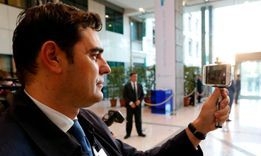
Extract from Charles Collins, Managing Editor, Cruxnow 4 January 2019
...When (Greg) Burke was appointed Lombardi’s deputy in 2015 (he took over the top spot when the Jesuit retired the next year), he was considered the best of both worlds. He had spent years covering Italy and the Vatican for Time and Fox, and since 2012, was the “senior communications advisor” for the Vatican’s Secretariat of State. (No one was quite sure what this position entailed. When asked, Burke usually responded, “Putting out fires.”). But Burke was not able to put out the fire caused by Pope Francis’s remarks accusing survivors of a Chilean abusive priest of “calumny” when they said a bishop had covered up for their molester. He also could do little to dampen the flames after Archbishop Carlo Maria Viganò accused Francis of “rehabilitating” disgraced ex-Cardinal Theodore McCarrick even though Benedict had placed restrictions on him after he was accused of sexual misconduct with seminarians. Like Lombardi before him, Burke often took the blame for not saying enough or saying the wrong thing as a crisis engulfed the Vatican. This laying the blame at the press office was usually unfair - the press officer answered to the Secretary of State, and for decades their go to response to scandal has been “no comment.” Press officers around the world will tell you how important it is for them to have access to the head honcho and to be part of the decision-making process. This has not been the case at the Vatican since Navarro-Valls’s relationship with John Paul II. Both Lombardi and Burke also had to deal with the unique problems posed by Francis, who loves to speak off-the-cuff on controversial subjects, and often does things without even telling his closest advisors, let alone the Vatican press office. Which is why (Alessandro) Gisotti’s appointment indicates a change in policy, and an effort to take the pressure of being “papal spokesman” from the Press Office.....(More) Photo: Cruxnow, CNS
Extract from Zita Ballinger Fletcher, Catholic News Service, 4 January 2019
German Cardinal Reinhard Marx of Munich and Freising called for change in long-standing church tradition as the German bishops’ conference prepares for a workshop debate to “review” the issue of celibacy for priests. In his homily at New Year’s Mass at the Cathedral of Our Lady in Munich, Marx said the church must, “in light of the failure” surrounding the clergy sex abuse crisis, modify tradition in response to changing modern times. “I believe the hour has come to deeply commit ourselves to open the way of the church to renewal and reform,” Marx said, according to a text of the homily posted on the archdiocesan website. “Evolution in society and historical demands have made tasks and urgent need for renewal clear to see.”....(more)

Extract from Heidi Schlumpf, National Catholic Reporter, 3 January 2019
In a strongly worded, eight-page letter to U.S. bishops, Pope Francis has rebuked the prelates not only for covering up sexual abuse but for unhealthy conflicts and divisions among themselves, which have "gravely" and "seriously" undercut the church's credibility. "God's faithful people and the Church's mission continue to suffer greatly as a result of abuses of power and conscience and sexual abuse, and the poor way that they were handled, as well as the pain of seeing an episcopate lacking in unity and concentrated more on pointing fingers than on seeking paths of reconciliation," the pope wrote. "Clearly, a living fabric has come undone, and we, like weavers, are called to repair it," Francis wrote to the bishops, who are gathered Jan. 2-8 for a week long retreat, which the pope had requested as part of the bishops' response to renewed attention on clergy sexual abuse. That repair will require humility and service to restore trust, not self-centeredness, competition or "concern with marketing or strategizing to reclaim lost prestige or to seek accolades," the pope wrote. Since last summer's revelations about alleged misconduct by then-Cardinal Theodore McCarrick and the subsequent Pennsylvania grand jury report, which detailed decades of alleged abuse by hundreds of priests, the country's bishops have failed to respond as a unified body, and debate in the church has degenerated into typical "culture war" fights. The pope, citing the words of Jesus to his bickering disciples, makes clear that he believes "it cannot be like that with you," instead calling for a "collegial spiritual fatherhood that does not offer banal responses or act defensively." "This approach demands of us the decision to abandon a modus operandi of disparaging, discrediting, playing the victim or the scold in our relationships, and instead to make room for the gentle breeze that the Gospel alone can offer," Francis wrote. "Let us try to break the vicious circle of recrimination, undercutting and discrediting, by avoiding gossip and slander in the pursuit of a path of prayerful and contrite acceptance of our limitations and sins, and the promotion of dialogue, discussion and discernment."....(more)
Greg Burke Resigns from the Holy See Press Office
Extract from Paul Moses, Commonweal, 2 January 2019
The abrupt resignation of Greg Burke as director of the Holy See Press Office is one more disturbing sign that the Vatican is not up to the task of responding to the Catholic Church’s crisis over clergy sexual abuse and its cover-up. Burke, a St. Louis native and an alumnus of the Columbia University Graduate School of Journalism, brought an American way of doing business to a press office that not so long ago closed for the day at 1 o’clock p.m. He helped build what became an impressive presence for the church on social media, adapt the media operation to a twenty-four-hour news cycle, and create a positive image for a new pope. But the veteran newsman could not push the Vatican bureaucracy into responding quickly and forthrightly to developments in the clergy sexual-abuse scandal, and this clearly frustrated him through much of his tenure as the press office’s director. In a New Year’s Eve tweet announcing that he and his deputy, the Spanish journalist Paloma Garcia Ovejero, were resigning effective January 1, Burke exited with an expression of affection for Pope Francis but not much else to say other than that the job had been “fascinating.” In a subsequent tweet, he apparently looked to dispel the notion that he was leaving because of personnel changes above his level in the Vatican communication dicastery, writing, “Just so you know, we had been praying about this decision for months, and we’re very much at peace with it. Grazie!” “Fascinating” is a gentlemanly usage to describe what it was like to be the public face for the Vatican bureaucracy’s agonizing, incomplete response to fast-breaking international news on the cover-up of clergy sexual abuse. As a former Rome correspondent for Time and Fox News, Burke knows as well as any media professional that it’s important to respond right away to such a damaging situation. Clearly, his hands were often tied....(more)

We do not know what kind of Church there will be after this abuse crisis, but we must assume that it will probably get worse before it gets better
Limited extract from Massimo Faggioli, United States, subscription journal La Croix International, (31 December 2018)
I am one of those Roman Catholics who had never heard or imagined that there were abusive priests sexually preying on children. Neither could I have imagined a clerical system that protected abusive priests rather than their victims; a system that perpetuated the suffering of those abused. Before moving to the United States in 2008, I spent more than 30 years of parish life in the mid-sized city of Ferrara in northern Italy. My Catholic experience there had been remarkably healthy and happy, despite the usual tensions with this or that particular priest or bishop. I started to become aware of the epidemic of sexual abuses committed by clergy only in 2002, thanks to the investigative reporting of the Boston Globe. Now as the parent of small children who attend a Catholic school in the Philadelphia area (one of the epicenters of the abuse crisis in the USA), I have been further educated about what happened and how to prevent it from happening again. The sex abuse crisis is the greatest scandal in modern Church history, and we do not know yet what kind of Church will survive this protracted moment of public shame. This crisis has understandably caused many to question whether they can stay in the Catholic Church. A number of Catholics known for engaging in public issues have written articles to explain why they remain. No question, it’s becoming harder to justify the reasons why. But despite the shock and disgust over the revelations of historic cases of abuse....(Source) First published 24 Sept. 2018, Photo La Croix International.
Extract from The Best of 2018: Paul Collins, Pearls & Irritations, John Menadue website, 2 January 2019
It is patently obvious that Australian Catholicism is in crisis. The usual analysis is that this has been caused by the appalling mishandling and cover-up of child sexual abuse and the subsequent investigations of the Royal Commission. However, this is only a partial explanation. Catholicism’s problems have a much longer history and go much deeper. They won’t be solved merely by the application of the recommendations of the Commission. A much more radical root and branch reform is needed. Yet, despite the abuse crisis, Catholicism is still enormously influential in Australia. In the 2016 census 22.6% of the population (totalling 5,291,834 people) self-reported as Catholic. The church employs more than 230,000 people, making it the biggest private employer in the country, bigger than Wesfarmers and bigger than all the banks put together. It is a major player in the educational, health, aged care and social service sectors. Since the 1830s and for much of our history, it was Catholicism and the other churches that provided the lion’s share of all these services Government aid and participation was virtually non-existent. Nowadays the Catholic Church maintains some fifty-two welfare organizations across a range of service provisions: homelessness, refugees, drug, alcohol, gambling, family violence, foster care, disability, counselling, overseas aid and employment. In 2016 the Saint Vincent de Paul Society had 20,736 members and 41,152 volunteers, making it the largest charity in the country providing an enormous range of services. Catholic schools educate some 765,000 students in 1731 primary and secondary schools, or 20.2% of all enrolments. It provides almost a quarter of health and aged care. The striking thing about all this is that church and state work closely together in the provision of services across all these sectors, with the government providing about seventy percent of funding for all the church’s ministries, except parishes and dioceses. This relationship is unique, with no real parallel anywhere in the world. But—and this introduces us to the heart of the Catholic crisis—this vast ministerial superstructure is based on increasingly weak ecclesial foundations. The simple fact is that the number of committed Catholics who do the bulk of the church’s work is contracting at an increasing rate. You see this in terms of affiliation with the church. Conscious affiliation, as reflected in the number of self-identifying Catholics in the census, is falling. From a high in 1996 when Catholics made up 27% of the population, in 2011 this had dropped to 25.3% and in 2016 to 22.6%, a drop of 4.4% in twenty years. You can dig a little deeper and take Mass attendance as a sign of more than nominal commitment. From the 1850s to the 1940s regular Mass attendance sat somewhere between twenty and thirty percent of all Catholics. Except for the immediate post Second World War period, when an extraordinary 75% of Catholics attended Mass on a weekly basis, affiliation has been steadily decreasing since the late-1960s, so that the 2016 figures show only about nine to ten percent of Catholics attend Mass regularly. Of these, 43% were born overseas and these new arrivals have saved Mass attendance figures from catastrophic decline. Even more worrying is the loss of young people: only 9% of fifteen to twenty-nine-year-olds are regular attendees.....(more)
Extract from Michael Hall, Digital Journalist, RadipoNZ,1 January 2019
A leading world expert on clerical child sex abuse told RNZ that if Te Rōpū Tautoko remained top-heavy with Church officials it would "only do the bidding of the bishops" and would have no credibility. Dr Peter Wilkinson, a former priest who acted as adviser to the Australian Royal Commission into Institutional Responses to Child Sexual Abuse, made his comments after the group was formed last month to provide a co-ordinated response to the commission from all its dioceses, religious orders and institutions in New Zealand. The seven-person Te Rōpū Tautoko body was announced by the Church hierarchy after the government extended the terms of reference of the Royal Commission's state abuse inquiry in November to include faith-based institutions. A similar group, the Truth Justice and Healing Council, was established by Australian bishops to do the same job in 2012, when the government across the Tasman announced its own abuse inquiry, which released its findings in December 2017. That 12-person group was made up three clergy and nine Catholic professionals, including a psychiatrist and a number of academics with expertise and understanding of trauma. It was chaired by former Supreme Court judge, the Hon Neville Owen. Its chief executive was Dr Francis Sullivan, former secretary general of the Australian Medical Association. In contrast, Te Rōpū Tautoko is made up of six Church officials, including heads of religious orders in which there have been accusations of covering up abuse, and just one layperson - chairwoman Catherine Fyfe, who specialises in human resources management. Dr Wilkinson said the Catholic Church now risked losing any credibility it had left if it decided to respond to the Royal Commission in a less-than-genuine manner. "One thing that the New Zealand hierarchy will have to understand, and quick, is that despite what they may think, they probably have already lost a great deal of their credibility," he said. "If they try to duck and cover, use the 'bad apples' defence, heap all the blame on their predecessors, insist that it is the media who are the cause of their troubles, or try to obfuscate, they will end up like the bishops here in Australia, who have lost all trust - from ordinary Catholics, from the general public, and from the politicians." He also warned of dire consequences if the bishops established a body to liaise with the commission that was top heavy with Church officials. "It will only do the bishops' bidding, it too will have no credibility," he said. "Whoever is appointed its CEO has to be a person of complete integrity, courageous, and capable to standing up to the bishops. "This person, and the members of the Council who support that person, must also be persons of courage and integrity."....(More). Photo: RadioNZ 20190101 Peter Wilkinson.